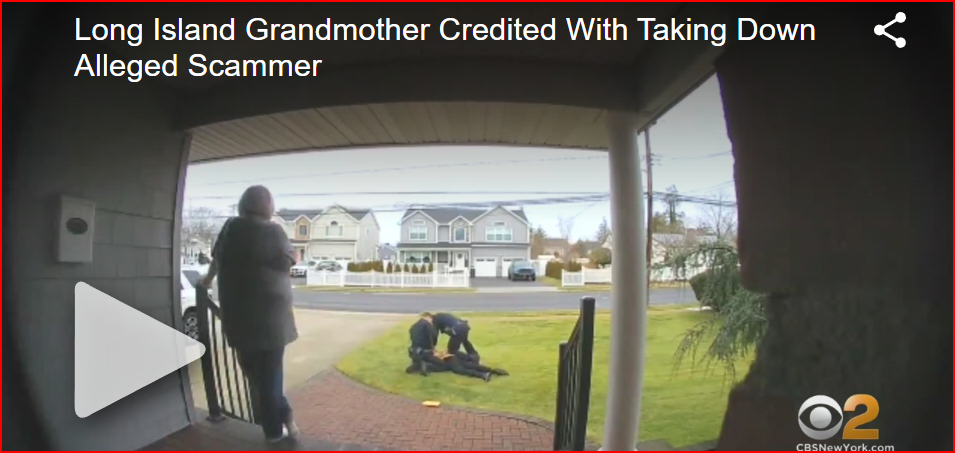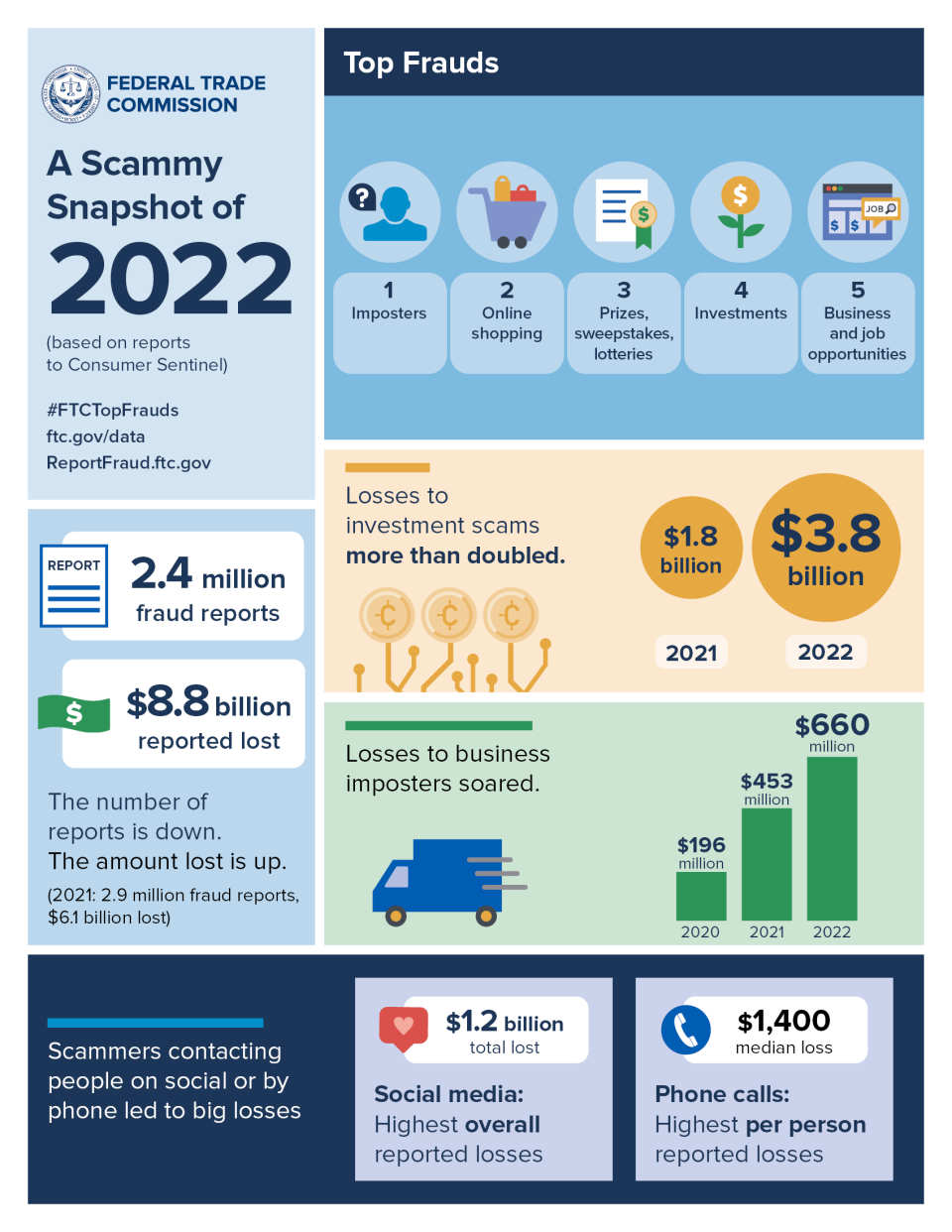09/15/2023
Identity Theft Scam
Leader of Identity Theft Conspiracy That Stole Nearly 50 Vehicles Sentenced to 8.5 Years in Prison

A Haverhill man was sentenced [on September 08, 2023] in federal court in Boston for orchestrating schemes to use the stolen identities of United States citizens from Puerto Rico to fraudulently purchase vehicles and other merchandise and apply for and utilize bank accounts and credit cards.
Together, the co-conspirators fraudulently purchased at least 47 vehicles from dealerships in Massachusetts, Pennsylvania, New York and New Jersey – obtaining over $2 million in cars and other merchandise using the stolen identities.
READ FULL PRESS RELEASE
Together, the co-conspirators fraudulently purchased at least 47 vehicles from dealerships in Massachusetts, Pennsylvania, New York and New Jersey – obtaining over $2 million in cars and other merchandise using the stolen identities.
READ FULL PRESS RELEASE
Dumb or dumber
Las Vegas rapper arrested after he allegedly ‘confessed’ to murder in music video
 Kenjuan McDaniel, 25, was charged with murder in a 2021 shooting.LVMPD
Kenjuan McDaniel, 25, was charged with murder in a 2021 shooting.LVMPD
A Nevada rapper was arrested on murder charges after implicating himself in a music video by sharing details of the crime that only a killer could have known, police said.
Kenjuan McDaniel, 25, was picked up on August 29 after police said lyrics in one of his recently posted music videos included details about a 2021 murder that had not been publicly released, Las Vegas Metropolitan Police said.
READ FULL ARTICLE WITH LYRICS
Kenjuan McDaniel, 25, was picked up on August 29 after police said lyrics in one of his recently posted music videos included details about a 2021 murder that had not been publicly released, Las Vegas Metropolitan Police said.
READ FULL ARTICLE WITH LYRICS
09/14/2023
Elder Scams Vishing
How Fraudsters Target Retirees With ‘Vishing’ Scams.

“Vishing’ is a double-layered scam. It could start with a phone call stating “your grandson is in trouble and needs money.” Then the caller asks for money.
“Vishing, also known as voice phishing,” [...]“is a growing threat in the world of cybercrime specifically targeting the elderly population. By impersonating fake charities to con senior citizens into donating money, posing as a relative, or pretending to be trusted places like government agencies - the scam banks on the fact that the elderly are more keen to trust phone interactions. As a result, divulging credit card details, social security numbers, login credentials, or other valuable data is likely to be shared.”
“Vishing, also known as voice phishing,” [...]“is a growing threat in the world of cybercrime specifically targeting the elderly population. By impersonating fake charities to con senior citizens into donating money, posing as a relative, or pretending to be trusted places like government agencies - the scam banks on the fact that the elderly are more keen to trust phone interactions. As a result, divulging credit card details, social security numbers, login credentials, or other valuable data is likely to be shared.”
- Take the initiative to verify the caller's identity by going directly to the company’s organization’s website.
- Never share financial or personal information over the phone. Legitimate organizations will never request information like credit card details, social security numbers, or passwords.
- Don’t be afraid to question the legitimacy of unknown numbers and be weary of providing sensitive information over the phone without confirming the legitimacy of the caller.
- Caller ID can easily be spoofed, so don’t trust it alone to determine whether the call is legitimate. I recommend staying vigilant and being cautious about sharing sensitive information.
- Send any unrecognized phone caller to voicemail so you’re able to screen the call. Don’t forget to report suspicious calls or suspected fraudulent activity to FTC at ReportFraud.ftc.gov
Pay your student loans — not scammers

You’ve probably heard the news — federal student loan repayments are starting again in October. But scammers might try and tell you they can help you avoid repayment, lower your payments, or get your loans forgiven — for a price. Here’s how to spot and avoid these scams.
The most important thing to know is this: the best source of information on your federal student loans is Federal Student Aid. Also, you don’t need to pay to sign up for any programs to lower your payments or get forgiveness — it’s all free at StudentAid.gov/repay. And you can do it yourself. (Again: for free.)
Worried about repaying your loans? The calls and texts that offer "help" might be tempting. But before you act, know how to spot the scams:
As you get ready for repayment, here are some steps to take:
The most important thing to know is this: the best source of information on your federal student loans is Federal Student Aid. Also, you don’t need to pay to sign up for any programs to lower your payments or get forgiveness — it’s all free at StudentAid.gov/repay. And you can do it yourself. (Again: for free.)
Worried about repaying your loans? The calls and texts that offer "help" might be tempting. But before you act, know how to spot the scams:
- Don’t give away your FSA ID login information. Anyone who says they need it to help you is a scammer. If you share it, the scammer can cut off contact between you and your servicer — and even steal your identity.
- Don’t trust anyone who contacts you promising debt relief or loan forgiveness, even if they say they're affiliated with the Department of Education. Scammers try to look real, with official-looking names, seals, and logos. They promise special access to repayment plans or forgiveness options — which don’t exist. If you’re tempted, slow down, hang up, and log into your student loan account to review your options.
As you get ready for repayment, here are some steps to take:
- Update your contact information with FSA and your loan servicers. This way, you’ll get timely updates about your repayment plans.
- Enroll in a repayment plan. Use FSA’s Loan Simulator to estimate your monthly payments and compare your repayment options. If you’ve defaulted on your loans, look into the Fresh Start program.
09/13/2023
Elder Fraud
Trustworthy no more: family, friends are often culprits in elder fraud
 Inage source: Article, Victim died in 2017,
Inage source: Article, Victim died in 2017,
Three out of four reported cases involve trusted individuals, say officials.
In 2011, 77-year-old Barbara McEneaney realized she needed more help. Suffering from Parkinson’s disease, the New Hampshire woman experienced memory loss and mobility issues. So, she added her brother, James Folley, as co-owner to her bank account. McEneaney had saved well, so she had more than enough in her life savings to pay the $4,000 monthly charges at an assisted living facility for a few decades.
Less than two years later, she was nearly penniless. The assisted living center facility agreed to reduce her monthly charge to avoid her having to leave. Authorities later found out who took McEneaney’s money—her brother and his wife….
READ MORE OF THIS STORY OF ABUSE
In 2011, 77-year-old Barbara McEneaney realized she needed more help. Suffering from Parkinson’s disease, the New Hampshire woman experienced memory loss and mobility issues. So, she added her brother, James Folley, as co-owner to her bank account. McEneaney had saved well, so she had more than enough in her life savings to pay the $4,000 monthly charges at an assisted living facility for a few decades.
Less than two years later, she was nearly penniless. The assisted living center facility agreed to reduce her monthly charge to avoid her having to leave. Authorities later found out who took McEneaney’s money—her brother and his wife….
READ MORE OF THIS STORY OF ABUSE
Scams

Job Scams
Scammers advertise jobs the same way honest employers do — online (in ads, on job sites, and social media), in newspapers, and sometimes on TV and radio. They promise you a job, but what they want is your money and your personal information.
Here are some examples of jobs scams and advice on how to avoid them.
Scammers advertise jobs the same way honest employers do — online (in ads, on job sites, and social media), in newspapers, and sometimes on TV and radio. They promise you a job, but what they want is your money and your personal information.
Here are some examples of jobs scams and advice on how to avoid them.
- Examples of Job Scams
- Work-from-home job scams
- Nanny, caregiver, and virtual personal assistant job scams
- Mystery shopper scams
- Job placement service scams
- Government and postal jobs scams
- How To Avoid a Job Scam
09/12/2023
Scams
All may not be lost for victims of computer scams who go on the offensive against banks and cards

When Willie Sutton, the notorious American bank robber, was asked why he stole from banks, his answer was very simple: “Because that’s where the money is.” Today scammers far outnumber bank robbers and, if they could ever be found, would likely include credit card companies along with banks for the same reason.
Banks and credit card companies are very much aware of these schemes. So, too, are law enforcement, federal and state regulatory agencies and the AARP, an association for older and retired people. They warn customers of scammers and many of their schemes on the net in articles and videos for that purpose.
Whatever is done or not done, no compensation will ultimately be offered. The bank or credit card company anticipates that the customer will give up and go away.
The customer should not go away. Compensation can very often be obtained if the bank or credit card company is confronted by a competent lawyer, one who is clearly prepared to file a suit and go to trial if necessary to subject the bank or credit card’s intransigence to public disclosure.
SOURCE
Banks and credit card companies are very much aware of these schemes. So, too, are law enforcement, federal and state regulatory agencies and the AARP, an association for older and retired people. They warn customers of scammers and many of their schemes on the net in articles and videos for that purpose.
Whatever is done or not done, no compensation will ultimately be offered. The bank or credit card company anticipates that the customer will give up and go away.
The customer should not go away. Compensation can very often be obtained if the bank or credit card company is confronted by a competent lawyer, one who is clearly prepared to file a suit and go to trial if necessary to subject the bank or credit card’s intransigence to public disclosure.
SOURCE
Debt Relief
BBB Warns of Debt Relief, Credit Repair Company Scams
 Image source: Article
Image source: Article
People seeking help from companies promising to reduce or eliminate debt or fix their credit scores are getting duped, and often are left financially worse off, according to a new report.
Judy Dollison, president of the Better Business Bureau of Central Ohio, said the rise in student loan, medical and credit card debt has increased demand for such services. The problem, she said, is not all companies are legitimate.
"BBB has had more than 12,000 complaints and negative reviews combined about credit and debit assistance companies," Dollison reported. "That just shows you that this is a problem."
The Better Business Bureau advised using a credit report service such as AnnualCreditReport.com, and calling the debt holders yourself to attempt to negotiate a lower payment or interest rate.
Dollison pointed out sketchy debt relief, debt consolidation and credit repair companies offer quick and extensive financial fixes and use high-pressure tactics to get consumers to quickly pay upfront fees.
"What we find is, if it sounds too good to be true, it usually is," Dollison explained. "Credit and debit repair actually take months, if not years, to solve." ...
READ MORE FROM THE SOURCE
Judy Dollison, president of the Better Business Bureau of Central Ohio, said the rise in student loan, medical and credit card debt has increased demand for such services. The problem, she said, is not all companies are legitimate.
"BBB has had more than 12,000 complaints and negative reviews combined about credit and debit assistance companies," Dollison reported. "That just shows you that this is a problem."
The Better Business Bureau advised using a credit report service such as AnnualCreditReport.com, and calling the debt holders yourself to attempt to negotiate a lower payment or interest rate.
Dollison pointed out sketchy debt relief, debt consolidation and credit repair companies offer quick and extensive financial fixes and use high-pressure tactics to get consumers to quickly pay upfront fees.
"What we find is, if it sounds too good to be true, it usually is," Dollison explained. "Credit and debit repair actually take months, if not years, to solve." ...
READ MORE FROM THE SOURCE
09/11/2023
Elder Fraud
Protecting yourself from cybercrimes

Unfortunately, cybercrimes against seniors continue to be a big problem in the U.S. According to the FBI 2022 Elder Fraud Report, cybercrime cost Americans over age 60 more than $3 billion last year, a whopping 84 percent increase from 2021.
While anyone can be subject to cybercrimes, seniors are frequent targets because they tend to be more trusting and have more money than their younger counterparts. But there are a number of things you can do to protect yourself from online fraud, hacking and scams. Here are a few tips to get you started.
While anyone can be subject to cybercrimes, seniors are frequent targets because they tend to be more trusting and have more money than their younger counterparts. But there are a number of things you can do to protect yourself from online fraud, hacking and scams. Here are a few tips to get you started.
- Strengthen your passwords.
- Opt out of pop-ups.
- When in doubt, throw it out.
- Share with care.
- Verify websites.
- Have some back-up.
09/10/2023
Home Repair Fraud
Police arrest woman for alleged home repair fraud

A woman was hired and paid for home repair work but was arrested for allegedly never completing the job.
Tupelo [Mississippi] police received a report of a home repair fraud back in August.
Investigators said the homeowner hired Stephanie Williford (pictured) for interior design work.
Williford allegedly did not complete all the work agreed upon in the transaction.
Officers arrested Williford and charged her with two counts of grand larceny and two counts of false pretense. Her bond has been set at $20,000.
SOURCE
Tupelo [Mississippi] police received a report of a home repair fraud back in August.
Investigators said the homeowner hired Stephanie Williford (pictured) for interior design work.
Williford allegedly did not complete all the work agreed upon in the transaction.
Officers arrested Williford and charged her with two counts of grand larceny and two counts of false pretense. Her bond has been set at $20,000.
SOURCE
Scam payback
Scammer Payback U-Tube Video Only

09/09/2023
FinCEN Scam Notice - Pig Butchering
Financial Crimes Information Network Issues Alert on Prevalent Virtual Currency Investment Scam Commonly Known as “Pig Butchering”

“Pig butchering” scams resemble the practice of fattening a hog before slaughter. Victims invest in supposedly legitimate virtual currency investment opportunities before they are conned out of their money.
Scammers refer to victims as “pigs,” and may leverage fictitious identities, the guise of potential relationships, and elaborate storylines to “fatten up” the victim into believing they are in trusted partnerships before they defraud the victims of their assets—the “butchering.”
These scams are largely perpetrated by criminal enterprises based in Southeast Asia who use victims of labor trafficking to conduct outreach to millions of unsuspecting individuals around the world.
READ MORE
Scammers refer to victims as “pigs,” and may leverage fictitious identities, the guise of potential relationships, and elaborate storylines to “fatten up” the victim into believing they are in trusted partnerships before they defraud the victims of their assets—the “butchering.”
These scams are largely perpetrated by criminal enterprises based in Southeast Asia who use victims of labor trafficking to conduct outreach to millions of unsuspecting individuals around the world.
READ MORE
09/07/2023
Elder Fraud
Investor swindles elderly woman out of her home. A judge returns it to her

An 80-year-old woman has regained ownership of her Long Beach home following a civil trial where jurors found a real estate investor was guilty of elder abuse and fraud.
“It’s a big relief,” said Suzanne Yorganson after learning the home was once again hers. “I bought it in 1979 and I lived there off and on with my family and it means a lot to me.”
In addition, the jury decided that the real estate investor, 70-year-old Ken Lamphear, must pay $3 million in punitive damages to Yorganson, along with $2.5 million in compensation for economic damages, Yorganson’s attorney, Bill Chapman said.
The decision Tuesday [09/06/2023] comes after more than a yearlong legal battle where Yorganson’s attorneys argued Lamphear not only took advantage of her while she was in a vulnerable state following a stroke, but that Lamphear didn’t fulfill any of the promises he made, including paying Yorganson the agreed-upon $300,000.
READ THE WHOLE STORY
“It’s a big relief,” said Suzanne Yorganson after learning the home was once again hers. “I bought it in 1979 and I lived there off and on with my family and it means a lot to me.”
In addition, the jury decided that the real estate investor, 70-year-old Ken Lamphear, must pay $3 million in punitive damages to Yorganson, along with $2.5 million in compensation for economic damages, Yorganson’s attorney, Bill Chapman said.
The decision Tuesday [09/06/2023] comes after more than a yearlong legal battle where Yorganson’s attorneys argued Lamphear not only took advantage of her while she was in a vulnerable state following a stroke, but that Lamphear didn’t fulfill any of the promises he made, including paying Yorganson the agreed-upon $300,000.
READ THE WHOLE STORY
09/06/2023
Dark Web AI Fraud
Criminal enterprise flaunts AI in creepy 'fraud-for-hire' commercial meant for dark web

A criminologist recently unearthed a video of a multibillion-dollar, transnational criminal organization that has been stealing from the U.S. government since the pandemic and selling generative artificial intelligence tools to other criminals, an expert says
The 58-second clip, which was meant for the dark web, opens with a person – who goes by "Sanchez" – covered head to toe in black clothing and speaking behind a black skeleton mask with someone else who appears to be digging a grave behind him.
"Yes, I sell Chase bank accounts. Yes, I am one of the first people to sell fake bank accounts four years ago," the man who calls himself "Sanchez" said. "We started with my partner four years ago. Now we are about 30 people in one office."
READ THE FULL ARTICLE
The 58-second clip, which was meant for the dark web, opens with a person – who goes by "Sanchez" – covered head to toe in black clothing and speaking behind a black skeleton mask with someone else who appears to be digging a grave behind him.
"Yes, I sell Chase bank accounts. Yes, I am one of the first people to sell fake bank accounts four years ago," the man who calls himself "Sanchez" said. "We started with my partner four years ago. Now we are about 30 people in one office."
READ THE FULL ARTICLE
09/05/2023
Cybercrime
Protect Yourself from Cybercrimes

How Seniors Can Protect Themselves from Cybercrimes
Cybercrimes against seniors continue to be a big problem in the U.S. According to the FBI 2022 Elder Fraud Report, cybercrime cost Americans over age 60 more than $3 billion last year, a whopping 84 percent increase from 2021.
While anyone can be subject to cybercrimes, seniors are frequent targets because they tend to be more trusting and have more money than their younger counterparts. But there are a number of things you can do to protect yourself from online fraud, hacking and scams. Here are a few tips to get you started:
Cybercrimes against seniors continue to be a big problem in the U.S. According to the FBI 2022 Elder Fraud Report, cybercrime cost Americans over age 60 more than $3 billion last year, a whopping 84 percent increase from 2021.
While anyone can be subject to cybercrimes, seniors are frequent targets because they tend to be more trusting and have more money than their younger counterparts. But there are a number of things you can do to protect yourself from online fraud, hacking and scams. Here are a few tips to get you started:
- Strengthen your passwords.
- On your smartphone or tablet, be sure to set up a four or six-digit PIN to protect your device. A strong password should contain at least 12 characters and include numbers and a special character.
- Opt out of pop-ups. To protect yourself from computer viruses and other forms of malware, make it a habit to avoid any pop-up style message when you’re on the web.
- When in doubt, throw it out. Sometimes online hackers will send you an email or text message and pretend to be someone they’re not to convince you to share valuable information with them, such as your Social Security Number, address or credit card information.
- If you receive a message from an unknown sender, do not respond or click on any links or attachments.
- Share with care. There is such a thing as oversharing, and it definitely applies to online profiles. On social media platforms like Facebook, Instagram and Twitter, online hackers can easily gather information about you from what you post, like where you live.
- Ensure that your privacy settings are up to date.
- Verify websites. Before you shop or access your bank online, double check the validity of the website you’re using.
- Have some back-up.
09/04/2023
Elder Fraud
How to prevent caregiver fraud

Family caregivers might need to hire assistance while caring for a loved one. Finding in-home care can be a complicated journey especially when you consider the older adult’s safety. AARP recently released an article that highlighted tips for protecting older adults from caregiver fraud.
- Secure valuables, cash, and cards
- Be present.
- Use technology.
- Monitor transactions.
- Watch for warning signs.
Elder Abuse
Police arrest two for string of pickpocket thefts in Burbank

Los Angeles residents Oscar Perdomo Flores, 48, and Maria Perdomo, 56, were arrested on Tuesday on suspicion of grand theft, fraud, and elder abuse after they were connected to a string of thefts targeting elderly people at stores.
"The suspects targeted elderly retail shoppers, stealing their wallets in distraction style thefts," Burbank police said in a statement earlier in August, when they asked the public for help in identifying the thieves. "Detectives have noted a common pattern among thieves who are targeting shoppers carrying purses or bags while shopping at local retailers. In these instances, multiple suspects will work together to distract the victim by talking to them or brushing up against them while pretending to shop for goods."
It's then that the other suspects reach into the bag or unattended purse and take the victim's wallet, police said.
READ MORE
"The suspects targeted elderly retail shoppers, stealing their wallets in distraction style thefts," Burbank police said in a statement earlier in August, when they asked the public for help in identifying the thieves. "Detectives have noted a common pattern among thieves who are targeting shoppers carrying purses or bags while shopping at local retailers. In these instances, multiple suspects will work together to distract the victim by talking to them or brushing up against them while pretending to shop for goods."
It's then that the other suspects reach into the bag or unattended purse and take the victim's wallet, police said.
READ MORE
09/03/2023
Deepfake Scams - AI
Deepfake Scams Are Becoming So Sophisticated, They Could Start Impersonating Your Boss and Coworkers

Cybercriminals exploit AI voice and video tech for convincing scams, with concerns growing on their potential to mimic real-life executives.
Cybercriminals are leveraging AI-driven voice simulation and deepfake video technology to deceive individuals and organizations, Bloomberg reported. In a recent incident, a CEO transferred $249,000 in funds after receiving a call that sounded like it came from a trusted source, only to discover it was generated by AI.
READ MORE
Cybercriminals are leveraging AI-driven voice simulation and deepfake video technology to deceive individuals and organizations, Bloomberg reported. In a recent incident, a CEO transferred $249,000 in funds after receiving a call that sounded like it came from a trusted source, only to discover it was generated by AI.
READ MORE
Elder Scam - Investment
See Your Name in Lights! Latest Scam Makes Elder Investors Think They’ll Be Hollywood Producers.
 Photo from article
Photo from article
For countless older Americans, the idea of being on the silver screen has some magic. Even in the streaming age, the thought of being a Hollywood producer has some appeal.
Fraud against older Americans in investment schemes, reports the FBI, accounted for nearly one-third of the $3.1 billion in elder financial exploitation nationwide last year, up from less than 10% three years ago. Reported losses from elder investment scams have jumped tenfold in the past three years, to nearly $1 billion in 2022.
READ MORE
Fraud against older Americans in investment schemes, reports the FBI, accounted for nearly one-third of the $3.1 billion in elder financial exploitation nationwide last year, up from less than 10% three years ago. Reported losses from elder investment scams have jumped tenfold in the past three years, to nearly $1 billion in 2022.
READ MORE
09/01/2023
Elder Fraud
Indictments by a federal grand jury for charges of conspiracy to commit wire fraud exceeding $1.5 million involving US elders.

Three residents of Panama have been indicted by a federal grand jury in Pittsburgh, PA, on charges of conspiracy to commit wire fraud and conspiracy to commit money laundering.
The charges stem from the Department of Justice’s wide-ranging efforts to protect older adults from fraud and financial exploitation.
Stefano Zanetti, a 41-year-old citizen of Canada; Samuel David Ferrer Avila, a 22-year-old citizen of Venezuela; and Cesar Javier Chourio Morante, a 27-year-old citizen of Venezuela and Colombia, were named as defendants in separate two-count Indictments.
“Our office is committed to protecting elderly and other vulnerable victims from fraud schemes targeting residents of Western Pennsylvania,” said U.S. Attorney Olshan. “This case demonstrates that we will use all available tools to identify and hold accountable those who steal from seniors, and we will work with our domestic and international partners to seek justice even when the evidence leads to perpetrators operating outside the United States. We encourage people to make use of the Department of Justice’s online resources to learn about these common fraud schemes and avoid falling prey to them.”
“International financial fraud investigations are at the core of HSI’s mission. As such, we take great pride in protecting our seniors who are among our most vulnerable and valuable citizens,” said Special Agent in Charge of HSI Philadelphia William S. Walker. “HSI will utilize every resource, both here and abroad, to ensure that the American public is kept safe from those that hide in foreign countries while attempting to defraud our citizens.”
As alleged in the Indictments, the defendants orchestrated and executed a sophisticated nationwide scheme to defraud that targeted the elderly and caused losses exceeding $1,500,000raud and conspiracy to commit money laundering involving US elders.
READ THE FULL STORY
The charges stem from the Department of Justice’s wide-ranging efforts to protect older adults from fraud and financial exploitation.
Stefano Zanetti, a 41-year-old citizen of Canada; Samuel David Ferrer Avila, a 22-year-old citizen of Venezuela; and Cesar Javier Chourio Morante, a 27-year-old citizen of Venezuela and Colombia, were named as defendants in separate two-count Indictments.
“Our office is committed to protecting elderly and other vulnerable victims from fraud schemes targeting residents of Western Pennsylvania,” said U.S. Attorney Olshan. “This case demonstrates that we will use all available tools to identify and hold accountable those who steal from seniors, and we will work with our domestic and international partners to seek justice even when the evidence leads to perpetrators operating outside the United States. We encourage people to make use of the Department of Justice’s online resources to learn about these common fraud schemes and avoid falling prey to them.”
“International financial fraud investigations are at the core of HSI’s mission. As such, we take great pride in protecting our seniors who are among our most vulnerable and valuable citizens,” said Special Agent in Charge of HSI Philadelphia William S. Walker. “HSI will utilize every resource, both here and abroad, to ensure that the American public is kept safe from those that hide in foreign countries while attempting to defraud our citizens.”
As alleged in the Indictments, the defendants orchestrated and executed a sophisticated nationwide scheme to defraud that targeted the elderly and caused losses exceeding $1,500,000raud and conspiracy to commit money laundering involving US elders.
READ THE FULL STORY
Weather related scams
Have you, or do you know someone who was affected by Hurricane Idalia?

Protect yourself against disaster-related scams.
Figuring out the full extent of Hurricane Idalia’s damage could take weeks or even months. But we already know that scammers will follow the path of the storm and try to take advantage of people doing their best to recover. While storms are unpredictable, there are ways to spot the tactics these scammers use — even if they change some of the details — so, read on.
As you focus on cleaning up, rebuilding, and getting back on track, learn more about disaster recovery scams. It’ll help you protect yourself and others affected by Hurricane Idalia. Here are a few ways to get started:
Figuring out the full extent of Hurricane Idalia’s damage could take weeks or even months. But we already know that scammers will follow the path of the storm and try to take advantage of people doing their best to recover. While storms are unpredictable, there are ways to spot the tactics these scammers use — even if they change some of the details — so, read on.
As you focus on cleaning up, rebuilding, and getting back on track, learn more about disaster recovery scams. It’ll help you protect yourself and others affected by Hurricane Idalia. Here are a few ways to get started:
- Follow the latest official updates on Hurricane Idalia at usa.gov/hurricane-idalia.
- Know scammers impersonate government officials, safety inspectors, utility workers, and others in the aftermath of a disaster. They might ask for money or personal information like your Social Security or account numbers. Don’t pay; and remember that nobody legit will contact you unexpectedly to ask for your Social Security, bank account, or credit card number.
- Never pay for government assistance. Anyone who asks you for money to get a FEMA application or help is a scammer. Walk away and report them. To get alerts and more information, download the FEMA Mobile App.
- Spot scams by how they ask you to pay. Scammers will often demand you pay in a way they can get your money quickly — by wiring money, putting money on a gift card, sending cryptocurrency, using a payment app, or sending cash. If someone you don’t know says you have to pay that way, it’s a scam.
- Share what you know to help others stay alert to disaster-related scams you’re familiar with. Talk to friends and family and encourage them to learn more. Share this blog and other resources at ftc.gov/WeatherEmergencies with your social media followers.
08/31/2023
Financial Fraud
More Than 30% of Americans Have Been Victims of These 7 Financial Fraud Schemes: Here’s how To Protect Yourself

Have you ever lost money due to financial fraud? In August 2023, GO BankingRates surveyed 1,141 Americans to find out if respondents had been the victims of financial fraud. Those surveyed were given several options to show which types of financial fraud they faced.
Here's how the seven common forms of financial fraud have impacted Americans and tips for how to protect yourself.
Which Types of Financial Fraud Have Americans Experienced?
From highest to lowest percentage, Americans surveyed who have been victims of financial fraud said they have experienced the following schemes.
Here's how the seven common forms of financial fraud have impacted Americans and tips for how to protect yourself.
Which Types of Financial Fraud Have Americans Experienced?
From highest to lowest percentage, Americans surveyed who have been victims of financial fraud said they have experienced the following schemes.
- Consumer fraud: 39%
- Check fraud: 38%
- Mail fraud: 22%
- Business fraud: 17%
- Investment fraud: 14%
- Charity and disaster fraud: 6%
- Elder fraud: 5%
- How Can You Protect Yourself From Financial Fraud Schemes?
- Be Skeptical
- Don’t Give Out Your Personal or Financial Information
- Don’t Feel Pressured To Act Immediately
- Conduct Due Diligence
- Report It
Elder Fraud
Nigerian National Sentenced to Prison for International Scheme That Defrauded Elderly U.S. Victims

A dual U.K.-Nigerian national who was extradited to the United States from the United Kingdom was sentenced to 90 months in prison for his role in a transnational inheritance fraud scheme. With today’s sentencing, all three defendants who were extradited from the United Kingdom in connection with this matter have been sentenced.
According to court documents, Iheanyichukwu Jonathan Abraham, 44, was part of a group of fraudsters that sent personalized letters to elderly victims in the United States, falsely claiming that the sender was a representative of a bank in Spain and that the recipient was entitled to receive a multi-million-dollar inheritance left for the recipient by a family member who had died years before in Portugal. Victims were told that before they could receive their purported inheritance, they were required to send money for delivery fees and taxes and were instructed to make other payments. Victims sent money to the defendants through a complex web of U.S.-based former victims. Abraham and his co-conspirators also convinced former victims to receive money from new victims and then forward the fraud proceeds to others.
The other two defendants who were extradited from the United Kingdom also received prison sentences. On June 21, the Honorable Kathleen M. Williams sentenced Emmanuel Samuel to 82 months in prison, and on July 25, Judge Williams sentenced Jerry Chucks Ozor to 87 months in prison for their roles in the scheme. Two other co-defendants, who were extradited to the United States from Spain, have also pleaded guilty and are scheduled to be sentenced in October and November. ...
READ MORE
According to court documents, Iheanyichukwu Jonathan Abraham, 44, was part of a group of fraudsters that sent personalized letters to elderly victims in the United States, falsely claiming that the sender was a representative of a bank in Spain and that the recipient was entitled to receive a multi-million-dollar inheritance left for the recipient by a family member who had died years before in Portugal. Victims were told that before they could receive their purported inheritance, they were required to send money for delivery fees and taxes and were instructed to make other payments. Victims sent money to the defendants through a complex web of U.S.-based former victims. Abraham and his co-conspirators also convinced former victims to receive money from new victims and then forward the fraud proceeds to others.
The other two defendants who were extradited from the United Kingdom also received prison sentences. On June 21, the Honorable Kathleen M. Williams sentenced Emmanuel Samuel to 82 months in prison, and on July 25, Judge Williams sentenced Jerry Chucks Ozor to 87 months in prison for their roles in the scheme. Two other co-defendants, who were extradited to the United States from Spain, have also pleaded guilty and are scheduled to be sentenced in October and November. ...
READ MORE
08/30/2023
Fraud
Scammer sentenced to 2 years for making fake accounts and using stolen credit cards to buy football game tickets

COLLEGE STATION, Texas – A 48-year-old California man was sentenced to two years in prison after pleading guilty to a nationwide ticket scam that included a Texas A&M football game, the United States Department of Justice said.
U.S. Attorney Alamdar S. Hamdani said Derrick Langford admitted he used emails to obtain stolen credit card information from victims across the United States. He used that data and false identities to buy tickets for sporting events, concerts, and other entertainment venues across the country. He then re-sold the tickets on resale sites like Ticket Liquidator, the DOJ said.
As the scheme continued, investigators said Langford received stolen credit card information and personal identifying information of more than 75 victims in one of his email accounts....
READ THE FULL STORY
U.S. Attorney Alamdar S. Hamdani said Derrick Langford admitted he used emails to obtain stolen credit card information from victims across the United States. He used that data and false identities to buy tickets for sporting events, concerts, and other entertainment venues across the country. He then re-sold the tickets on resale sites like Ticket Liquidator, the DOJ said.
As the scheme continued, investigators said Langford received stolen credit card information and personal identifying information of more than 75 victims in one of his email accounts....
READ THE FULL STORY
Elder Fraud
Tips to avoid financial scams targeting the elderly

Recognizing common signs of a scam could help you avoid one.
Senior citizens are often the targets of these scams because they usually have assets, regular income and may be especially vulnerable due to isolation, cognitive decline, physical disability, health problems or bereavement.
Bankers are often the first to recognize signs of fraud or financial scams. They are trained to ask customers pointed questions when they suspect a case of elder financial abuse.
A change in banking patterns is one of the biggest red flags of a money scam. Bank tellers may ask specific questions when a customer suddenly makes a large cash withdrawal or wire transfer.
Unlike large check deposits, banks cannot put a hold on cash transactions. However, they can talk with customers to help them avoid becoming a victim.
To protect yourself, the Federal Trade Commission recommends resisting the pressure to act immediately.
“Always get a second opinion and check on it first before you send any money,” Nofziger said.
SOURCE
Senior citizens are often the targets of these scams because they usually have assets, regular income and may be especially vulnerable due to isolation, cognitive decline, physical disability, health problems or bereavement.
Bankers are often the first to recognize signs of fraud or financial scams. They are trained to ask customers pointed questions when they suspect a case of elder financial abuse.
A change in banking patterns is one of the biggest red flags of a money scam. Bank tellers may ask specific questions when a customer suddenly makes a large cash withdrawal or wire transfer.
Unlike large check deposits, banks cannot put a hold on cash transactions. However, they can talk with customers to help them avoid becoming a victim.
To protect yourself, the Federal Trade Commission recommends resisting the pressure to act immediately.
“Always get a second opinion and check on it first before you send any money,” Nofziger said.
SOURCE
08/29/2023
Elder Fraud
Contractor indicted on multiple fraud and theft charges for uncompleted projects
 David A. Smith
David A. Smith
A grand jury has indicted a Walker County, Alabama contractor on 27 counts including financial exploitation of the elderly, theft of property, and home repair fraud.
David Alan Smith is accused of taking thousands of dollars for home projects and never completing them. Smith was arrested over the weekend and booked into the Walker County Jail where he is being held on a $270,000 cash bond.
READ MORE
David Alan Smith is accused of taking thousands of dollars for home projects and never completing them. Smith was arrested over the weekend and booked into the Walker County Jail where he is being held on a $270,000 cash bond.
READ MORE
08/27/2023
Elder Fraud
Scammers target Santa Clara County seniors

‘It is devastating’: Scammers target Santa Clara County (CA) seniors.
Sharon Sweeney was driving back from Home Depot when she received a call from an unknown number that would eventually end in costly consequences.
The caller introduced himself as Robert. He was the first of multiple people Sweeney, 77, talked to that day who posed as government agents. They created a collection of falsified documents and claims to scare her, Sweeney said, and even convinced her to sign a fake nondisclosure agreement to steer her away from telling any family, friends, or the authorities. The scammers had her on the line for hours.
Under their direction, Sweeney withdrew $20,000 from her bank account that she sent to the scammers via Bitcoin, digital currency that is difficult to track—her money gone forever.
“It (was) mind control,” Sweeney told San José Spotlight. “It leaves you feeling terribly vulnerable (and) constantly asking questions of yourself. Why didn’t I see the red flags?”
Cherie Bourlard, deputy district attorney for Santa Clara County, said older adults are targeted by scammers because they might have significant savings, valuable possessions or a lot of equity in their homes. She said they are also more prone to scams since they may not be as readily tech-savvy, are more trusting or may have physical or cognitive impairment.
“Financial elder abuse is hideous, because when elders are targeted, they are less resilient to recover financially,” Bourlard told San José Spotlight. “It is devastating because it occurs in their golden years.”
READ MORE
Sharon Sweeney was driving back from Home Depot when she received a call from an unknown number that would eventually end in costly consequences.
The caller introduced himself as Robert. He was the first of multiple people Sweeney, 77, talked to that day who posed as government agents. They created a collection of falsified documents and claims to scare her, Sweeney said, and even convinced her to sign a fake nondisclosure agreement to steer her away from telling any family, friends, or the authorities. The scammers had her on the line for hours.
Under their direction, Sweeney withdrew $20,000 from her bank account that she sent to the scammers via Bitcoin, digital currency that is difficult to track—her money gone forever.
“It (was) mind control,” Sweeney told San José Spotlight. “It leaves you feeling terribly vulnerable (and) constantly asking questions of yourself. Why didn’t I see the red flags?”
Cherie Bourlard, deputy district attorney for Santa Clara County, said older adults are targeted by scammers because they might have significant savings, valuable possessions or a lot of equity in their homes. She said they are also more prone to scams since they may not be as readily tech-savvy, are more trusting or may have physical or cognitive impairment.
“Financial elder abuse is hideous, because when elders are targeted, they are less resilient to recover financially,” Bourlard told San José Spotlight. “It is devastating because it occurs in their golden years.”
READ MORE
Dumb crook
Home invasion suspect drinks gasoline as police confront him.
 Image Source: Article
Image Source: Article
A man police said was caught in the act of a home invasion began drinking gasoline when confronted by Seattle Police officers.
Seattle Police said the 40-year-old holding a wooden stick entered a residence last week while a 17-year-old female was at home. The girl's father called the police.
READ THE FULL STORY
Seattle Police said the 40-year-old holding a wooden stick entered a residence last week while a 17-year-old female was at home. The girl's father called the police.
READ THE FULL STORY
08/26/2023
Romance Scams Crypto
Romance Scammers Are Wooing Victims into Bogus Crypto Schemes
 Getty Images/AARP Article
Getty Images/AARP Article
Are you hoping for true love? And more money than you ever imagined?
Who isn’t?
That’s why an unconscionable cadre of criminals dangle these twin temptations — the promise of romance and vast wealth — in what can be an emotionally and financially devastating double-barreled scam. The deception starts out as romance fraud and transforms into a cryptocurrency investment fraud in which victims have lost millions of dollars.
READ MORE
Who isn’t?
That’s why an unconscionable cadre of criminals dangle these twin temptations — the promise of romance and vast wealth — in what can be an emotionally and financially devastating double-barreled scam. The deception starts out as romance fraud and transforms into a cryptocurrency investment fraud in which victims have lost millions of dollars.
READ MORE
08/25/2023
Elder Scams
Jury finds 80-year-old veteran not guilty of trying to smuggle meth through DFW Airport
A jury has found 80-year-old Vietnam veteran Roy Payne not guilty of trying to smuggle drugs through DFW Airport earlier this year. Payne was acquitted despite the fact that he had seven pounds of methamphetamine hidden in his luggage while going through customs.
Federal prosecutors charged him even though he was actually a victim of a financial scam that sent him to Mexico thinking he had won an international lottery.
He was given a bag with meth hidden inside the bag and was told it was bank records that he needed to take back and pick up his winnings.
"There's a lot of people who come out and scam anyone and everyone. But it's our elderly who fall for this kind of stuff. But the government decided...instead of being a victim, they try him like he's some kind of criminal. Unfortunately, this had to go through the court."
SOURCE
Federal prosecutors charged him even though he was actually a victim of a financial scam that sent him to Mexico thinking he had won an international lottery.
He was given a bag with meth hidden inside the bag and was told it was bank records that he needed to take back and pick up his winnings.
"There's a lot of people who come out and scam anyone and everyone. But it's our elderly who fall for this kind of stuff. But the government decided...instead of being a victim, they try him like he's some kind of criminal. Unfortunately, this had to go through the court."
SOURCE
08/24/2023
Fraud Prevention: AARP
Scams the IRS Wants you to Know About

Criminals use a lot of different tactics to steal money from consumers, and one of those tactics is the promise of "free money". This summer the Internal Revenue Service (IRS) is warning taxpayers to be on the lookout for several scams that try to mislead people into believing the IRS owes them.
More from the AARP Fraud Watch Network
Learn How to Prevent IRS Impostor Scams.
Knowledge gives you power over scams. The AARP Fraud Watch Network equips you with reliable, up-to-date insights and connects you to our free fraud helpline so you can better protect yourself and your loved ones. We also advocate at the state, federal and local levels to enact policy changes that protect consumers and enforce laws.
And one more thing…
We (AARP) launched AARP VOA ReST, a free program that provides emotional support for people affected by a scam or fraud. ReST sessions are online, hour-long, confidential small groups led by trained peer facilitators. Experiencing a scam can be devastating, but it doesn't have to define you. Interested? Visit www.aarp.org/fraudsupport to learn more.
When it comes to fraud, vigilance is our number one weapon. You have the power to protect yourself and your loved ones from scams. Please share this alert with friends and family and visit the Fraud Watch Network for more information.
More from the AARP Fraud Watch Network
Learn How to Prevent IRS Impostor Scams.
- Learn More About Tax ID Scams.
- Do you think you have been targeted or have fallen victim to a scam? Contact the AARP Fraud Watch Network Helpline. Call 877-908-3360.
- You may receive a cardboard envelope from a delivery service. The enclosed letter includes the IRS masthead and the wording that the notice is "in relation to your unclaimed refund."
- The fake letter contains false contact details and asks for personal and financial information, such as a detailed photo of your driver's license.
- You might also receive an email reminding you to claim your Employee Retention Credit or your "stimulus."
- These emails often lead to a company that offers to search for unclaimed funds if you pay a sizable upfront fee.
- The mail scheme is an attempt to obtain sensitive personal information such as a Social Security number, date of birth, credit card or banking account numbers or driver's license.
- Recent reports indicate that driver's licenses are among the hottest commodities for criminals on the dark web.
- The IRS shared that the scam letter contains several grammatical and punctuation errors—which are often clear indicators of a scam.
- The ERC program and stimulus funds were part of the COVID-19 economic response and haven't been renewed.
- Ignore any unsolicited email, social media post or text claiming to be from the IRS (the IRS has stated that it won't contact you via these methods).
- Beware of anyone who claims you are owed money by the IRS who hasn't actually reviewed your taxes, and never pay an upfront fee to someone who says they can get your money back.
- Consult with a trusted tax professional whenever you have a question on whether you are eligible for any IRS program
Knowledge gives you power over scams. The AARP Fraud Watch Network equips you with reliable, up-to-date insights and connects you to our free fraud helpline so you can better protect yourself and your loved ones. We also advocate at the state, federal and local levels to enact policy changes that protect consumers and enforce laws.
And one more thing…
We (AARP) launched AARP VOA ReST, a free program that provides emotional support for people affected by a scam or fraud. ReST sessions are online, hour-long, confidential small groups led by trained peer facilitators. Experiencing a scam can be devastating, but it doesn't have to define you. Interested? Visit www.aarp.org/fraudsupport to learn more.
When it comes to fraud, vigilance is our number one weapon. You have the power to protect yourself and your loved ones from scams. Please share this alert with friends and family and visit the Fraud Watch Network for more information.
08/22/2023
Scam victim arrested

Scam victim tricked into stealing $200,000 for scammers, police say.
DES MOINES, Iowa (KCCI) - Police say an Iowa man who once lost thousands to a phone scam thought he was being vigilant, but he was tricked again, this time into working for the scammers.
Loren Esse is facing charges for his alleged participation in a money laundering scheme. Police say he was tricked into working for scammers, who convinced him they were a government agency investigating cybercrime.
“He started out in this case as a victim. But as he continued on, moving this money through these accounts and putting the cash into bitcoin and sending it on, what we realized was that he’s actually helping them facilitate this crime unknowingly,” said Des Moines Police Department Sgt. Paul Parizek.
Loren Esse is facing charges for his alleged participation in a money laundering scheme. Police say he was tricked into working for scammers, who convinced him they were a government agency investigating cybercrime.
SOURCE
DES MOINES, Iowa (KCCI) - Police say an Iowa man who once lost thousands to a phone scam thought he was being vigilant, but he was tricked again, this time into working for the scammers.
Loren Esse is facing charges for his alleged participation in a money laundering scheme. Police say he was tricked into working for scammers, who convinced him they were a government agency investigating cybercrime.
“He started out in this case as a victim. But as he continued on, moving this money through these accounts and putting the cash into bitcoin and sending it on, what we realized was that he’s actually helping them facilitate this crime unknowingly,” said Des Moines Police Department Sgt. Paul Parizek.
Loren Esse is facing charges for his alleged participation in a money laundering scheme. Police say he was tricked into working for scammers, who convinced him they were a government agency investigating cybercrime.
SOURCE
08/19/2023
Romance Fraud
Columbus man sentenced to 5 years in prison for laundering more than $2 million from online romance fraud scams

Maximus Okwudili Adiele, 49, of Columbus, was born in Nigeria and immigrated to the United States in 2010. He became a naturalized citizen in 2015.
According to court documents, from January 2017 until 2020, Adiele participated in a money laundering conspiracy, laundering $2.3 million for online romance fraud scammers into 12 different bank accounts that he controlled.
Adiele used his international car dealing business to conduct financial and wire transactions to individuals in Nigeria.
The conspiracy involved unidentified perpetrators who fabricated online relationships with men and women throughout the United States to manipulate the victims into sending money to one of Adiele’s bank accounts. Many of the victims of the scam were elderly individuals who lost their life savings. In total, Adiele laundered the money from at least 17 victims.
SOURCE
According to court documents, from January 2017 until 2020, Adiele participated in a money laundering conspiracy, laundering $2.3 million for online romance fraud scammers into 12 different bank accounts that he controlled.
Adiele used his international car dealing business to conduct financial and wire transactions to individuals in Nigeria.
The conspiracy involved unidentified perpetrators who fabricated online relationships with men and women throughout the United States to manipulate the victims into sending money to one of Adiele’s bank accounts. Many of the victims of the scam were elderly individuals who lost their life savings. In total, Adiele laundered the money from at least 17 victims.
SOURCE
Fraud, government imposter
Plainfield Man Sentenced to almost 4 Years in Federal Prison for $1.5 Million Identity Theft Scheme, Acting as a Mule
Indiana: Man from India gets nearly four years prison; collected victim money sent by FedX in response to calls claiming the victims Social Security Number had been used in a drug crime; took in $1.5 million.
According to court documents, from April 2017 through April 1, 2021, Trivedi defrauded multiple victims, including some elderly individuals, into sending cash to various locations, including Indianapolis via FedEx. Trivedi and his co-conspirators in the U.S. and India masqueraded as federal law enforcement agents and told the victims that their Social Security numbers had been found in connection with criminal activity, often narcotics trafficking. The criminals stated that the victims would be arrested if they did not immediately withdraw large sums of cash and mail it to fictitious individuals.
SOURCE
According to court documents, from April 2017 through April 1, 2021, Trivedi defrauded multiple victims, including some elderly individuals, into sending cash to various locations, including Indianapolis via FedEx. Trivedi and his co-conspirators in the U.S. and India masqueraded as federal law enforcement agents and told the victims that their Social Security numbers had been found in connection with criminal activity, often narcotics trafficking. The criminals stated that the victims would be arrested if they did not immediately withdraw large sums of cash and mail it to fictitious individuals.
SOURCE
Financial Fraud Call Center
Fake call center duping US citizens raided in Hyderabad [India], 115 cyber fraudsters held

Authorities have successfully dismantled a fraudulent international call center in Hyderabad, resulting in the arrest of 115 individuals belonging to an interstate gang.
This group allegedly engaged in scamming US citizens by posing as representatives of a prominent e-commerce company, as reported by the Cyberabad Police on Friday.
Read more
This group allegedly engaged in scamming US citizens by posing as representatives of a prominent e-commerce company, as reported by the Cyberabad Police on Friday.
Read more
08/14/2023
Scammer sentenced to 28 years in prison for taking more than $200K from 68-year-old man with autism.
 Image source: Article
Image source: Article
Paul Yonko, 39, was convicted … of engaging in organized criminal activity following a three-day trial. After hearing testimony about Yonko’s criminal past in the punishment phase, jurors handed down a sentence of 28 years.
Yonko, and members of his extended family who all have criminal records as scammers, spent three months in early 2022 fleecing a retired man who has an advanced degree in mathematics. The 68-year-old who has Asperger’s syndrome, which is on the autism spectrum, is socially awkward and thought he had been befriended by a kind family just down on their luck.
READ MORE
Yonko, and members of his extended family who all have criminal records as scammers, spent three months in early 2022 fleecing a retired man who has an advanced degree in mathematics. The 68-year-old who has Asperger’s syndrome, which is on the autism spectrum, is socially awkward and thought he had been befriended by a kind family just down on their luck.
READ MORE
Fake tech support schemer sentenced to 16 years after targeting elderly victims.

The leader in a conspiracy to commit mail fraud has been ordered to federal prison, the United States Department of Justice said.
The DOJ said MD Azad, 26, an Indian national who resided in Houston, pleaded guilty on Aug. 15, 2022, and admitted he participated in a fraud ring from 2019-2020 which operated out of various cities, including Houston.
According to investigators, the ring “tricked and deceived” victims using various ruses and instructed them to send money via wire through a money transmitter business such as Western Union or MoneyGram, by buying gift cards and providing them to the fraudsters or by mailing cash to alias names via FedEx or UPS.
MORE
The DOJ said MD Azad, 26, an Indian national who resided in Houston, pleaded guilty on Aug. 15, 2022, and admitted he participated in a fraud ring from 2019-2020 which operated out of various cities, including Houston.
According to investigators, the ring “tricked and deceived” victims using various ruses and instructed them to send money via wire through a money transmitter business such as Western Union or MoneyGram, by buying gift cards and providing them to the fraudsters or by mailing cash to alias names via FedEx or UPS.
MORE
'Despicable' funeral home scam preys on grieving family members
 Lisa Ann Motto with her husband, Doug, on their wedding day. Courtesy Lisa Ann Motto
Lisa Ann Motto with her husband, Doug, on their wedding day. Courtesy Lisa Ann Motto
The day after she lost her husband of 22 years to lung cancer, Lisa received a phone call from a man who said he worked at the funeral home that was handling the cremation.
“He said I needed to make a deposit for insurance purposes, and it was urgent,” recalled Lisa, 58, who lives in Bonita Springs, Florida.
The man told her that she owed $5,000 but that she could pay an initial installment of $2,500. He told her she could use Zelle or Apple Pay to make the payment.
“If there was a Scammers Hall of Shame, this one would make the Top 10 List, without question,” the Federal Trade Commission said in a recent blog post about the funeral home fraud.
READ MORE
“He said I needed to make a deposit for insurance purposes, and it was urgent,” recalled Lisa, 58, who lives in Bonita Springs, Florida.
The man told her that she owed $5,000 but that she could pay an initial installment of $2,500. He told her she could use Zelle or Apple Pay to make the payment.
“If there was a Scammers Hall of Shame, this one would make the Top 10 List, without question,” the Federal Trade Commission said in a recent blog post about the funeral home fraud.
READ MORE
08/12/2023
Fraud Prevention: A Guide for Senior Investors
 Image Source: Article
Image Source: Article
Millions of Americans fall victim to financial fraud each year, and elder adults are particularly vulnerable. Below are some of the most common scams, warning signs and tips to prevent you or your loved ones from becoming victims.
The Guide
The Guide
08/11/2023
Nationwide Elder Fraud Scheme

Nationwide fraud scheme ringleader targeting elderly victims sent to prison.
The leader in a conspiracy to commit mail fraud has been ordered to federal prison, announced U.S. Attorney Alamdar S. Hamdani.
MD Azad, 26, an Indian national who illegally resided in Houston, pleaded guilty Aug. 15, 2022, admitting he participated in a fraud ring from 2019-2020 which operated out of various cities including Houston.
U.S. District Judge Kenneth Hoyt has now ordered Azad to serve 188 months in federal prison. Azad, a citizen of India, is expected to face removal proceedings following the prison term. At the hearing, the court heard additional evidence that described Azad as the U.S.-based ringleader working with a call center in India. In handing down the sentence, the court noted the many letters and victim impact statements it had read showing the financial devastation to elderly and vulnerable victims throughout the United States because of this fraud scheme.
“The victims in this case were devastated, financially and otherwise,” said Hamdani. “This fraud ring repeatedly preyed on elderly and vulnerable people in the United States who spoke of threats of bodily harm if they did not comply with demands for more money. Our hope, and that of many of the victims, is deterrence to stop others who would think of doing similar harm in our community and beyond.”
The scheme targeted elderly victims throughout the United States and elsewhere.
The ring tricked and deceived victims using various ruses and instructed them to send money via wire through a money transmitter business such as Western Union or MoneyGram, by buying gift cards and providing to the fraudsters or by mailing cash to alias names via FedEx or UPS.
Part of the scheme involved fraudsters contacting victims by phone or via internet sites for computer technical support and directing victims to a particular phone number. Once victims contacted the fraudsters, they were told various stories such as communicating with an expert that needed remote access to their computer to provide technical support services. The fraudsters then gained access to victims’ personal data and bank and credit card information.
Victims typically paid a fee to conspirators for the fake technical support but were later told they were due a refund. Through paying for “technical support” or through the “refund” process, the ring gained access to the victim’s bank account(s) and credit cards and manipulated the accounts to make it appear the victim was paid too large a refund due to a typographical error. Victims were then instructed to reimburse the ring by various means.
Victims were sometimes re-victimized multiple times and threatened with bodily harm if they did not pay.
Indian citizen Anirudha Kalkote, 26, also pleaded guilty in relation to the conspiracy as did Sumit Kumar Singh, 26, Himanshu Kumar, 26, and MD Hasib, 27, all also Indian nationals who illegally resided in Houston. They are pending sentencing.
All five individuals will remain in custody.
READ ON
The leader in a conspiracy to commit mail fraud has been ordered to federal prison, announced U.S. Attorney Alamdar S. Hamdani.
MD Azad, 26, an Indian national who illegally resided in Houston, pleaded guilty Aug. 15, 2022, admitting he participated in a fraud ring from 2019-2020 which operated out of various cities including Houston.
U.S. District Judge Kenneth Hoyt has now ordered Azad to serve 188 months in federal prison. Azad, a citizen of India, is expected to face removal proceedings following the prison term. At the hearing, the court heard additional evidence that described Azad as the U.S.-based ringleader working with a call center in India. In handing down the sentence, the court noted the many letters and victim impact statements it had read showing the financial devastation to elderly and vulnerable victims throughout the United States because of this fraud scheme.
“The victims in this case were devastated, financially and otherwise,” said Hamdani. “This fraud ring repeatedly preyed on elderly and vulnerable people in the United States who spoke of threats of bodily harm if they did not comply with demands for more money. Our hope, and that of many of the victims, is deterrence to stop others who would think of doing similar harm in our community and beyond.”
The scheme targeted elderly victims throughout the United States and elsewhere.
The ring tricked and deceived victims using various ruses and instructed them to send money via wire through a money transmitter business such as Western Union or MoneyGram, by buying gift cards and providing to the fraudsters or by mailing cash to alias names via FedEx or UPS.
Part of the scheme involved fraudsters contacting victims by phone or via internet sites for computer technical support and directing victims to a particular phone number. Once victims contacted the fraudsters, they were told various stories such as communicating with an expert that needed remote access to their computer to provide technical support services. The fraudsters then gained access to victims’ personal data and bank and credit card information.
Victims typically paid a fee to conspirators for the fake technical support but were later told they were due a refund. Through paying for “technical support” or through the “refund” process, the ring gained access to the victim’s bank account(s) and credit cards and manipulated the accounts to make it appear the victim was paid too large a refund due to a typographical error. Victims were then instructed to reimburse the ring by various means.
Victims were sometimes re-victimized multiple times and threatened with bodily harm if they did not pay.
Indian citizen Anirudha Kalkote, 26, also pleaded guilty in relation to the conspiracy as did Sumit Kumar Singh, 26, Himanshu Kumar, 26, and MD Hasib, 27, all also Indian nationals who illegally resided in Houston. They are pending sentencing.
All five individuals will remain in custody.
READ ON
08/10/2023
Elder Fraud
 Image source: Article (Idaho Senior Independent, August 9, 2023)
Image source: Article (Idaho Senior Independent, August 9, 2023)
Two elders each lost almost $80,000. How to avoid becoming the next scam victim.
LOS ANGELES—Neal checked his email one day and saw that he was being charged several hundred dollars for a software subscription he didn’t want.
The 79-year-old Brentwood retiree called the phone number in the email and allowed a stranger to take remote access of his computer to “fix” the problem. Within 24 hours in late January, two wire transfers from Neal’s Los Angeles bank account ended up in Hong Kong, with Neal having been duped into believing the payments were to correct accounting errors and make him whole.
Just like that, he’d lost $79,500, nearly wiping out an account he and his wife had intended as a down payment in a retirement center.
“Makes me ill, just thinking about this,” said Neal, who is kicking himself because he used to work in financial services and should have known better. He later realized the email was from a personal account rather than the software company he thought he was dealing with. Neal told me he was going through a tough time and not thinking clearly when he fell for the scam.
Mrs. K., a retired educator living in the downtown L.A. area, was shopping online for a car several weeks ago when she got reeled in. The scam began with a pop-up alert about a computer virus and instructions to call a number to get the problem resolved.
Over the next three days, thinking she was following instructions from bank fraud investigators and federal agents, Mrs. K. withdrew piles of $100 bills from her bank account, put it in her purse, then stuffed tens of thousands into bitcoin machines at a Highland Park doughnut shop and two nearby locations.
“Talk about stupid,” said Mrs. K., who is 80 and chalked up her misfortune to a desire to do the right thing.
And now she’s out $75,000.
Neal and Mrs. K. asked that [full name not be used] — they’re embarrassed by how easily they were duped and reluctant to share more personal information with anyone.
“I still can’t believe I did this,” Neal said.
“It’s a wonder I didn’t get killed,” said Mrs. K., who pulled wads of $100 bills from her purse at the three Bitcoin deposit machines as strangers watched.
But Neal and Mrs. K. have lots of company, and the scams can be more subtle than what they experienced. Your Social Security number, credit card data, or various forms of personal identification get stolen, and suddenly you’re seeing charges for goods and services you didn’t purchase.
“We’re getting 400-500 calls daily,” said Amy Nofziger, director of victim support at AARP’s Fraud Watch Network.
Theft targeting older adults is “big business,” Nofziger said, with sophisticated domestic and international schemes. Not that it’s any consolation to Neal or Mrs. K., but Nofziger said that in 21 years of fraud investigations, she has encountered “very intelligent and successful” victims, including doctors and lawyers. Crypto crimes like the one Mrs. K. described are common of late, Nofziger added.
The FBI’s Internet Crime Center reported in May that 88,000 victims over the age of 60 lost $3.1 billion in 2022, an 84% increase from the previous year. (Losses to victims of all ages topped $10 billion.) And authorities say much of elder abuse doesn’t get reported, so the actual total could be far greater.
What you should do:
“Disconnect from the internet and shut down your device if you see a pop-up or locked screen,” the FBI advised in a May 10 warning. “Pop-ups are regularly used by perpetrators to spread malicious software. …Be cautious of unsolicited phone calls, mailings, and door-to-door service offers.” …
READ MORE
LOS ANGELES—Neal checked his email one day and saw that he was being charged several hundred dollars for a software subscription he didn’t want.
The 79-year-old Brentwood retiree called the phone number in the email and allowed a stranger to take remote access of his computer to “fix” the problem. Within 24 hours in late January, two wire transfers from Neal’s Los Angeles bank account ended up in Hong Kong, with Neal having been duped into believing the payments were to correct accounting errors and make him whole.
Just like that, he’d lost $79,500, nearly wiping out an account he and his wife had intended as a down payment in a retirement center.
“Makes me ill, just thinking about this,” said Neal, who is kicking himself because he used to work in financial services and should have known better. He later realized the email was from a personal account rather than the software company he thought he was dealing with. Neal told me he was going through a tough time and not thinking clearly when he fell for the scam.
Mrs. K., a retired educator living in the downtown L.A. area, was shopping online for a car several weeks ago when she got reeled in. The scam began with a pop-up alert about a computer virus and instructions to call a number to get the problem resolved.
Over the next three days, thinking she was following instructions from bank fraud investigators and federal agents, Mrs. K. withdrew piles of $100 bills from her bank account, put it in her purse, then stuffed tens of thousands into bitcoin machines at a Highland Park doughnut shop and two nearby locations.
“Talk about stupid,” said Mrs. K., who is 80 and chalked up her misfortune to a desire to do the right thing.
And now she’s out $75,000.
Neal and Mrs. K. asked that [full name not be used] — they’re embarrassed by how easily they were duped and reluctant to share more personal information with anyone.
“I still can’t believe I did this,” Neal said.
“It’s a wonder I didn’t get killed,” said Mrs. K., who pulled wads of $100 bills from her purse at the three Bitcoin deposit machines as strangers watched.
But Neal and Mrs. K. have lots of company, and the scams can be more subtle than what they experienced. Your Social Security number, credit card data, or various forms of personal identification get stolen, and suddenly you’re seeing charges for goods and services you didn’t purchase.
“We’re getting 400-500 calls daily,” said Amy Nofziger, director of victim support at AARP’s Fraud Watch Network.
Theft targeting older adults is “big business,” Nofziger said, with sophisticated domestic and international schemes. Not that it’s any consolation to Neal or Mrs. K., but Nofziger said that in 21 years of fraud investigations, she has encountered “very intelligent and successful” victims, including doctors and lawyers. Crypto crimes like the one Mrs. K. described are common of late, Nofziger added.
The FBI’s Internet Crime Center reported in May that 88,000 victims over the age of 60 lost $3.1 billion in 2022, an 84% increase from the previous year. (Losses to victims of all ages topped $10 billion.) And authorities say much of elder abuse doesn’t get reported, so the actual total could be far greater.
What you should do:
“Disconnect from the internet and shut down your device if you see a pop-up or locked screen,” the FBI advised in a May 10 warning. “Pop-ups are regularly used by perpetrators to spread malicious software. …Be cautious of unsolicited phone calls, mailings, and door-to-door service offers.” …
READ MORE
08/08/2023
Scams

People are losing more money to scammers than ever before. Here’s how to keep yourself safe.
With the help of technology, scammers are tricking Americans out of more money than ever before. But there are steps you can take to keep your money and information safe.
In 2022, reported consumer losses to fraud totaled $8.8 billion — a 30 percent increase from 2021, according to the most recent data from the Federal Trade Commission. The biggest losses were to investment scams, including cryptocurrency schemes, which cost people more than $3.8 billion, double the amount in 2021.
Younger adults ages 20-29 reported losing money more often than older adults ages 70-79, the FTC found. But when older adults did lose money, they lost more. Many retirees have assets like savings, pensions, life insurance policies or property for scammers to target.
“The first thing they’ll do is get you into a heightened emotional state, because we can’t access clear thinking when we’re in that state.”
“When approached with urgency, give it an extra three-second pause.”
READ MORE
With the help of technology, scammers are tricking Americans out of more money than ever before. But there are steps you can take to keep your money and information safe.
In 2022, reported consumer losses to fraud totaled $8.8 billion — a 30 percent increase from 2021, according to the most recent data from the Federal Trade Commission. The biggest losses were to investment scams, including cryptocurrency schemes, which cost people more than $3.8 billion, double the amount in 2021.
Younger adults ages 20-29 reported losing money more often than older adults ages 70-79, the FTC found. But when older adults did lose money, they lost more. Many retirees have assets like savings, pensions, life insurance policies or property for scammers to target.
“The first thing they’ll do is get you into a heightened emotional state, because we can’t access clear thinking when we’re in that state.”
“When approached with urgency, give it an extra three-second pause.”
READ MORE
Brushing Scams

How to guard against 'brushing' scams
Free packages showing up may come with a hidden cost.
Imagine coming home to find unexpected packages on your doorstep. Boxes full of random merchandise from Amazon or other companies. Seems like a jackpot, doesn't it?
But as the Better Business Bureau (BBB) warns, this scam called "brushing" has a scary downside, and you are not the real winner here.
Brushing scams have seen a sudden nationwide surge. You start receiving unordered boxes of miscellaneous items such as humidifiers, hand warmers, flashlights, Bluetooth speakers or computer vacuum cleaners.
The items are often lightweight and inexpensive to ship, like ping pong balls, face masks, or even seeds from China. It happens when a third-party seller gets hold of your name, shipping address and potentially even your account information. They then send you unsolicited items and write a positive review on your behalf.
This scam is a tactic to artificially inflate the seller's ratings and boost their online presence. While this might sound harmless or even beneficial to you, remember – there's no such thing as a free lunch.
SOURCE
Free packages showing up may come with a hidden cost.
Imagine coming home to find unexpected packages on your doorstep. Boxes full of random merchandise from Amazon or other companies. Seems like a jackpot, doesn't it?
But as the Better Business Bureau (BBB) warns, this scam called "brushing" has a scary downside, and you are not the real winner here.
Brushing scams have seen a sudden nationwide surge. You start receiving unordered boxes of miscellaneous items such as humidifiers, hand warmers, flashlights, Bluetooth speakers or computer vacuum cleaners.
The items are often lightweight and inexpensive to ship, like ping pong balls, face masks, or even seeds from China. It happens when a third-party seller gets hold of your name, shipping address and potentially even your account information. They then send you unsolicited items and write a positive review on your behalf.
This scam is a tactic to artificially inflate the seller's ratings and boost their online presence. While this might sound harmless or even beneficial to you, remember – there's no such thing as a free lunch.
SOURCE
Mail Scams
Oakland County Clerk sounds alarm over scams being mailed to homeowners.
Oakland County deeds office warning of new scams
According to longtime Oakland County Clerk Lisa Brown, she's never seen a scam so intricate and methodical. Mailings going out to residents in the county asking for them to pay fines or threatening people with property loss are the latest in a string of fraud targeting unsuspecting homeowners.
While Brown says the letters should be treated like any other junk mail, their realism could spell trouble for anyone not being careful.
"Stop preying on people," she said. "It's disturbing the misleading way they present the letters that they're sending to people, making it look like it's coming from my office or a different government office, and really intimidating people with the language that they use."
SOURCE
Oakland County deeds office warning of new scams
According to longtime Oakland County Clerk Lisa Brown, she's never seen a scam so intricate and methodical. Mailings going out to residents in the county asking for them to pay fines or threatening people with property loss are the latest in a string of fraud targeting unsuspecting homeowners.
While Brown says the letters should be treated like any other junk mail, their realism could spell trouble for anyone not being careful.
"Stop preying on people," she said. "It's disturbing the misleading way they present the letters that they're sending to people, making it look like it's coming from my office or a different government office, and really intimidating people with the language that they use."
SOURCE
Scams getting more convincing with AI

Imposter scams are already bilking people out of money, but now, with the help of artificial intelligence (AI), they will get much more convincing.
Now, scammers are using AI to fake the voices of your loved ones. When you pick up the phone, the voice may actually sound like your child or grandchild.
If you end up getting a scary phone call, take a moment to consider whether it could be a scam. Don't trust caller ID, which can be faked. Before you do anything, try to contact your loved one. If the caller claims to be from social security or the IRS, look up the number yourself and call to verify. These agencies won't call you suddenly and they won't threaten you. If the person on the phone asks for money by a gift card, or wire transfer, be suspicious.
SOURCE
Now, scammers are using AI to fake the voices of your loved ones. When you pick up the phone, the voice may actually sound like your child or grandchild.
If you end up getting a scary phone call, take a moment to consider whether it could be a scam. Don't trust caller ID, which can be faked. Before you do anything, try to contact your loved one. If the caller claims to be from social security or the IRS, look up the number yourself and call to verify. These agencies won't call you suddenly and they won't threaten you. If the person on the phone asks for money by a gift card, or wire transfer, be suspicious.
SOURCE
Scammers stole grandmother's life savings. Here's how we can protect our elders

My 80-year-old grandmother was scammed out of almost all of her life’s savings.
Someone who called himself “Justin” reached out to her using a common messaging app. Little by little, he was able to convince my grandmother that she could trust him. He said that he had done well with his investments and that he could help her, too. And he persuaded her to wire more than $720,000 through her bank into a fraudulent platform as an investment.
She was the unsuspecting target of a “pig butchering” scheme — a fast-growing scam, according to the FBI, which originated in Southeast Asia and is a combination of investment fraud with romance relationship fraud.
In this type of fraud, the scammer builds trust with the victim and then gets them to invest in cryptocurrency. According to the FBI, scammers direct victims to websites that look like legitimate trading platforms but are really controlled by the scammer.
SOURCE
Someone who called himself “Justin” reached out to her using a common messaging app. Little by little, he was able to convince my grandmother that she could trust him. He said that he had done well with his investments and that he could help her, too. And he persuaded her to wire more than $720,000 through her bank into a fraudulent platform as an investment.
She was the unsuspecting target of a “pig butchering” scheme — a fast-growing scam, according to the FBI, which originated in Southeast Asia and is a combination of investment fraud with romance relationship fraud.
In this type of fraud, the scammer builds trust with the victim and then gets them to invest in cryptocurrency. According to the FBI, scammers direct victims to websites that look like legitimate trading platforms but are really controlled by the scammer.
SOURCE
08/09/2023
Check Washing

The number of check fraud cases reported by banks in 2022 was more than 680,000, nearly double the 350,000 reported the year prior, according to the Financial Crimes Enforcement Network.
This surge comes even as fewer people use paper checks, according to a new warning issued by the U.S. Treasury Department.
Michael Joyce, with the financial firm Agili, said check washing is an old trick used by scammers.
“Fraudsters will literally steal mail out of your mailbox. I’ve seen stories where letter carriers have been attacked to get the keys for the mailboxes,” Joyce said. “Even putting checks in a box in front of a bank branch is not safe.”
The U.S. Postal Inspection Service (USPIS) said scammers will steal signed checks from the mail and use chemicals to wipe out the dollar amount, increasing it to a larger figure. They’ll then wash away the recipient’s name on the check and make it payable to a fake identity before cashing it.
SOURCE
MORE BELOW UNDER 08/08/2023
08/07/2023
Pigeon Drop

Pigeon Drop targets a 76-year-old man.
On 07/13/2023, a 76-year-old man fell prey to a con scheme known as the "Pigeon Drop” scam. Two men, in their 60s, stand accused of approaching a construction worker in the parking lot of Lowe's Home Improvement claiming they found a bag with $185,000 in cash. One of the suspects approached the 76-year-old victim, saying he was in the area for a church function and needed someone to help with the bag. A second man soon joined in to "gain the trust" of the elderly man.
The two men persuaded the victim to hold the bag for them while they stepped away briefly. They asked him for $10,000 as collateral. Guidetti stated that "through confusion and trickery," the suspects convinced the victim to drive to his bank and withdraw the hefty collateral payment. After receiving the $10,000, the suspects left the scene, leaving the victim with a bag full of what "was wrapped to appear to be American currency," but was in fact only paper.
The suspects are both in their 60s. One was wearing a blue suit and spoke with an accent. The other was approximately 350 pounds and was attired in a white button-down shirt, gray pants, and carried a large black bag. A third individual, a woman also in her 60s with short hair, is also being considered as a person of interest. She was seen wearing a fanny pack and a headband.
SOURCE
On 07/13/2023, a 76-year-old man fell prey to a con scheme known as the "Pigeon Drop” scam. Two men, in their 60s, stand accused of approaching a construction worker in the parking lot of Lowe's Home Improvement claiming they found a bag with $185,000 in cash. One of the suspects approached the 76-year-old victim, saying he was in the area for a church function and needed someone to help with the bag. A second man soon joined in to "gain the trust" of the elderly man.
The two men persuaded the victim to hold the bag for them while they stepped away briefly. They asked him for $10,000 as collateral. Guidetti stated that "through confusion and trickery," the suspects convinced the victim to drive to his bank and withdraw the hefty collateral payment. After receiving the $10,000, the suspects left the scene, leaving the victim with a bag full of what "was wrapped to appear to be American currency," but was in fact only paper.
The suspects are both in their 60s. One was wearing a blue suit and spoke with an accent. The other was approximately 350 pounds and was attired in a white button-down shirt, gray pants, and carried a large black bag. A third individual, a woman also in her 60s with short hair, is also being considered as a person of interest. She was seen wearing a fanny pack and a headband.
SOURCE
08/05/2023
Lottery Scam targeting seniors

Fraudulent Lottery Targeting Seniors Leads to Suspect’s Guilty Plea
A fake lottery that defrauded elderly victims out of hundreds of thousands of dollars has led to a guilty plea by one of the principal criminals.
Antony Linton Stewart, 39, of St. James Parish, Jamaica, recently pleaded guilty to a count of conspiracy to commit mail and wire fraud, North Carolina federal prosecutors announced on Friday.
Stewart called elderly people and then told them they had just won cash and other prizes in a lottery. But to collect their money or prizes, they had to pay fees and taxes.
Victims, eager to collect their winnings, sent money through bank wire transfers and the U.S. Postal Service to those taking part in the scheme, located in the United States and Jamaica.
The middlemen then sent the collected money to Stewart.
As the scheme was discovered and investigated, agents concluded there never was a lottery. No one ever got cash awards or prizes from the fraudulent plot.
The scheme is just one of many such frauds targeting the elderly that the Feds have investigated.
“The Department of Justice’s Consumer Protection Branch is committed to investigating fraudulent schemes targeting elderly Americans, wherever those schemes are based,” Principal Deputy Assistant Attorney General Brian M. Boynton, head of the Justice Department’s (DOJ) Civil Division, said in a statement.
Stewart is the latest example in the department’s ongoing efforts to root out and deter fraud from foreign locations that targets our most vulnerable consumers.”
U.S. Attorney for the Western District of North Carolina Dena J. King added that every year, millions of older Americans lose money to scammers who operate in the United States and elsewhere.
“Today’s guilty plea underscores our efforts to investigate and bring to justice perpetrators of elder fraud schemes no matter where they originate,” King said. “We will continue to join forces with our law enforcement counterparts to do all we can to stop these criminals from stealing from our seniors.”
The U.S. Postal Inspection Service (USPIS) took part in the investigation and the DOJ’s Office of International Affairs worked with law enforcement in Jamaica to arrest and extradite Stewart.
MORE
A fake lottery that defrauded elderly victims out of hundreds of thousands of dollars has led to a guilty plea by one of the principal criminals.
Antony Linton Stewart, 39, of St. James Parish, Jamaica, recently pleaded guilty to a count of conspiracy to commit mail and wire fraud, North Carolina federal prosecutors announced on Friday.
Stewart called elderly people and then told them they had just won cash and other prizes in a lottery. But to collect their money or prizes, they had to pay fees and taxes.
Victims, eager to collect their winnings, sent money through bank wire transfers and the U.S. Postal Service to those taking part in the scheme, located in the United States and Jamaica.
The middlemen then sent the collected money to Stewart.
As the scheme was discovered and investigated, agents concluded there never was a lottery. No one ever got cash awards or prizes from the fraudulent plot.
The scheme is just one of many such frauds targeting the elderly that the Feds have investigated.
“The Department of Justice’s Consumer Protection Branch is committed to investigating fraudulent schemes targeting elderly Americans, wherever those schemes are based,” Principal Deputy Assistant Attorney General Brian M. Boynton, head of the Justice Department’s (DOJ) Civil Division, said in a statement.
Stewart is the latest example in the department’s ongoing efforts to root out and deter fraud from foreign locations that targets our most vulnerable consumers.”
U.S. Attorney for the Western District of North Carolina Dena J. King added that every year, millions of older Americans lose money to scammers who operate in the United States and elsewhere.
“Today’s guilty plea underscores our efforts to investigate and bring to justice perpetrators of elder fraud schemes no matter where they originate,” King said. “We will continue to join forces with our law enforcement counterparts to do all we can to stop these criminals from stealing from our seniors.”
The U.S. Postal Inspection Service (USPIS) took part in the investigation and the DOJ’s Office of International Affairs worked with law enforcement in Jamaica to arrest and extradite Stewart.
MORE
August 3, 2023
Investment Fraud
 Image Source: Google
Image Source: Google
Long Island Investment Advisers Indicted for Defrauding Clients of Millions of Dollars.
Defendants Misappropriated Funds of Dozens of Clients, Some of Whom Are Elderly and Disabled.
A 16-count indictment was unsealed today [July 25, 2023] in federal court in Central Islip charging investment advisers Adam Kaplan and his brother, Daniel Kaplan, with conspiracy to commit wire fraud, wire fraud, investment advisor fraud, and money laundering in connection with several schemes to steal millions of dollars from their clients. The defendants were arrested today [July 25, 2023] and will be arraigned this afternoon before United States Magistrate Judge James M. Wicks.
Breon Peace, United States Attorney for the Eastern District of New York, and Christie M. Curtis, Acting Assistant Director-in-Charge, Federal Bureau of Investigation, New York Field Office (FBI), announced the arrests and charges.
“As alleged, the Kaplans engaged in years-long schemes violating the trust that their clients, some of them elderly and vulnerable, had placed in them to manage their money safely and honestly,” stated United States Attorney Peace. “The defendants lined their pockets at the victims’ expense, but with their lies and frauds exposed, they will be held to account for their conduct.”
Mr. Peace thanked the Securities and Exchange Commission for their assistance with the case.
“As alleged, the Kaplans engaged in multiple investment fraud schemes that victimized their clients, many of whom were elderly or disabled. This type of illegal activity is unfortunately all too common and even more egregious when vulnerable groups are targeted,” stated FBI Acting Assistant Director-in-Charge Curtis. “The FBI will continue to investigate and hold accountable those who exploit their clients by misappropriating their funds for personal gain.”
As set forth in the indictment and other public filings, between May 2018 and November 2022, Adam and Daniel Kaplan acted as investment advisors for hundreds of clients. The defendants used their positions of trust to misappropriate millions of dollars from their clients, some of whom were elderly and disabled. The defendants used various schemes to misappropriate the victims’ funds, including overbilling for advisory fees, siphoning money from bank accounts through fraudulent advisory fee charges and through purported “investments” defendants never intended to make. The defendants lied to their clients about the fraudulent charges, forged their clients’ signatures on documents, and made misrepresentations to financial institutions. In total, the defendants misappropriated at least $5 million, using the funds for personal expenses and to purchase luxury goods.
If convicted, the defendants face up to 20 years in prison.
READ MORE FROM THE U.S. DEPARTMENT OF JUSTICE
Defendants Misappropriated Funds of Dozens of Clients, Some of Whom Are Elderly and Disabled.
A 16-count indictment was unsealed today [July 25, 2023] in federal court in Central Islip charging investment advisers Adam Kaplan and his brother, Daniel Kaplan, with conspiracy to commit wire fraud, wire fraud, investment advisor fraud, and money laundering in connection with several schemes to steal millions of dollars from their clients. The defendants were arrested today [July 25, 2023] and will be arraigned this afternoon before United States Magistrate Judge James M. Wicks.
Breon Peace, United States Attorney for the Eastern District of New York, and Christie M. Curtis, Acting Assistant Director-in-Charge, Federal Bureau of Investigation, New York Field Office (FBI), announced the arrests and charges.
“As alleged, the Kaplans engaged in years-long schemes violating the trust that their clients, some of them elderly and vulnerable, had placed in them to manage their money safely and honestly,” stated United States Attorney Peace. “The defendants lined their pockets at the victims’ expense, but with their lies and frauds exposed, they will be held to account for their conduct.”
Mr. Peace thanked the Securities and Exchange Commission for their assistance with the case.
“As alleged, the Kaplans engaged in multiple investment fraud schemes that victimized their clients, many of whom were elderly or disabled. This type of illegal activity is unfortunately all too common and even more egregious when vulnerable groups are targeted,” stated FBI Acting Assistant Director-in-Charge Curtis. “The FBI will continue to investigate and hold accountable those who exploit their clients by misappropriating their funds for personal gain.”
As set forth in the indictment and other public filings, between May 2018 and November 2022, Adam and Daniel Kaplan acted as investment advisors for hundreds of clients. The defendants used their positions of trust to misappropriate millions of dollars from their clients, some of whom were elderly and disabled. The defendants used various schemes to misappropriate the victims’ funds, including overbilling for advisory fees, siphoning money from bank accounts through fraudulent advisory fee charges and through purported “investments” defendants never intended to make. The defendants lied to their clients about the fraudulent charges, forged their clients’ signatures on documents, and made misrepresentations to financial institutions. In total, the defendants misappropriated at least $5 million, using the funds for personal expenses and to purchase luxury goods.
If convicted, the defendants face up to 20 years in prison.
READ MORE FROM THE U.S. DEPARTMENT OF JUSTICE
July 29, 2023
Romance Scam

Florida woman sentenced to more than 4 years in prison for stealing $2.8M from Holocaust survivor in romance scam
A Florida woman who bilked an 87-year-old Holocaust survivor of his life savings was slapped with more than four years behind bars for the years-long romance scam.
Peaches Stergo, 36, was sentenced by Manhattan federal Judge Edgardo Ramos, who ripped her as “unspeakably cruel” and said she’d been motivated by “greed” when she spun a web of lies for four years to siphon the octogenarian’s life savings.
Stergo copped to pilfering $2.8 million from the elderly man. The scam cost him his apartment — all while the callous woman lived large on his dime, taking lavish vacations, driving a Corvette, and living in a house in a gated community.
READ MORE
A Florida woman who bilked an 87-year-old Holocaust survivor of his life savings was slapped with more than four years behind bars for the years-long romance scam.
Peaches Stergo, 36, was sentenced by Manhattan federal Judge Edgardo Ramos, who ripped her as “unspeakably cruel” and said she’d been motivated by “greed” when she spun a web of lies for four years to siphon the octogenarian’s life savings.
Stergo copped to pilfering $2.8 million from the elderly man. The scam cost him his apartment — all while the callous woman lived large on his dime, taking lavish vacations, driving a Corvette, and living in a house in a gated community.
READ MORE
07/28/2023
5 common real estate scams, and how to protect yourself

The real estate market is already tough enough — when you’re buying, renting or refinancing the mortgage on a home, the last thing you want to worry about is being scammed. Unfortunately, criminals are getting more creative in how they target housing consumers. In 2022, real estate fraud resulted in victim losses of nearly $400 million, according to data from the FBI’s Internet Crime Complaint Center.
Here are five common real estate and mortgage scams to keep on your radar, plus tips to avoid becoming a scammer’s next victim.
1. Escrow wire fraud
You get an email, phone call or text from someone purporting to be from a title company or mortgage escrow company with instructions on where to wire your escrow funds. Fraudsters set up fake websites that appear similar to the title firm or lender you’re working with, making it seem like the real deal. Scammers use spoofing tactics to make phone numbers, websites and email addresses appear familiar. But in these cases, one number or letter is often off.
How to protect yourself. Before you send money to a third party, go back to the original documents you received from your lender and call the phone numbers listed there to verify the wiring instructions you received. Never click on email or text links, or send money online, without verifying wire instructions with a live person on the phone from a number that you’ve called and verified.
“Be wary of any email or text requesting a change to wiring instructions you already have,” says Sarah Frano, vice president of corporate underwriting and fraud risk expert with First American Financial Corporation. “Before sending a wire transfer, always confirm the wiring information you received is from your escrow company by contacting them at an independently verified phone number, and once the information is confirmed, let the recipient know that funds are on the way so they can confirm receipt.”
2. Loan flipping and predatory lendersLoan flipping is when a predatory lender persuades a homeowner to refinance their mortgage repeatedly, often borrowing more money each time. Opperman explains that the scammer charges high fees and points with each transaction, and homeowners get stuck with higher loan payments they can’t afford after being duped into borrowing most of their home’s equity .Seniors with memory impairment are especially vulnerable to these types of scams, Opperman says, because they often have significant home equity and might not realize they’re being taken advantage of. Predatory lenders convince homeowners they can help them find a better loan product or use a cash-out refinance to pay for home renovations to make their homes more accessible as they age.
How to protect yourself. Elderly homeowners who have cognitive issues should involve a trusted relative or friend in any key financial discussion, especially about decisions related to their mortgage. If you’ve recently completed a mortgage refinance, it’s usually not in your best interest to do another transaction right away,
3. Foreclosure relief
Homeowners who fall on hard times and get behind on their mortgage payments can become desperate to save their homes. That’s when unscrupulous scammers, using public records of homes in preforeclosure, swoop in with offers of foreclosure relief to capitalize on the victims’ vulnerability, Opperman says.
“Scammers will claim that they can help homeowners save their homes and reduce their mortgage payments for a large, upfront fee,” Opperman says, “but they often leave our clients in worse financial shape.”
Some fraudsters claim they’re affiliated with the government or government housing-assistance programs. They can swindle homeowners out of hundreds or even thousands of dollars in fees, according to the Federal Trade Commission (FTC).
In the wake of financial challenges caused by the pandemic, foreclosure relief scams are on the rise. While the government has worked to address these issues, and many banks have taken additional steps to help distressed borrowers, criminals can still capitalize on fear. This might include offering to negotiate with your lender for a fee or asking you to pay them directly while they work to sort out your situation.
How to protect yourself. The best way to avoid foreclosure is to work directly with your loan servicer to modify your existing loan, request forbearance or make some other arrangement. Homeowners can first enlist the help of a HUD-accredited housing counselor to see what options they have, then include their counselor on a three-way call to their lender to find solutions, Opperman says.
“A scammer will tell you not to talk to your lender, and that’s a huge red flag,” “It’s hard to speak to your lender when you’re in imminent default or become delinquent, because you’re afraid it might speed up losing your home, but you have to open the lines of communication.”
4. Fake listings and rental scams
Scammers frequently post property rental ads on Craigslist or social media to lure in unsuspecting renters, sometimes using fake photos or images from other listings. The scammers, who have no connection to the property or its owner, will ask for an upfront payment to let you see the property or hold it as a deposit. They’re just looking to get quick cash through nefarious means — and they often succeed.
Rental scams are alarmingly common. In fact, the problem is so prevalent that there’s a section of the FTC website dedicated to rental-listing fraud, and the FBI issued a warning about a spike in scams targeting bargain-hunting rental shoppers in July 2023.
How to protect yourself. The FTC recommends that renters educate themselves about potential scams when looking for a new place. It also urges renters to do their research and get all terms and details of their transaction in writing. As a general rule, be suspicious of anyone who asks for a cash deposit upfront to see a property, says agent Nicole Durosko of Warburg Realty in New York City. Ensure you’re dealing with the real property owner before negotiating rental terms or seeing the property in person. Try searching the local property appraiser’s website to find out who the current property owner is and look for contact information online. “Avoid doing transactions via email or on the phone,” Durosko says. “It’s best to be face-to-face to confirm the property ownership, sign any required documentation and make a payment.”
Use a check, never cash, to make any payment so you have an automatic receipt of it. Finally, always insist on speaking with the property owner before signing a contract or making a payment if someone says they’re representing the owner. If someone claims to be a real estate agent, ask to see their license, and take a picture of it so you can confirm the information online through your state’s division of real estate licensing.
5. Bait-and-switch movers.
Once you find a new place to call home, you must get all your stuff there. That’s where moving scams come into play.
Say you fill out a form for a moving company estimate, outlining all your belongings, and you receive an estimate for $4,000. But when the company shows up, they tell you it’s going to be $10,000. Or the company showed up and packed up your stuff, then informed you the total would be much more than they quoted initially, holding your belongings for ransom. Or they just took your deposit and didn’t even bother to show up at all.
Unfortunately, this kind of thing happens all the time: More than 15,000 complaints about moving companies were filed with the Better Business Bureau (BBB) in 2022. The wave of moving scams is so bad that two leading companies — Mayflower and United Van Lines — sponsor MoveRescue, an effort to help protect those who are moving and provide help to those who have been scammed.
How to protect yourself. Moving is expensive, and it can be tempting to simply go with the most affordable estimate. However, this is not something to shop for solely based on price. Ask the moving company for their license number and see if any complaints have been lodged with the Federal Motor Carrier Safety Administration (a division of the U.S. Department of Transportation).
Check them out with the BBB, too. The BBB also recommends getting three in-person or virtual quotes from different companies; if a company gives you a quote over the phone, it says, that’s a red flag. Lastly, avoid giving any large chunk of money in advance. While a small deposit is normal to reserve the movers, reputable companies will not require full payment until the job is completed.
Information courtesy of Bankrate.com. For more information and how to report real estate scams, visit the Bankrate website.
Here are five common real estate and mortgage scams to keep on your radar, plus tips to avoid becoming a scammer’s next victim.
1. Escrow wire fraud
You get an email, phone call or text from someone purporting to be from a title company or mortgage escrow company with instructions on where to wire your escrow funds. Fraudsters set up fake websites that appear similar to the title firm or lender you’re working with, making it seem like the real deal. Scammers use spoofing tactics to make phone numbers, websites and email addresses appear familiar. But in these cases, one number or letter is often off.
How to protect yourself. Before you send money to a third party, go back to the original documents you received from your lender and call the phone numbers listed there to verify the wiring instructions you received. Never click on email or text links, or send money online, without verifying wire instructions with a live person on the phone from a number that you’ve called and verified.
“Be wary of any email or text requesting a change to wiring instructions you already have,” says Sarah Frano, vice president of corporate underwriting and fraud risk expert with First American Financial Corporation. “Before sending a wire transfer, always confirm the wiring information you received is from your escrow company by contacting them at an independently verified phone number, and once the information is confirmed, let the recipient know that funds are on the way so they can confirm receipt.”
2. Loan flipping and predatory lendersLoan flipping is when a predatory lender persuades a homeowner to refinance their mortgage repeatedly, often borrowing more money each time. Opperman explains that the scammer charges high fees and points with each transaction, and homeowners get stuck with higher loan payments they can’t afford after being duped into borrowing most of their home’s equity .Seniors with memory impairment are especially vulnerable to these types of scams, Opperman says, because they often have significant home equity and might not realize they’re being taken advantage of. Predatory lenders convince homeowners they can help them find a better loan product or use a cash-out refinance to pay for home renovations to make their homes more accessible as they age.
How to protect yourself. Elderly homeowners who have cognitive issues should involve a trusted relative or friend in any key financial discussion, especially about decisions related to their mortgage. If you’ve recently completed a mortgage refinance, it’s usually not in your best interest to do another transaction right away,
3. Foreclosure relief
Homeowners who fall on hard times and get behind on their mortgage payments can become desperate to save their homes. That’s when unscrupulous scammers, using public records of homes in preforeclosure, swoop in with offers of foreclosure relief to capitalize on the victims’ vulnerability, Opperman says.
“Scammers will claim that they can help homeowners save their homes and reduce their mortgage payments for a large, upfront fee,” Opperman says, “but they often leave our clients in worse financial shape.”
Some fraudsters claim they’re affiliated with the government or government housing-assistance programs. They can swindle homeowners out of hundreds or even thousands of dollars in fees, according to the Federal Trade Commission (FTC).
In the wake of financial challenges caused by the pandemic, foreclosure relief scams are on the rise. While the government has worked to address these issues, and many banks have taken additional steps to help distressed borrowers, criminals can still capitalize on fear. This might include offering to negotiate with your lender for a fee or asking you to pay them directly while they work to sort out your situation.
How to protect yourself. The best way to avoid foreclosure is to work directly with your loan servicer to modify your existing loan, request forbearance or make some other arrangement. Homeowners can first enlist the help of a HUD-accredited housing counselor to see what options they have, then include their counselor on a three-way call to their lender to find solutions, Opperman says.
“A scammer will tell you not to talk to your lender, and that’s a huge red flag,” “It’s hard to speak to your lender when you’re in imminent default or become delinquent, because you’re afraid it might speed up losing your home, but you have to open the lines of communication.”
4. Fake listings and rental scams
Scammers frequently post property rental ads on Craigslist or social media to lure in unsuspecting renters, sometimes using fake photos or images from other listings. The scammers, who have no connection to the property or its owner, will ask for an upfront payment to let you see the property or hold it as a deposit. They’re just looking to get quick cash through nefarious means — and they often succeed.
Rental scams are alarmingly common. In fact, the problem is so prevalent that there’s a section of the FTC website dedicated to rental-listing fraud, and the FBI issued a warning about a spike in scams targeting bargain-hunting rental shoppers in July 2023.
How to protect yourself. The FTC recommends that renters educate themselves about potential scams when looking for a new place. It also urges renters to do their research and get all terms and details of their transaction in writing. As a general rule, be suspicious of anyone who asks for a cash deposit upfront to see a property, says agent Nicole Durosko of Warburg Realty in New York City. Ensure you’re dealing with the real property owner before negotiating rental terms or seeing the property in person. Try searching the local property appraiser’s website to find out who the current property owner is and look for contact information online. “Avoid doing transactions via email or on the phone,” Durosko says. “It’s best to be face-to-face to confirm the property ownership, sign any required documentation and make a payment.”
Use a check, never cash, to make any payment so you have an automatic receipt of it. Finally, always insist on speaking with the property owner before signing a contract or making a payment if someone says they’re representing the owner. If someone claims to be a real estate agent, ask to see their license, and take a picture of it so you can confirm the information online through your state’s division of real estate licensing.
5. Bait-and-switch movers.
Once you find a new place to call home, you must get all your stuff there. That’s where moving scams come into play.
Say you fill out a form for a moving company estimate, outlining all your belongings, and you receive an estimate for $4,000. But when the company shows up, they tell you it’s going to be $10,000. Or the company showed up and packed up your stuff, then informed you the total would be much more than they quoted initially, holding your belongings for ransom. Or they just took your deposit and didn’t even bother to show up at all.
Unfortunately, this kind of thing happens all the time: More than 15,000 complaints about moving companies were filed with the Better Business Bureau (BBB) in 2022. The wave of moving scams is so bad that two leading companies — Mayflower and United Van Lines — sponsor MoveRescue, an effort to help protect those who are moving and provide help to those who have been scammed.
How to protect yourself. Moving is expensive, and it can be tempting to simply go with the most affordable estimate. However, this is not something to shop for solely based on price. Ask the moving company for their license number and see if any complaints have been lodged with the Federal Motor Carrier Safety Administration (a division of the U.S. Department of Transportation).
Check them out with the BBB, too. The BBB also recommends getting three in-person or virtual quotes from different companies; if a company gives you a quote over the phone, it says, that’s a red flag. Lastly, avoid giving any large chunk of money in advance. While a small deposit is normal to reserve the movers, reputable companies will not require full payment until the job is completed.
Information courtesy of Bankrate.com. For more information and how to report real estate scams, visit the Bankrate website.
07/25/2023
Grandma swindled out of $300,000 by granddaughter
 Image source: Google
Image source: Google
A 38-year-old woman was charged with 12 counts of wire fraud after allegedly scamming her grandmother out of more than $300,000.
A Florida woman was arraigned on an indictment in federal court on Wednesday [July 21, 2023] charging her for allegedly scamming her grandmother living in Cahokia Heights out of more than $300,000.
Tanya M. Aboseada, 38, of Pompano Beach, Florida, is charged with 12 counts of wire fraud.
Aboseada is accused of convincing her grandmother to wire money into her account by lying about her circumstances, according to a federal indictment reviewed by the Belleville News Democrat.
Among the false pretenses that Aboseada is alleged to have told her grandmother that she needed to pay money to the IRS, cover attorney fees for a car accident she was in, transfer a truck title in her name, and pay the family a child she killed in a car accident to avoid jail time, the outlet reported.
Source #1
Source #2
A Florida woman was arraigned on an indictment in federal court on Wednesday [July 21, 2023] charging her for allegedly scamming her grandmother living in Cahokia Heights out of more than $300,000.
Tanya M. Aboseada, 38, of Pompano Beach, Florida, is charged with 12 counts of wire fraud.
Aboseada is accused of convincing her grandmother to wire money into her account by lying about her circumstances, according to a federal indictment reviewed by the Belleville News Democrat.
Among the false pretenses that Aboseada is alleged to have told her grandmother that she needed to pay money to the IRS, cover attorney fees for a car accident she was in, transfer a truck title in her name, and pay the family a child she killed in a car accident to avoid jail time, the outlet reported.
Source #1
Source #2
July 22, 2023
Lottery Fraud

Jamaican National Pleads Guilty to Mail and Wire Fraud Charges in Connection with Fraudulent Sweepstakes Scheme that Targeted Elderly Victims.
A Jamaican national, who was extradited to the United States, pleaded guilty in the U.S. District Court for the Middle District of Pennsylvania on charges relating to his participation in a phony sweepstakes scheme that targeted elderly victims in the United States.
According to court documents, Damone D. Oakley, 41, of the Point District, St. James Parish, Jamaica, pleaded guilty to two counts of mail fraud and two counts of wire fraud.
READ MORE
A Jamaican national, who was extradited to the United States, pleaded guilty in the U.S. District Court for the Middle District of Pennsylvania on charges relating to his participation in a phony sweepstakes scheme that targeted elderly victims in the United States.
According to court documents, Damone D. Oakley, 41, of the Point District, St. James Parish, Jamaica, pleaded guilty to two counts of mail fraud and two counts of wire fraud.
READ MORE
Transnational Scams
U.S. Attorney’s Office for the Northern District of Florida Joins Announcement of Nationwide Initiative to Curtail Illegal Telemarketing Operations.
"Americans are fed up with the constant barrage of scams that maliciously target the elderly and other vulnerable citizens," said U.S. Attorney Coody. "Florida experiences far too many instances of fraud against unsuspecting, vulnerable citizens. With the assistance of our dedicated law enforcement partners, we are committed to investigating and vigorously prosecuting those who seek to steal the hard-earned savings of our citizens."
The Department of Justice and its partners urge consumers to be on the lookout for illegal calls, to take steps to minimize the number of illegal calls received, and to report any scam calls to law enforcement.
"Americans are fed up with the constant barrage of scams that maliciously target the elderly and other vulnerable citizens," said U.S. Attorney Coody. "Florida experiences far too many instances of fraud against unsuspecting, vulnerable citizens. With the assistance of our dedicated law enforcement partners, we are committed to investigating and vigorously prosecuting those who seek to steal the hard-earned savings of our citizens."
The Department of Justice and its partners urge consumers to be on the lookout for illegal calls, to take steps to minimize the number of illegal calls received, and to report any scam calls to law enforcement.
- Callers may pressure you to send money by trying to scare you. They may pretend to be someone you know who is in trouble, a government agency, or a major company. These are fraudsters. Hang up.
- Don’t trust your caller ID. It can be faked.
- If you answer the telephone and hear a recorded message instead of a live person, it’s potentially a robocall trying to sell you something. It is probably illegal and likely a scam.
- Only call a telephone number you know is real.
- Make sure your number is on the Do Not Call Registry and consider using your telephone’s call blocking options or getting a call blocking app or service.
Sheriff's Office recovers $20,000 cash for elderly scam victim
 Image from Article
Image from Article
The Douglas County Sheriff's Office recovered $20,000 in cash for an elderly scam victim Tuesday, reminding community members to be wary of scams.
A distress call came in to a DCSO technician, Dea Aragon, from an elderly person who had sent $20,000 in cash to a suspicious person, according to a DCSO news release.
Aragon was able to get in touch with shipping industry contacts, who were able to intercept the money before it was lost.
The victim, who did not want to be identified, said they were lucky Aragon was there to help them.
"I want to warn others don't answer your phone if you don't know who it is," the victim said in the news release. "And if you do get into a situation like this, call law enforcement right away."
A distress call came in to a DCSO technician, Dea Aragon, from an elderly person who had sent $20,000 in cash to a suspicious person, according to a DCSO news release.
Aragon was able to get in touch with shipping industry contacts, who were able to intercept the money before it was lost.
The victim, who did not want to be identified, said they were lucky Aragon was there to help them.
"I want to warn others don't answer your phone if you don't know who it is," the victim said in the news release. "And if you do get into a situation like this, call law enforcement right away."
Elder Fraud - How to Fix America’s Elder Justice Problem
 M.T. (Marie-Therese) Connolly, author of the forthcoming book, "The Measure of Our Age: Navigating Care, Safety, Money & Meaning Later in Life."
M.T. (Marie-Therese) Connolly, author of the forthcoming book, "The Measure of Our Age: Navigating Care, Safety, Money & Meaning Later in Life."
The Elder Justice Act, created to provide a coordinated federal response to prevent, detect and treat elder abuse, was introduced in Congress in 2002 with bipartisan support. It didn't pass.
Re-introduced every year thereafter, the bill finally became law when tucked into the Affordable Care Act in 2010 "as a barnacle on a huge whale," in the words of its architect, M.T. Connolly. But Congress didn't fund The Elder Justice Act until 2015 — and even then, it allocated just a pittance ($4 million).
"We've tolerated nursing home problems for decades without doing much about them. We tolerate increasing rates of financial exploitation without doing anything about it," Connolly said.
She faults banks and the financial services industry generally for not being more proactive in spotting potential elder financial fraud against their customers and halting it.
READ MORE
Re-introduced every year thereafter, the bill finally became law when tucked into the Affordable Care Act in 2010 "as a barnacle on a huge whale," in the words of its architect, M.T. Connolly. But Congress didn't fund The Elder Justice Act until 2015 — and even then, it allocated just a pittance ($4 million).
"We've tolerated nursing home problems for decades without doing much about them. We tolerate increasing rates of financial exploitation without doing anything about it," Connolly said.
She faults banks and the financial services industry generally for not being more proactive in spotting potential elder financial fraud against their customers and halting it.
READ MORE
July 21, 2023
Robocalls

Nationwide crackdown on illegal robocalls & telemarketing scams begins.
US regulators [recently] announced a nationwide crackdown to stop companies from inundating people with billions of unwanted and illegal robocalls and telemarketing calls.
The crackdown, known as Operation Stop Scam Calls, involves the Federal Trade Commission and 101 other federal and state law enforcement authorities, including the attorneys general of all 50 states and Washington, DC.
More than 180 enforcement actions and initiatives are part of the initiative, including five that the FTC formally announced [...].
In addition to targeting telemarketers, the crackdown targets Voice over Internet Protocol providers that facilitate robocalls, which often come from outside the country.
READ MORE
US regulators [recently] announced a nationwide crackdown to stop companies from inundating people with billions of unwanted and illegal robocalls and telemarketing calls.
The crackdown, known as Operation Stop Scam Calls, involves the Federal Trade Commission and 101 other federal and state law enforcement authorities, including the attorneys general of all 50 states and Washington, DC.
More than 180 enforcement actions and initiatives are part of the initiative, including five that the FTC formally announced [...].
In addition to targeting telemarketers, the crackdown targets Voice over Internet Protocol providers that facilitate robocalls, which often come from outside the country.
READ MORE
Grandparent scam - AI generated
 Image from article
Image from article
Georgia mother 'almost' suffers heart attack after ransom caller demands $50,000 for daughter.
AI scams that employ synthetic voice and images pull data from TikTok, Facebook and Snapchat to fabricate fake hostages' voices and images, security adviser says.
Debbie Shelton Moore picked up the phone and heard the sound of her frightened 22-year-old daughter's voice calling for help. Then a man took the phone and demanded ransom.
"The man had said, 'Your daughter's been kidnapped and we want $50,000,'" the Georgia mother told 11Alive, an Atlanta NBC affiliate. "Then they had her crying, like, 'Mom, mom' in the background."
But it wasn't her daughter on the phone. It was an AI-generated clone of her voice made to scam the worried mother.
READ MORE
AI scams that employ synthetic voice and images pull data from TikTok, Facebook and Snapchat to fabricate fake hostages' voices and images, security adviser says.
Debbie Shelton Moore picked up the phone and heard the sound of her frightened 22-year-old daughter's voice calling for help. Then a man took the phone and demanded ransom.
"The man had said, 'Your daughter's been kidnapped and we want $50,000,'" the Georgia mother told 11Alive, an Atlanta NBC affiliate. "Then they had her crying, like, 'Mom, mom' in the background."
But it wasn't her daughter on the phone. It was an AI-generated clone of her voice made to scam the worried mother.
READ MORE
Theft of checks from mailbox

Starke Man Pleads Guilty to Mail Theft.
Don’t leave checks to be picked up in your mailbox; get a locking mailbox.
Jacksonville, Florida –United States Attorney Roger B. Handberg announces that Connor Lee Austin (28, Starke) has pleaded guilty to theft of mail. Austin faces up to five years in federal prison and payment of restitution to the victims in the case. No sentencing date has been set.
Surveillance footage from homes in that area captured a truck driving down roads with the passenger, later identified as Austin, and his co-defendant, Maranda Ann Stewart (26, Starke), stealing mail from mailboxes.
On May 6, 2022, the Baker County Sheriff's Office (BCSO) arrested Austin and Stewart for their involvement with a fraudulent check. During the arrest, the BCSO conducted an inventory search of the truck used by them and located over 100 pieces of mail that had been stolen from various addresses in Clay County.
READ MORE
Don’t leave checks to be picked up in your mailbox; get a locking mailbox.
Jacksonville, Florida –United States Attorney Roger B. Handberg announces that Connor Lee Austin (28, Starke) has pleaded guilty to theft of mail. Austin faces up to five years in federal prison and payment of restitution to the victims in the case. No sentencing date has been set.
Surveillance footage from homes in that area captured a truck driving down roads with the passenger, later identified as Austin, and his co-defendant, Maranda Ann Stewart (26, Starke), stealing mail from mailboxes.
On May 6, 2022, the Baker County Sheriff's Office (BCSO) arrested Austin and Stewart for their involvement with a fraudulent check. During the arrest, the BCSO conducted an inventory search of the truck used by them and located over 100 pieces of mail that had been stolen from various addresses in Clay County.
READ MORE
July 20, 2023
Artificial Intelligence can detect sextortion before it happens: FBI expert

A company's reliance on artificial intelligence to prevent sextortion scams sets up an AI vs. AI clash between criminals and "good guys."
Sextortion cases increased 322% between February 2022 and February 2023, according to the FBI, which recently said there's been an additional significant uptick since April.
Innocent beach pictures or men's bare-chested gym pictures can be twisted into sexually explicit, AI-generated "deepfakes" that are weaponized against panicked and embarrassed teens and preteens.
Yaron Litwin, executive of Canopy, developed AI software that blocks these types of images – even innocent bathing suit pictures from the beach – from ever being sent out and alerts the parents.
"Our technology is an AI platform that has been developed over 14 years … and can recognize images with video and an image in split seconds," Litwin told Fox News Digital.
"The platform itself will also filter out in real time any explicit image as you're browsing through a website or an app and really prevent a lot of pornography from appearing online."
Many victims are males between the ages of 10 and 17, although there have been victims as young as 7, the FBI said.
But what is sextortion?
The FBI describes sextortion as a crime that "involves coercing victims into providing sexually explicit photos or videos of themselves, then threatening to share them publicly or with the victim's family and friends."
"Malicious actors use content manipulation technologies and services to exploit photos and videos – typically captured from an individual's social media account, open internet or requested from the victim – into sexually-themed images that appear true-to-life in likeness to a victim, then circulate them on social media, public forums or pornographic websites," the FBI said in a June 5 PSA [Public Service Announcement].
READ MORE
Sextortion cases increased 322% between February 2022 and February 2023, according to the FBI, which recently said there's been an additional significant uptick since April.
Innocent beach pictures or men's bare-chested gym pictures can be twisted into sexually explicit, AI-generated "deepfakes" that are weaponized against panicked and embarrassed teens and preteens.
Yaron Litwin, executive of Canopy, developed AI software that blocks these types of images – even innocent bathing suit pictures from the beach – from ever being sent out and alerts the parents.
"Our technology is an AI platform that has been developed over 14 years … and can recognize images with video and an image in split seconds," Litwin told Fox News Digital.
"The platform itself will also filter out in real time any explicit image as you're browsing through a website or an app and really prevent a lot of pornography from appearing online."
Many victims are males between the ages of 10 and 17, although there have been victims as young as 7, the FBI said.
But what is sextortion?
The FBI describes sextortion as a crime that "involves coercing victims into providing sexually explicit photos or videos of themselves, then threatening to share them publicly or with the victim's family and friends."
"Malicious actors use content manipulation technologies and services to exploit photos and videos – typically captured from an individual's social media account, open internet or requested from the victim – into sexually-themed images that appear true-to-life in likeness to a victim, then circulate them on social media, public forums or pornographic websites," the FBI said in a June 5 PSA [Public Service Announcement].
READ MORE
July 18, 2023
Scam-Wire Fraud
 Image from article
Image from article
Rapper releases video where he shows how to commit wire fraud.
Nowadays, there are rappers out here actually committing crimes in their music. On Twitter, “Wire Fraud Tutorial” is trending.
“Wire Fraud Tutorial” is trending on Twitter, because this is the name of an unsigned rapper’s song. In a matter of a few hours, his video has amassed nearly 8 million views on Twitter. As a result, he is currently literally the hottest rapper in the game. Not only is the song controversial, but it also is literally showing people how to commit wire fraud. Given the actions going on in the actual video, it is not available on the site.
SOURCE
Nowadays, there are rappers out here actually committing crimes in their music. On Twitter, “Wire Fraud Tutorial” is trending.
“Wire Fraud Tutorial” is trending on Twitter, because this is the name of an unsigned rapper’s song. In a matter of a few hours, his video has amassed nearly 8 million views on Twitter. As a result, he is currently literally the hottest rapper in the game. Not only is the song controversial, but it also is literally showing people how to commit wire fraud. Given the actions going on in the actual video, it is not available on the site.
SOURCE
Romance Scams
 Image from article
Image from article
How to spot a Romance Scammer.
Women are more frequently targeted because men make up the majority of scammers.
Being a woman doesn't just make you more vulnerable; everyone is also at risk of being scammed. However, loneliness and a desire for connection make romance scams on women common.
Furthermore, a significant number of people who fall victim to scams choose not to come forward due to the overwhelming sense of shame they feel. This is particularly true for men, who are often less inclined to report cases of romance fraud.
How to avoid romance scams
*Creating a fake online persona or using someone else's photographs and personal details to impersonate them in a scam. The goal of catfishing is to initiate a relationship with a victim, build trust, and extract personal information.
Women are more frequently targeted because men make up the majority of scammers.
Being a woman doesn't just make you more vulnerable; everyone is also at risk of being scammed. However, loneliness and a desire for connection make romance scams on women common.
Furthermore, a significant number of people who fall victim to scams choose not to come forward due to the overwhelming sense of shame they feel. This is particularly true for men, who are often less inclined to report cases of romance fraud.
How to avoid romance scams
- It begins with trust. Most of these scams happen online, or at least begin online. The scammer establishes a close relationship with his victim based on trust and love.
- You love attention and admiration, and he feeds on it. Even intelligent people tend to start feeling strongly for new admirers. Regular contact naturally strengthens relationships, and the attention is flattering. When you first meet a fraudster online, he will love-bomb you and shower you with so much love and affection. He would act like the ideal man, say all the right things, take you out on dates, and may even buy you expensive gifts. It’s all a ruse to make you trust him and to make you believe he loves you.
- He catfishes* you on a dating site. It's so much easier to lie and build a false persona online. Online scammers target dating sites, where they may communicate through instant messaging. Beware, as they may deceive you with fabricated images and videos.
- It starts with simple favors. After a close relationship has been formed, and there is trust, the con artist starts requesting favors from the victim. It could be as easy as providing them with a phone to enhance their communication or taking actions that allow both of them to remain together, such as covering the costs of their airline tickets.
- He tells a touching story. He tells a story that's so compelling you have to prove your love for him. Sometimes, con artists will introduce a third party to aid in the fraud. He might provide you with his debtor's contact number (a debt he incurred through no fault of his own but while doing business), and the debtor could send intimidating messages that would raise concerns about your partner's well-being and compel you to send money.
*Creating a fake online persona or using someone else's photographs and personal details to impersonate them in a scam. The goal of catfishing is to initiate a relationship with a victim, build trust, and extract personal information.
July 13, 2023
Elder Fraud
Pigeon Drop scammer arrested for targeting seniors.
A Temple Hills man has been arrested and charged with scamming several senior citizens out of thousands of dollars in a scheme known as a “pigeon drop.”
Keith Twiggs, 59, was arrested on June 29 after Prince George’s County police said he had committed at least two of the scams in the county since May.
A pigeon drop scam, police said, involves criminals using the lure of a more valuable item or a large sum of money to encourage victims to turn over cash to them.
While Twiggs is now behind bars, Lieutenant Joseph Bellino with Prince George’s County Police claims that he is the leader of only one of several groups running this scam in the county.
“There’s multiple crews operating; they’re learning that this is an effective way to get a large amount of money,” Bellino said.
In one of the cases, Twiggs and an unidentified woman are accused of approaching a woman in the parking lot of an Oxon Hill Home Depot. Twiggs, according to the police, asked the victim if they dropped a pocketbook. When she said “no,” the two convinced her that they would share the money inside, but all involved must go to their banks and withdraw cash to demonstrate good faith.
Twiggs is charged with a list of crimes related to the scams, including assault, robbery and a gun charge. Anyone with information about other victims or suspects should contact Prince George’s County Police.
SOURCE
SOURCE
A Temple Hills man has been arrested and charged with scamming several senior citizens out of thousands of dollars in a scheme known as a “pigeon drop.”
Keith Twiggs, 59, was arrested on June 29 after Prince George’s County police said he had committed at least two of the scams in the county since May.
A pigeon drop scam, police said, involves criminals using the lure of a more valuable item or a large sum of money to encourage victims to turn over cash to them.
While Twiggs is now behind bars, Lieutenant Joseph Bellino with Prince George’s County Police claims that he is the leader of only one of several groups running this scam in the county.
“There’s multiple crews operating; they’re learning that this is an effective way to get a large amount of money,” Bellino said.
In one of the cases, Twiggs and an unidentified woman are accused of approaching a woman in the parking lot of an Oxon Hill Home Depot. Twiggs, according to the police, asked the victim if they dropped a pocketbook. When she said “no,” the two convinced her that they would share the money inside, but all involved must go to their banks and withdraw cash to demonstrate good faith.
Twiggs is charged with a list of crimes related to the scams, including assault, robbery and a gun charge. Anyone with information about other victims or suspects should contact Prince George’s County Police.
SOURCE
SOURCE
July 12, 2023
Grandparent scam
 Image from article
Image from article
I just knew he wasn't going to scam me: Long Island grandmother helps catch ... scammer.
A grandmother outsmarted some would-be thieves on Long Island.
Police say they intended to scam her out of thousands of dollars, but she wasn't having it.
The quick thinking of a 73-year-old Seaford grandmother -- who only wants her first name used, Jean -- is being credited for taking down an alleged predator.
"I knew he was a real scammer. I just knew he wasn't going to scam me," Jean told CBS2's Kiran Dhillon.
The former 911 dispatcher says Thursday morning, she received a call from someone claiming to be one of her grandsons.
The caller said he had been arrested for drunk driving and was in jail.
"He starts calling me 'grandma,' and then I'm like, I don't have a grandson that drives, so I knew it was a scam," Jean said.
Jean says she immediately knew the call was a hoax but decided to play along for fun.
After several calls back and forth, a person claiming to be her grandson's lawyer told her he needed $8,000 for bail.
"I told him I had the money in the house, and I figured, he's not going to fall for that. Well, he fell for that hook, line and sinker," Jean said.
In the meantime, Jean also called the police.
When a man pretending to be a bail bondsman arrived to collect the cash, she handed him an envelope filled with paper towels.
Waiting officers then pounced and took 28-year-old Joshua Estrella Gomez, from Mineola, into custody.
A grandmother outsmarted some would-be thieves on Long Island.
Police say they intended to scam her out of thousands of dollars, but she wasn't having it.
The quick thinking of a 73-year-old Seaford grandmother -- who only wants her first name used, Jean -- is being credited for taking down an alleged predator.
"I knew he was a real scammer. I just knew he wasn't going to scam me," Jean told CBS2's Kiran Dhillon.
The former 911 dispatcher says Thursday morning, she received a call from someone claiming to be one of her grandsons.
The caller said he had been arrested for drunk driving and was in jail.
"He starts calling me 'grandma,' and then I'm like, I don't have a grandson that drives, so I knew it was a scam," Jean said.
Jean says she immediately knew the call was a hoax but decided to play along for fun.
After several calls back and forth, a person claiming to be her grandson's lawyer told her he needed $8,000 for bail.
"I told him I had the money in the house, and I figured, he's not going to fall for that. Well, he fell for that hook, line and sinker," Jean said.
In the meantime, Jean also called the police.
When a man pretending to be a bail bondsman arrived to collect the cash, she handed him an envelope filled with paper towels.
Waiting officers then pounced and took 28-year-old Joshua Estrella Gomez, from Mineola, into custody.
Police say Gomez was arrested and charged with attempted grand larceny in the third degree. He was issued a desk appearance ticket and [was] arraigned on Feb 3, [2022].
Police says elder scams like this one are rampant.
Officers are asking the community to be on alert.
"Speak to your families. Speak to your neighbors. Visit those that are vulnerable. Let them know, don't listen to these scams," Nassau County Police Commissioner Patrick Ryder said. "These individuals sit at home and have nothing else to do but think of a way to take advantage of our elderly."
Jean is also asking people to watch out.
"I feel like gotcha, and I feel like, like you say, so many people fall for this, and you only hear about it on the other end after they've lost $8,000," she said.
She hopes her story will serve as a cautionary tale for others and is glad no one was hurt in the process. While everything turned out OK for Jean, police say if you suspect a scammer, be sure to call the police first before arranging a rendezvous.
SOURCE
Police says elder scams like this one are rampant.
Officers are asking the community to be on alert.
"Speak to your families. Speak to your neighbors. Visit those that are vulnerable. Let them know, don't listen to these scams," Nassau County Police Commissioner Patrick Ryder said. "These individuals sit at home and have nothing else to do but think of a way to take advantage of our elderly."
Jean is also asking people to watch out.
"I feel like gotcha, and I feel like, like you say, so many people fall for this, and you only hear about it on the other end after they've lost $8,000," she said.
She hopes her story will serve as a cautionary tale for others and is glad no one was hurt in the process. While everything turned out OK for Jean, police say if you suspect a scammer, be sure to call the police first before arranging a rendezvous.
SOURCE
Scams - Why and What to do
 Image from article
Image from article
Why We Get Scammed and What to Do About It
THE WALL STREET JOURNAL
To avoid being fooled, we need to become aware of the mental habits and shortcuts that make us easy to deceive.
Would you invest with someone who guarantees a 50% annual return with no risk of loss? Would you reply to an email offering you a share of a lost treasure in a far-away country, in exchange for sending just a little bit of money to kickstart the recovery effort? Would you buy a Picasso or a Dali from a late-night infomercial? We didn’t think so. But many people do fall for scams like these. Why? Are the victims uneducated, unintelligent or constitutionally naive?
Frauds are ever evolving and can be complex and sophisticated, but even simple ploys can take us in. Everyone knows not to click on dubious links in emails, but when we’re busy and the fake messages resemble the legitimate ones we get every day, it’s easy to be fooled.
Con artists succeed by hijacking what are usually effective and efficient mental habits, turning our shortcuts into wrong turns. Some psychologists and philosophers argue that our brains have a “truth bias”: We automatically tag incoming information as true and must exert extra effort to remain uncertain or to relabel it as false.
As psychologist Daniel Kahneman has written, people tend to assume that “what you see is all there is.” Just as a magician might draw your attention to their right hand while they pocket a coin with their left, ‘scammers’ used misdirection to mislead investors.
To overcome this tendency, we need to curb our enthusiasm and ask ourselves “what’s missing?”
Most of the scams people fall for today are not really new; they are remixes and mashups of tricks that have worked for generations. As technology advances, we will likely see increasingly sophisticated versions that target the same habits of thought in more potent ways.
Anticipating these dangers can help us take precautions before we’re deceived—for instance, by establishing a family passphrase to ensure you’re talking to the person you think you are. Advance planning minimizes your risk in the moment and can help you avoid the need for constant skepticism. But taking steps to avoid deception means we have to abandon the myth that only the gullible can be taken in. There are scams out there waiting for each of us, no matter how sophisticated we think we are. Rather than “it can’t happen to me,” your mantra should be “accept less, check more.”
SOURCE
THE WALL STREET JOURNAL
To avoid being fooled, we need to become aware of the mental habits and shortcuts that make us easy to deceive.
Would you invest with someone who guarantees a 50% annual return with no risk of loss? Would you reply to an email offering you a share of a lost treasure in a far-away country, in exchange for sending just a little bit of money to kickstart the recovery effort? Would you buy a Picasso or a Dali from a late-night infomercial? We didn’t think so. But many people do fall for scams like these. Why? Are the victims uneducated, unintelligent or constitutionally naive?
Frauds are ever evolving and can be complex and sophisticated, but even simple ploys can take us in. Everyone knows not to click on dubious links in emails, but when we’re busy and the fake messages resemble the legitimate ones we get every day, it’s easy to be fooled.
Con artists succeed by hijacking what are usually effective and efficient mental habits, turning our shortcuts into wrong turns. Some psychologists and philosophers argue that our brains have a “truth bias”: We automatically tag incoming information as true and must exert extra effort to remain uncertain or to relabel it as false.
As psychologist Daniel Kahneman has written, people tend to assume that “what you see is all there is.” Just as a magician might draw your attention to their right hand while they pocket a coin with their left, ‘scammers’ used misdirection to mislead investors.
To overcome this tendency, we need to curb our enthusiasm and ask ourselves “what’s missing?”
Most of the scams people fall for today are not really new; they are remixes and mashups of tricks that have worked for generations. As technology advances, we will likely see increasingly sophisticated versions that target the same habits of thought in more potent ways.
Anticipating these dangers can help us take precautions before we’re deceived—for instance, by establishing a family passphrase to ensure you’re talking to the person you think you are. Advance planning minimizes your risk in the moment and can help you avoid the need for constant skepticism. But taking steps to avoid deception means we have to abandon the myth that only the gullible can be taken in. There are scams out there waiting for each of us, no matter how sophisticated we think we are. Rather than “it can’t happen to me,” your mantra should be “accept less, check more.”
SOURCE
July 9, 2023
ATM Crimes

ATM Skimming/Two Suspects Arrested—Lake Worth, TX
Two men were arrested after allegedly installing a card skimmer on an ATM in Lake Worth. Officers responded to a report of suspicious activity at a local ATM. While conducting surveillance, officers observed two men installing a skimmer device on the ATM. The skimmer device was placed inside the card reader of the ATM, and a separate capture device was affixed to the outside of the ATM itself. The device inside the card reader records the data from the debit card, while the external device records the visitor’s PIN number and stores the data. Officers arrested 20-year-old cousins, Adrian PARULEA (shown at left and Florin PARULEA at right).
SOURCE
Two men were arrested after allegedly installing a card skimmer on an ATM in Lake Worth. Officers responded to a report of suspicious activity at a local ATM. While conducting surveillance, officers observed two men installing a skimmer device on the ATM. The skimmer device was placed inside the card reader of the ATM, and a separate capture device was affixed to the outside of the ATM itself. The device inside the card reader records the data from the debit card, while the external device records the visitor’s PIN number and stores the data. Officers arrested 20-year-old cousins, Adrian PARULEA (shown at left and Florin PARULEA at right).
SOURCE

POS Skimming at Walmart/Suspect Convicted)—Oroville, CA
A man convicted of card skimming customers' data at the Chico Walmart will be extradited to Wisconsin to face similar charges. Investigators say he is part of a group of Romanian nationals conducting these frauds in the United States. Robert MICLESCU (shown) of Baltimore, Maryland, was arrested in Butte County, Calif. last year for stealing Walmart customers data using a skimmer at the Chico Walmart. Police estimate the skimmer was on a checkout inside the store for the month of June 2022 and stole the data from about 4,300 customers. Miclescu pleaded to twenty-three counts of identity theft in Butte County and was sentenced to five years in jail.
SOURCE
A man convicted of card skimming customers' data at the Chico Walmart will be extradited to Wisconsin to face similar charges. Investigators say he is part of a group of Romanian nationals conducting these frauds in the United States. Robert MICLESCU (shown) of Baltimore, Maryland, was arrested in Butte County, Calif. last year for stealing Walmart customers data using a skimmer at the Chico Walmart. Police estimate the skimmer was on a checkout inside the store for the month of June 2022 and stole the data from about 4,300 customers. Miclescu pleaded to twenty-three counts of identity theft in Butte County and was sentenced to five years in jail.
SOURCE
July 7, 2023
Scam, IRS
 Photo from article
Photo from article
IRS warns of new identity theft scam that comes through the mail.
The IRS is warning of a new identity theft scam intending to make you believe you are owed a refund. This one comes through the mail but has many of the hallmarks of email and text scams.
It involves a mailing that comes in a cardboard envelope from a delivery service. The IRS says the enclosed letter includes the IRS masthead and wording that the notice is “in relation to your unclaimed refund.”
The IRS says that, like many scams, the letter includes bogus contact information and a phone number. And like many scams, it seeks personal information including detailed pictures of drivers' licenses that can be used by identity thieves to try and get your tax refunds or other sensitive financial details.
MORE
The IRS is warning of a new identity theft scam intending to make you believe you are owed a refund. This one comes through the mail but has many of the hallmarks of email and text scams.
It involves a mailing that comes in a cardboard envelope from a delivery service. The IRS says the enclosed letter includes the IRS masthead and wording that the notice is “in relation to your unclaimed refund.”
The IRS says that, like many scams, the letter includes bogus contact information and a phone number. And like many scams, it seeks personal information including detailed pictures of drivers' licenses that can be used by identity thieves to try and get your tax refunds or other sensitive financial details.
MORE
Elder Fraud

Know the warning signs of elder fraud.
According to the FBI, there was a 74% increase in losses reported by victims over age 60 in 2021 compared with losses reported by the same age group in 2020. To keep yourself and loved ones safe from senior scams, ask yourself these questions before you transfer money.
MORE
According to the FBI, there was a 74% increase in losses reported by victims over age 60 in 2021 compared with losses reported by the same age group in 2020. To keep yourself and loved ones safe from senior scams, ask yourself these questions before you transfer money.
- Am I being asked for payment up-front to receive funds in the future?
- Is there an urgency attached to the request for funds?
- Does the method of payment make it impossible to recover your funds (if necessary)?
- Does this transfer raise any alarms with your financial advisor?
MORE
Scams Master Card and AI

Mastercard leverages its AI capabilities to fight real-time payment scams.
Using the latest AI-powered insights, Mastercard is helping banks predict scams in real time and before any money leaves a victim’s account.
From romance scams to fictitious online deals, impersonation scams of all kinds have plagued people and businesses over recent years and shaken the confidence of victims. However, the tide is turning. Mastercard is taking the fight to the fraudsters with its one-of-a-kind AI powered ‘Consumer Fraud Risk’ solution, now live in the UK.
Leveraging Mastercard’s latest AI capabilities and its unique network view of account-to-account payments, it is helping banks predict and prevent payments to scams of all types. In partnership with 9 UK Banks, including Lloyds Bank, Halifax, Bank of Scotland, NatWest, Monzo and TSB, Mastercard is using large-scale payments data to help identify real time payment scams before funds leave a victim’s account.
Organized criminals move ‘scammed’ funds through a series of ‘mule’ accounts to disguise them. To counter this, for the past five years Mastercard has worked with UK banks to follow the flow of funds through these accounts, and then close them down. Based on insights from this tracing activity and overlaying them with specific analysis factors such as account names, payment values, payer and payee history, and the payee’s links to accounts associated with scams – Mastercard’s AI solution provides banks with the intelligence necessary to intervene in real time and stop a payment before funds are lost.
MORE
Using the latest AI-powered insights, Mastercard is helping banks predict scams in real time and before any money leaves a victim’s account.
From romance scams to fictitious online deals, impersonation scams of all kinds have plagued people and businesses over recent years and shaken the confidence of victims. However, the tide is turning. Mastercard is taking the fight to the fraudsters with its one-of-a-kind AI powered ‘Consumer Fraud Risk’ solution, now live in the UK.
Leveraging Mastercard’s latest AI capabilities and its unique network view of account-to-account payments, it is helping banks predict and prevent payments to scams of all types. In partnership with 9 UK Banks, including Lloyds Bank, Halifax, Bank of Scotland, NatWest, Monzo and TSB, Mastercard is using large-scale payments data to help identify real time payment scams before funds leave a victim’s account.
Organized criminals move ‘scammed’ funds through a series of ‘mule’ accounts to disguise them. To counter this, for the past five years Mastercard has worked with UK banks to follow the flow of funds through these accounts, and then close them down. Based on insights from this tracing activity and overlaying them with specific analysis factors such as account names, payment values, payer and payee history, and the payee’s links to accounts associated with scams – Mastercard’s AI solution provides banks with the intelligence necessary to intervene in real time and stop a payment before funds are lost.
MORE
July 6, 2023
Facebook scam
 Image from article
Image from article
Texas woman falls victim to cruel Facebook Marketplace scam which saw strangers turn up at her house demanding goods.
A Texas woman has revealed how strangers turned up to her home after scammers hacked into her Facebook account and sold non-existent items under her name.
Furious victims paid for the items online before three turned up at her door demanding a sofa for which they had paid $300.
'I was online, actually posting and then it flickered and asked me to put in my password.
'I put in my password and it wouldn't work. I kept on getting activity to my phone saying I'm selling this, selling that... 73 things.'
SOURCE
A Texas woman has revealed how strangers turned up to her home after scammers hacked into her Facebook account and sold non-existent items under her name.
Furious victims paid for the items online before three turned up at her door demanding a sofa for which they had paid $300.
'I was online, actually posting and then it flickered and asked me to put in my password.
'I put in my password and it wouldn't work. I kept on getting activity to my phone saying I'm selling this, selling that... 73 things.'
SOURCE
Elder fraud arrest

Hays man arrested by FBI in $4.5 million fraud scheme targeting elderly
A Hays man was arrested last week on fraud charges after an FBI search of his Hays home on June 26.
Last week, FBI agents arrested two men who allegedly targeted elderly individuals in a telemarketing scheme by purporting to represent companies who provided advertising and other services to current or former timeshare owners.
Michael Farole, 44, of West Los Angeles, and Christopher Lang, 42, a resident of Hays, were charged this week in a criminal complaint filed in U.S. District Court in Los Angeles with conspiracy to commit wire fraud. The defendants allegedly convinced victims to pay advance fees in return for services that involved selling or securing the sale or rental of their timeshares.
SOURCE
A Hays man was arrested last week on fraud charges after an FBI search of his Hays home on June 26.
Last week, FBI agents arrested two men who allegedly targeted elderly individuals in a telemarketing scheme by purporting to represent companies who provided advertising and other services to current or former timeshare owners.
Michael Farole, 44, of West Los Angeles, and Christopher Lang, 42, a resident of Hays, were charged this week in a criminal complaint filed in U.S. District Court in Los Angeles with conspiracy to commit wire fraud. The defendants allegedly convinced victims to pay advance fees in return for services that involved selling or securing the sale or rental of their timeshares.
SOURCE
Elder Fraud

Four Men Charged in a Superseding Indictment with Conspiring to Launder Funds from Various Fraud Schemes
A federal grand jury in Puerto Rico returned a superseding indictment charging four men with one count of conspiracy to launder funds from wire, mail, and access device fraud schemes. One defendant, Oluwasegun Baiyewu, was previously charged on Oct. 21, 2021.
According to court documents, Oluwaseun Adelekan 40, and Temitope Omotayo, 40, both of Staten Island, New York; Ifeoluwa Dudubo, 37, of Austin, Texas; and Temitope Suleiman, 37, and Oluwasegun Baiyewu, 37, of Richmond, Texas, conspired to launder funds from different international organized fraud schemes, including romance, pandemic relief unemployment insurance fraud, and business email compromise scams. These fraud schemes disproportionately impacted elderly or otherwise vulnerable Americans.
The defendants worked together to profit from efforts to “clean” money from scams involving victims, many of whom were older adults, in California, Illinois, Washington, and Nevada, and business email compromise schemes affecting victim companies in Puerto Rico and Missouri. After receiving the proceeds, the defendants or their co-conspirators conducted hundreds of transactions with the funds, including by obtaining cashier’s checks and money orders, and then using the cashier’s checks and money orders to purchase used cars that were shipped overseas to Nigeria.
SOURCE
A federal grand jury in Puerto Rico returned a superseding indictment charging four men with one count of conspiracy to launder funds from wire, mail, and access device fraud schemes. One defendant, Oluwasegun Baiyewu, was previously charged on Oct. 21, 2021.
According to court documents, Oluwaseun Adelekan 40, and Temitope Omotayo, 40, both of Staten Island, New York; Ifeoluwa Dudubo, 37, of Austin, Texas; and Temitope Suleiman, 37, and Oluwasegun Baiyewu, 37, of Richmond, Texas, conspired to launder funds from different international organized fraud schemes, including romance, pandemic relief unemployment insurance fraud, and business email compromise scams. These fraud schemes disproportionately impacted elderly or otherwise vulnerable Americans.
The defendants worked together to profit from efforts to “clean” money from scams involving victims, many of whom were older adults, in California, Illinois, Washington, and Nevada, and business email compromise schemes affecting victim companies in Puerto Rico and Missouri. After receiving the proceeds, the defendants or their co-conspirators conducted hundreds of transactions with the funds, including by obtaining cashier’s checks and money orders, and then using the cashier’s checks and money orders to purchase used cars that were shipped overseas to Nigeria.
SOURCE
Elder Scam, Fake Mistress Letter
 Image from article
Image from article
Don’t fall for it! Fake mistress accuses Memorial Villages man of cheating on wife of 46 years in latest letter scam
If you have received a letter in the mail asking for money for proof that your husband cheated on you, the Memorial Villages Police Department warns that it is probably a scam and the mail should be treated as junk.
MVPD Det. Christopher Rodriguez said up to 10 people have received the letters in the last week, and the department said it may be the start of many more similar scams to come with the rise of artificial intelligence.
MORE
If you have received a letter in the mail asking for money for proof that your husband cheated on you, the Memorial Villages Police Department warns that it is probably a scam and the mail should be treated as junk.
MVPD Det. Christopher Rodriguez said up to 10 people have received the letters in the last week, and the department said it may be the start of many more similar scams to come with the rise of artificial intelligence.
MORE
July 4, 2023
Scam the Scammers

Want to scam the scammers? This ChatGPT bot subscription service can help you do so.
A man in California is using a ChatGPT bot and voice cloner to keep telemarketing scammers on the line, wasting their time and costing them money. Users can subscribe to his service for $25 a year and use the bots to handle robocalls.
A California-based man, Roger Anderson, has been using a ChatGPT bot and a voice cloner to keep telemarketing scammers online for long. With this, the owner of Jolly Roger Telephone Company wastes their time and costs money, according to a report published by The Wall Street Journal.
The Journal also noted that auto-dialers can make about 100 calls per second and in case of a human response, the telemarketer gets on the line.
SOURCE
A man in California is using a ChatGPT bot and voice cloner to keep telemarketing scammers on the line, wasting their time and costing them money. Users can subscribe to his service for $25 a year and use the bots to handle robocalls.
A California-based man, Roger Anderson, has been using a ChatGPT bot and a voice cloner to keep telemarketing scammers online for long. With this, the owner of Jolly Roger Telephone Company wastes their time and costs money, according to a report published by The Wall Street Journal.
The Journal also noted that auto-dialers can make about 100 calls per second and in case of a human response, the telemarketer gets on the line.
SOURCE
Romance Fraud

Online romance scams are netting millions of dollars — and pushing some to self-harm.
Scams that once bilked victims out of hundreds or even thousands of dollars are increasingly persuading them to move their investment and retirement accounts into phony investment schemes.
Norm Jones didn’t know where to turn.
What he thought was a whirlwind romance had fallen apart. The woman he had been talking with almost every day for five months wasn’t who she said she was. The $250,000 he had invested at her encouragement, his life savings and retirement, was gone. He would have to sell the house.
This wasn’t supposed to happen to him. Jones, 54, spent his career working in telecommunications and cybersecurity in the Silicon Valley area. Yet, he had fallen for an internet scam that experts say has grown more potent — and appears increasingly connected to self-harm.
MORE
Scams that once bilked victims out of hundreds or even thousands of dollars are increasingly persuading them to move their investment and retirement accounts into phony investment schemes.
Norm Jones didn’t know where to turn.
What he thought was a whirlwind romance had fallen apart. The woman he had been talking with almost every day for five months wasn’t who she said she was. The $250,000 he had invested at her encouragement, his life savings and retirement, was gone. He would have to sell the house.
This wasn’t supposed to happen to him. Jones, 54, spent his career working in telecommunications and cybersecurity in the Silicon Valley area. Yet, he had fallen for an internet scam that experts say has grown more potent — and appears increasingly connected to self-harm.
MORE
Summer Scams

Better Business Bureau issues warning about increase in summer scams
The weekend leading up to July 4 holiday is a prime time for scammers looking to take advantage of shoppers.
Additionally, this year Amazon's Prime Day is close behind the holiday, offering even more discounts for online shoppers.
Amazon Prime Days has become such a huge event that people might get caught up in the excitement and fall for phishing scams, misleading advertisements, and fake websites. When making many purchases, it's easy to lose track of exactly what you bought and where you shopped.
MORE
The weekend leading up to July 4 holiday is a prime time for scammers looking to take advantage of shoppers.
Additionally, this year Amazon's Prime Day is close behind the holiday, offering even more discounts for online shoppers.
Amazon Prime Days has become such a huge event that people might get caught up in the excitement and fall for phishing scams, misleading advertisements, and fake websites. When making many purchases, it's easy to lose track of exactly what you bought and where you shopped.
MORE
June 30, 2023
Skittles attack

Minnesota Man Jailed Following Skittles Assault
Cops: Defendant, 19, pelted restaurant patrons, workers.
Investigators say that Tristan Stetina, 19, walked into a Mankato eatery Friday afternoon and “began throwing Skittles at employees and customers.”
Stetina was charged with misdemeanor assault for the alleged Skittles fusillade. He is also facing misdemeanor disorderly conduct and resisting police counts. Stetina was arrested in May for possession of LSD and 27.92 grams of marijuana wax.
FULL STORY
Cops: Defendant, 19, pelted restaurant patrons, workers.
Investigators say that Tristan Stetina, 19, walked into a Mankato eatery Friday afternoon and “began throwing Skittles at employees and customers.”
Stetina was charged with misdemeanor assault for the alleged Skittles fusillade. He is also facing misdemeanor disorderly conduct and resisting police counts. Stetina was arrested in May for possession of LSD and 27.92 grams of marijuana wax.
FULL STORY
Psychic Arrested

Cindy Uwanawich Psychic Made Up Ghost Story, created $9,000 Swindle, Cops Say.
Crestline, CA. – A California psychic has been arrested and accused of stealing money from her customers this past week. Greg Mills, a CBS2/KCAL9 reporter from Inland Empire, CA., interviewed one of the psychic’s alleged victims.
Although the victim wished to remain anonymous, she wanted to share her experience of getting scammed for $3,000 with the public. She states that the fraudulent psychic assured her she could clear her from a spirit associated with her. “It sounds ridiculous when I think about it,” she says. The Sheriff’s Department arrested the psychic on embezzlement charges and returned the $3,000 to the victim.
FULL STORY
Crestline, CA. – A California psychic has been arrested and accused of stealing money from her customers this past week. Greg Mills, a CBS2/KCAL9 reporter from Inland Empire, CA., interviewed one of the psychic’s alleged victims.
Although the victim wished to remain anonymous, she wanted to share her experience of getting scammed for $3,000 with the public. She states that the fraudulent psychic assured her she could clear her from a spirit associated with her. “It sounds ridiculous when I think about it,” she says. The Sheriff’s Department arrested the psychic on embezzlement charges and returned the $3,000 to the victim.
FULL STORY
ATM Skimming

Fourth Defendant Sentenced to Prison for Multi-Million Dollar Gas Pump Skimming Scheme.
LAS VEGAS – The fourth defendant in a gas pump skimming scheme was sentenced today by United States District Judge Jennifer A. Dorsey to 81 months in prison followed by three years of supervised release for his role in a conspiracy to defraud victims of more than an estimated $5 million in Nevada and Southern California.
Adrian Leyva Tamayo, of Las Vegas, pleaded guilty in February 2023 to one count of conspiracy, one count of use of unauthorized access device, and one count of aggravated identity theft.
FULL STORY
LAS VEGAS – The fourth defendant in a gas pump skimming scheme was sentenced today by United States District Judge Jennifer A. Dorsey to 81 months in prison followed by three years of supervised release for his role in a conspiracy to defraud victims of more than an estimated $5 million in Nevada and Southern California.
Adrian Leyva Tamayo, of Las Vegas, pleaded guilty in February 2023 to one count of conspiracy, one count of use of unauthorized access device, and one count of aggravated identity theft.
FULL STORY
Elder Fraud

How to avoid becoming a scam victim
Neal checked his email one day and saw that he was being charged several hundred dollars for a software subscription he didn’t want.
The 79-year-old retiree called the phone number in the email and allowed a stranger to take remote access of his computer to “fix” the problem. Within 24 hours in late January, two wire transfers from Neal’s bank account ended up in Hong Kong, with Neal having been duped into believing the payments were to correct accounting errors and make him whole.
Just like that, he’d lost $79,500, nearly wiping out an account he and his wife had intended as a down payment in a retirement center.
“We’re getting 400 to 500 calls daily,” said Amy Nofziger, director of victim support at AARP’s Fraud Watch Network.
Theft targeting older adults is “big business,” Nofziger said, with sophisticated domestic and international schemes. Not that it’s any consolation to Neal or Mrs. K, but Nofziger said that in 21 years of fraud investigations, she has encountered “very intelligent and successful” victims, including doctors and lawyers. Crypto crimes like the one Mrs. K described are common of late, Nofziger added.
FULL STORY
Neal checked his email one day and saw that he was being charged several hundred dollars for a software subscription he didn’t want.
The 79-year-old retiree called the phone number in the email and allowed a stranger to take remote access of his computer to “fix” the problem. Within 24 hours in late January, two wire transfers from Neal’s bank account ended up in Hong Kong, with Neal having been duped into believing the payments were to correct accounting errors and make him whole.
Just like that, he’d lost $79,500, nearly wiping out an account he and his wife had intended as a down payment in a retirement center.
“We’re getting 400 to 500 calls daily,” said Amy Nofziger, director of victim support at AARP’s Fraud Watch Network.
Theft targeting older adults is “big business,” Nofziger said, with sophisticated domestic and international schemes. Not that it’s any consolation to Neal or Mrs. K, but Nofziger said that in 21 years of fraud investigations, she has encountered “very intelligent and successful” victims, including doctors and lawyers. Crypto crimes like the one Mrs. K described are common of late, Nofziger added.
FULL STORY
June 28, 2023
Romance Scams

Victim conned out of $55K in a romance scam on Plenty of Fish speaks out.
Romance scam victim says he was 'robbed of everything' as he seeks justice and warns others.
Tens of thousands of Americans were taken advantage of in romance scams last year when con artists defrauded people of a record $1 billion collectively across dating sites using fake personas to lure vulnerable love-seekers out of their money.
Richard Davis, 70, began messaging with someone he thought was a woman in her late 60s on POF in December 2021. Over the course of the next 11 months, whoever was on the other end of those messages coerced Davis out of roughly $55,000 — nearly all of which he put on credit cards.
Now, Davis is deeply in debt, and his once-pristine credit is ruined. Choked by bills, he began rationing his food in the aftermath of the fraud and moved in with his sister to survive. He says the con ruined his life.
READ MORE
Love bombing, trauma bonding, plus the romance scam script to watch out for.
While more is being done to combat this endemic, these are the signs and script to watch for, plus why the language associated with ‘falling for a scam’ needs to change.
For many victims, particularly those of romance scams, their experience is tinged with shame, embarrassment and “psychological harm equivalent to that suffered by rape victims”, according to Dr Elisabeth Carter, criminologist and forensic linguist at Kingston University, London.
“A romance scam is one of the most pernicious, pervasive crimes and within the spectrum of fraud, it’s one of the most psychologically damaging because what the fraudsters do is use your own love, trust, self-esteem and sense of self and then use it against you so not only have you lost your love, your money, but also your sense of self.” ...
READ MORE
Romance scam victim says he was 'robbed of everything' as he seeks justice and warns others.
Tens of thousands of Americans were taken advantage of in romance scams last year when con artists defrauded people of a record $1 billion collectively across dating sites using fake personas to lure vulnerable love-seekers out of their money.
Richard Davis, 70, began messaging with someone he thought was a woman in her late 60s on POF in December 2021. Over the course of the next 11 months, whoever was on the other end of those messages coerced Davis out of roughly $55,000 — nearly all of which he put on credit cards.
Now, Davis is deeply in debt, and his once-pristine credit is ruined. Choked by bills, he began rationing his food in the aftermath of the fraud and moved in with his sister to survive. He says the con ruined his life.
READ MORE
Love bombing, trauma bonding, plus the romance scam script to watch out for.
While more is being done to combat this endemic, these are the signs and script to watch for, plus why the language associated with ‘falling for a scam’ needs to change.
For many victims, particularly those of romance scams, their experience is tinged with shame, embarrassment and “psychological harm equivalent to that suffered by rape victims”, according to Dr Elisabeth Carter, criminologist and forensic linguist at Kingston University, London.
“A romance scam is one of the most pernicious, pervasive crimes and within the spectrum of fraud, it’s one of the most psychologically damaging because what the fraudsters do is use your own love, trust, self-esteem and sense of self and then use it against you so not only have you lost your love, your money, but also your sense of self.” ...
READ MORE
Crypto Scams

Crypto scams against seniors surged 78% in 2022
Experts warn seniors to look out for red flags that could indicate a scam
"Beware of unsolicited messages, emails or social media contacts, particularly if they promote investment opportunities or giveaways," BanklessTimes.com CEO Jonathan Merry warned in a statement.
Bankless Times says some of the warning signs that an elderly person is a victim of crypto crimes include them opening an account at a crypto exchange without having prior knowledge of digital currencies, making numerous transfers to a crypto wallet for unexplained reasons, making frequent purchases of crypto assets, and making large withdrawals from their bank or retirement accounts to buy crypto.
READ MORE
Experts warn seniors to look out for red flags that could indicate a scam
"Beware of unsolicited messages, emails or social media contacts, particularly if they promote investment opportunities or giveaways," BanklessTimes.com CEO Jonathan Merry warned in a statement.
Bankless Times says some of the warning signs that an elderly person is a victim of crypto crimes include them opening an account at a crypto exchange without having prior knowledge of digital currencies, making numerous transfers to a crypto wallet for unexplained reasons, making frequent purchases of crypto assets, and making large withdrawals from their bank or retirement accounts to buy crypto.
READ MORE
Elder Scam Arrest

Man from Nigeria sentenced to nearly 7 years in prison for scheme that defrauded elderly victims in the U.S.
A Nigerian national, who was previously extradited to the United States from the United Kingdom, was sentenced to 82 months in prison on June 21, 2023, for his role in a transnational inheritance fraud scheme.
According to court documents, Emmanuel Samuel, 39, was part of a group of fraudsters that sent personalized letters to elderly victims in the United States, falsely claiming that the sender was a representative of a bank in Spain and that the recipient was entitled to receive a multimillion-dollar inheritance left for the recipient by a family member who had died years before in Portugal.
Two additional co-defendants, Jonathan Abraham, and Jerry Ozor previously were convicted in the case. They are scheduled to be sentenced by Judge Williams in the coming months.
READ MORE
A Nigerian national, who was previously extradited to the United States from the United Kingdom, was sentenced to 82 months in prison on June 21, 2023, for his role in a transnational inheritance fraud scheme.
According to court documents, Emmanuel Samuel, 39, was part of a group of fraudsters that sent personalized letters to elderly victims in the United States, falsely claiming that the sender was a representative of a bank in Spain and that the recipient was entitled to receive a multimillion-dollar inheritance left for the recipient by a family member who had died years before in Portugal.
Two additional co-defendants, Jonathan Abraham, and Jerry Ozor previously were convicted in the case. They are scheduled to be sentenced by Judge Williams in the coming months.
READ MORE
June 27, 2023
Elder Fraud

76-year-old now homeless after being scammed out of $800k life savings.
SNOQUALMIE, Wash. - A King County man went from having $800,000 in his bank account to being homeless in just a few days due to a scam, family and investigators said.
Bogdan Nalivaiko is a Ukrainian immigrant who made western Washington his home decades ago.
Elders said scammers targeted her father. She said they told him he had won more than $17 million dollars, but he had to pay the taxes to get the money.
SOURCE
SNOQUALMIE, Wash. - A King County man went from having $800,000 in his bank account to being homeless in just a few days due to a scam, family and investigators said.
Bogdan Nalivaiko is a Ukrainian immigrant who made western Washington his home decades ago.
Elders said scammers targeted her father. She said they told him he had won more than $17 million dollars, but he had to pay the taxes to get the money.
SOURCE
June 24, 2023
Scams

230624-01
Pig Butchering. Why They and Other Scams Are on the Rise.
How to protect yourself from some devious and common scams.
In the U.S., the FBI recently reported a loss of $3.3 billion last year to investment fraud.
Fraud is the most common crime now. It impacts individuals' financial and emotional well-being. Avoiding it is the best way to reduce it.
SOURCE
Pig Butchering. Why They and Other Scams Are on the Rise.
How to protect yourself from some devious and common scams.
- The “pig butchering” scam name comes from the strategy of “fattening up” a victim before the slaughter.
- Taking time and paying careful attention to all available information is key to avoiding scams.
- Sending money should always be done cautiously and after as much due diligence as possible.
In the U.S., the FBI recently reported a loss of $3.3 billion last year to investment fraud.
Fraud is the most common crime now. It impacts individuals' financial and emotional well-being. Avoiding it is the best way to reduce it.
SOURCE
230624-02
Ways to spot and avoid scams.
Common signs that something is a scam and steps you can take to protect yourself.
Is it a scam?
Common signs of a scam.
Steps you can take to protect yourself.
READ MORE
Ways to spot and avoid scams.
Common signs that something is a scam and steps you can take to protect yourself.
Is it a scam?
Common signs of a scam.
Steps you can take to protect yourself.
READ MORE
AI Scams

How to protect your family from AI scams.
With the rise of artificial intelligence, more people across the country are falling victim to kidnapping and other scams. A cybersecurity expert spoke to ABC News about ways people can protect their families and themselves from increasingly believable scams.
READ MORE
With the rise of artificial intelligence, more people across the country are falling victim to kidnapping and other scams. A cybersecurity expert spoke to ABC News about ways people can protect their families and themselves from increasingly believable scams.
READ MORE
June 21, 2023
Imposter Scam
 Valeria Haedo Photo From Article
Valeria Haedo Photo From Article
230621-01
3-hour phone call that brought her to tears: Imposter scams cost Americans billions.
Valeria Haedo, a visual artist based in New York City, was caught off guard when she was targeted in a complex phone scam.
It was a Monday in the middle of the day when Valeria Haedo got a phone call from a number she didn't recognize. She doesn't normally pick those up, but she did that day. The caller said his name was Officer Robert Daniels from U.S. Customs and Border Protection and he had a warrant for her arrest.
He told Haedo she could verify him by Googling his name and department. She did, and it checked out. But what Haedo didn't realize in that moment is she'd just been targeted in an intricate scam. She was kept on the phone for more than three hours and eventually brought [her] to tears.
The scam is known as an imposter scam and is the top fraud in the U.S. right now. It involves the perpetrator impersonating an authority figure and using scare tactics to reel in victims. While these scams have been around forever, they've become more believable because con artists use real names of law enforcement officers that show up with caller ID from an actual office and even local accents.
The Federal Trade Commission says nearly 200,000 people have been targeted this year alone. And last year, people lost a total of $2.6 billion to imposter scams.
SOURCE
3-hour phone call that brought her to tears: Imposter scams cost Americans billions.
Valeria Haedo, a visual artist based in New York City, was caught off guard when she was targeted in a complex phone scam.
It was a Monday in the middle of the day when Valeria Haedo got a phone call from a number she didn't recognize. She doesn't normally pick those up, but she did that day. The caller said his name was Officer Robert Daniels from U.S. Customs and Border Protection and he had a warrant for her arrest.
He told Haedo she could verify him by Googling his name and department. She did, and it checked out. But what Haedo didn't realize in that moment is she'd just been targeted in an intricate scam. She was kept on the phone for more than three hours and eventually brought [her] to tears.
The scam is known as an imposter scam and is the top fraud in the U.S. right now. It involves the perpetrator impersonating an authority figure and using scare tactics to reel in victims. While these scams have been around forever, they've become more believable because con artists use real names of law enforcement officers that show up with caller ID from an actual office and even local accents.
The Federal Trade Commission says nearly 200,000 people have been targeted this year alone. And last year, people lost a total of $2.6 billion to imposter scams.
SOURCE
AI Business Scam

230621-02
A word on deepfakes and AI scams: Better Business Bureau column
Deepfakes use artificial intelligence technology to create a seemingly real video or audio clip that mimics a person’s face, voice, or both. This kind of synthetic content is often used to spread misinformation by impersonating politicians and celebrities on social media. However, that’s not the only use. Scammers are currently using deepfakes of corporate executives to steal from large companies. As the technology improves and becomes easier to use, we’ll likely see scammers using deepfakes to target individuals and small businesses too.
SOURCE
A word on deepfakes and AI scams: Better Business Bureau column
Deepfakes use artificial intelligence technology to create a seemingly real video or audio clip that mimics a person’s face, voice, or both. This kind of synthetic content is often used to spread misinformation by impersonating politicians and celebrities on social media. However, that’s not the only use. Scammers are currently using deepfakes of corporate executives to steal from large companies. As the technology improves and becomes easier to use, we’ll likely see scammers using deepfakes to target individuals and small businesses too.
SOURCE
Pychic Fraud

23062103
Canadian convicted in mass-mailing psychic scam, bilks $175M out of U.S. citizens
The U.S. Department of Justice (DOJ) said in a statement that Patrice Runner, 57, was convicted last Friday by a federal jury in New York for his role in the long-running psychic scam. U.S. prosecutors say Runner and his co-conspirators mailed fraudulent letters supposedly from psychics to millions of Americans.
The mass-mailing scheme sent letters pretending to be from psychics to U.S. residents, many of which were elderly and vulnerable. The note would promise an opportunity to “achieve great wealth and happiness with the psychic’s assistance, in exchange for payment of a fee.”
“Runner and his co-conspirators obtained the names of elderly and vulnerable victims by renting and trading mailing lists with other mail fraud schemes.”
SOURCE
Canadian convicted in mass-mailing psychic scam, bilks $175M out of U.S. citizens
The U.S. Department of Justice (DOJ) said in a statement that Patrice Runner, 57, was convicted last Friday by a federal jury in New York for his role in the long-running psychic scam. U.S. prosecutors say Runner and his co-conspirators mailed fraudulent letters supposedly from psychics to millions of Americans.
The mass-mailing scheme sent letters pretending to be from psychics to U.S. residents, many of which were elderly and vulnerable. The note would promise an opportunity to “achieve great wealth and happiness with the psychic’s assistance, in exchange for payment of a fee.”
“Runner and his co-conspirators obtained the names of elderly and vulnerable victims by renting and trading mailing lists with other mail fraud schemes.”
SOURCE
Elder Abuse
 Photo from article
Photo from article
23062104
Alabama Securities Commission urges public to watch for signs of elder abuse
As our elderly population continues to grow, fraudsters have seized upon the increased opportunity to prey on vulnerable residents. These crimes can be prevented, however, by becoming aware of the frequent signs and indicators of financial victimization. Unusual behavior or a change in circumstances involving an adult deemed vulnerable due to his or her physical, mental or emotional health may be an alert to potential abuse. Additional investigation is warranted if any of the following circumstances are observed:
SOURCE
Alabama Securities Commission urges public to watch for signs of elder abuse
As our elderly population continues to grow, fraudsters have seized upon the increased opportunity to prey on vulnerable residents. These crimes can be prevented, however, by becoming aware of the frequent signs and indicators of financial victimization. Unusual behavior or a change in circumstances involving an adult deemed vulnerable due to his or her physical, mental or emotional health may be an alert to potential abuse. Additional investigation is warranted if any of the following circumstances are observed:
- The senior becomes distant in existing relationships and forges new friendships or associations with apparent strangers.
- A new acquaintance shows a strong interest in the senior’s financial status and security.
- Friends or family members are no longer able to speak directly with the senior or a third party has begun to communicate with others, purportedly on the senior’s behalf.
- The senior avoids discussions about his or her financial status or financial strife, attempts to conceal financial information from friends or family or becomes defensive if questioned about new financial relationships or investments.
SOURCE
Romance Scam

23062106
Coon Rapids man admits to $1.29M romance fraud that targeted the elderly
Solomon E. Wilfred, 42, pleaded guilty in U.S. District Court in St. Paul last week to mail fraud in connection with the scam, which ran from roughly June 2020 through March 2021.
The FBI said about 24,000 victims in the United States reported losing about $1 billion to such scams in 2021, adding that many more cases likely went unreported. The Federal Trade Commission reported last week that losses [attributed] to romance scams climbed from $720 million in 2020 to $1.3 billion last year.
Wilfred and others used false personas, such as a senior U.S. diplomat or military official and found their victims on various online social media apps.
SOURCE
Coon Rapids man admits to $1.29M romance fraud that targeted the elderly
Solomon E. Wilfred, 42, pleaded guilty in U.S. District Court in St. Paul last week to mail fraud in connection with the scam, which ran from roughly June 2020 through March 2021.
The FBI said about 24,000 victims in the United States reported losing about $1 billion to such scams in 2021, adding that many more cases likely went unreported. The Federal Trade Commission reported last week that losses [attributed] to romance scams climbed from $720 million in 2020 to $1.3 billion last year.
Wilfred and others used false personas, such as a senior U.S. diplomat or military official and found their victims on various online social media apps.
SOURCE
Text Scams
 Image From Article
Image From Article
23062107
Consumer tip: How to recognize text message scam
Scammers have expanded their schemes from emails to text messages, hoping their ease of use and speed of response will be too hard for potential victims to resist. The scammers are relying on you to not pay attention to details in these texts and respond with less thought. Scam texts usually have one thing in common — they impersonate a known entity like a bank or delivery service.
The Federal Trade Commission reports that in 2022 the top 5 text scams were copycat bank fraud prevention alerts; fake “free” gift offers that involved significant costs; fake package delivery problems; phony job offers; and false security alerts from Amazon. The response to receiving one of these scam texts is as simple as not clicking on links or responding to unexpected texts. The trick is taking the time to recognize the potential scam. If you think the text may be legitimate, contact the company using a phone number, email or website you know is real. Don’t use contact information in the text message.
SOURCE
Consumer tip: How to recognize text message scam
Scammers have expanded their schemes from emails to text messages, hoping their ease of use and speed of response will be too hard for potential victims to resist. The scammers are relying on you to not pay attention to details in these texts and respond with less thought. Scam texts usually have one thing in common — they impersonate a known entity like a bank or delivery service.
The Federal Trade Commission reports that in 2022 the top 5 text scams were copycat bank fraud prevention alerts; fake “free” gift offers that involved significant costs; fake package delivery problems; phony job offers; and false security alerts from Amazon. The response to receiving one of these scam texts is as simple as not clicking on links or responding to unexpected texts. The trick is taking the time to recognize the potential scam. If you think the text may be legitimate, contact the company using a phone number, email or website you know is real. Don’t use contact information in the text message.
SOURCE
Elder Fraud Law Enforcement Impersonator

23062108
Florida Man Pleads Guilty in Louisiana to Impersonating Federal Officers in Nationwide Elder Fraud Scheme
NEW ORLEANS – CHRISTOPHER L. KEEL, age 52, of Tampa, Florida, pleaded guilty on June 14, 2023, to conspiracy to commit wire fraud and false impersonation of an employee or officer of the United States, arising from his actions to defraud elderly victims in Louisiana and Washington State, announced U.S. Attorney Duane A. Evans.
Deputies had received an earlier report from the victim’s son, that his mother had been contacted by people posing as U.S. Department of Treasury agents. These “agents” told Victim A that she should withdraw money from her bank accounts and send it to them for safekeeping because her accounts had been allegedly implicated in fraud or money laundering.
READ MORE
Florida Man Pleads Guilty in Louisiana to Impersonating Federal Officers in Nationwide Elder Fraud Scheme
NEW ORLEANS – CHRISTOPHER L. KEEL, age 52, of Tampa, Florida, pleaded guilty on June 14, 2023, to conspiracy to commit wire fraud and false impersonation of an employee or officer of the United States, arising from his actions to defraud elderly victims in Louisiana and Washington State, announced U.S. Attorney Duane A. Evans.
Deputies had received an earlier report from the victim’s son, that his mother had been contacted by people posing as U.S. Department of Treasury agents. These “agents” told Victim A that she should withdraw money from her bank accounts and send it to them for safekeeping because her accounts had been allegedly implicated in fraud or money laundering.
READ MORE
Elder Scams AI Generated

230652109
How to protect yourself as financial scams evolve thanks to AI and other tech
AI Password or Challenge
Your daughter calls you, sobbing. She says she’s been kidnapped. Then a man gets on the phone and demands a $1-million ransom. There’s no way you can come up with that amount of money, but the kidnapper quickly drops the price to $50,000 in cash.
This was the scenario Jennifer DeStefano faced earlier this year in Arizona and the one she recounted in a Senate judiciary committee on June 13. It was eventually revealed to be an elaborate scam when her daughter was located safe at home.
But how was the call made with her daughter’s voice? Turns out it was allegedly manufactured with technology that can clone and synthesize any voice into repeating whatever you would like it to say.
Think you’re immune? I used to worry about my parents being scammed by phishing e-mails, despite telltale poor grammar, improper formatting or broken English. But now that AI technology apparently has better bedside manner and diagnostic accuracy than some human doctors do, it’s creating phishing e-mails so effective that even I’m starting to second-guess them.
Here are three steps to help prevent you from getting scammed in our brave new AI world:
How to protect yourself as financial scams evolve thanks to AI and other tech
AI Password or Challenge
Your daughter calls you, sobbing. She says she’s been kidnapped. Then a man gets on the phone and demands a $1-million ransom. There’s no way you can come up with that amount of money, but the kidnapper quickly drops the price to $50,000 in cash.
This was the scenario Jennifer DeStefano faced earlier this year in Arizona and the one she recounted in a Senate judiciary committee on June 13. It was eventually revealed to be an elaborate scam when her daughter was located safe at home.
But how was the call made with her daughter’s voice? Turns out it was allegedly manufactured with technology that can clone and synthesize any voice into repeating whatever you would like it to say.
Think you’re immune? I used to worry about my parents being scammed by phishing e-mails, despite telltale poor grammar, improper formatting or broken English. But now that AI technology apparently has better bedside manner and diagnostic accuracy than some human doctors do, it’s creating phishing e-mails so effective that even I’m starting to second-guess them.
Here are three steps to help prevent you from getting scammed in our brave new AI world:
- Awareness: Share information on how these scams operate.
- Create a challenge and passphrase, or an AI safe word: It’s probably okay, and a little bit fun, to come up with a nonsensical challenge and response pairing because, unlike an actual spy, you don’t need to worry about getting your cover blown. You just need to know if you can hang up on a scammer.
- Practice: You should try to use your challenge and response phrase periodically when you have a call with family. My wife and I developed an exchange and I keep forgetting it. So we either have to practice it more or come up with something better.
- As scams evolve, so must our strategies to defend against them
June 16, 2023
Elder Financial Abuse/False Pretenses/WANTED PERSON

23061601
Hanover County, VA
The Hanover County Sheriff’s Office is seeking assistance in finding a suspect wanted for a felony offense. Vatana NUON is wanted for obtaining money by false pretenses. According to the sheriff’s office, Nuon scammed an elderly person out of $56,000. Nuon is described as an AM, 43, 5-9, 140, with black hair. Nuon is believed to still be in Oakland, CA. Full extradition has been granted in the event of his arrest.
SOURCE
Hanover County, VA
The Hanover County Sheriff’s Office is seeking assistance in finding a suspect wanted for a felony offense. Vatana NUON is wanted for obtaining money by false pretenses. According to the sheriff’s office, Nuon scammed an elderly person out of $56,000. Nuon is described as an AM, 43, 5-9, 140, with black hair. Nuon is believed to still be in Oakland, CA. Full extradition has been granted in the event of his arrest.
SOURCE
Contractor Fraud/Arrest Made

23061602
St. Johns County, FL
St. Johns County Sheriff's Office detectives have arrested a man on multiple felonies related to contractor fraud. Brandon Keith FRANKLIN, 49, posed as a licensed contractor in multiple jurisdictions and has been associated with several business names. He has been charged with larceny, fraud, and public order crimes. An SJSO arrest report says Franklin was paid over $70,000 as a down payment to build an outdoor kitchen, which was never completed or refunded. An investigation was opened, and police documents indicate that Franklin was not a licensed contractor and ultimately was not able to pull a permit for the structure. Deputies got in contact with Franklin's probation officer who informed investigators that he had also been involved in several other cases of fraud. This was enough to violate Franklin's probation. He was then taken into custody.
Youtube Video
SOURCE
St. Johns County, FL
St. Johns County Sheriff's Office detectives have arrested a man on multiple felonies related to contractor fraud. Brandon Keith FRANKLIN, 49, posed as a licensed contractor in multiple jurisdictions and has been associated with several business names. He has been charged with larceny, fraud, and public order crimes. An SJSO arrest report says Franklin was paid over $70,000 as a down payment to build an outdoor kitchen, which was never completed or refunded. An investigation was opened, and police documents indicate that Franklin was not a licensed contractor and ultimately was not able to pull a permit for the structure. Deputies got in contact with Franklin's probation officer who informed investigators that he had also been involved in several other cases of fraud. This was enough to violate Franklin's probation. He was then taken into custody.
Youtube Video
SOURCE
Asphalt Paving Scam/WANTED PERSON

23061603
Milwaukee, WI
A warning from police about a home repair scam -- as the search continues for a guy who dubbed himself the “asphalt gypsy.” The self-proclaimed “asphalt gypsy,” Mico MILLER, is charged in half a dozen Wisconsin counties, and has home addresses listed in Texas, Green Bay and Franklin, WI. He didn't show up in court and has a bench warrant out for his arrest.
SOURCE
Milwaukee, WI
A warning from police about a home repair scam -- as the search continues for a guy who dubbed himself the “asphalt gypsy.” The self-proclaimed “asphalt gypsy,” Mico MILLER, is charged in half a dozen Wisconsin counties, and has home addresses listed in Texas, Green Bay and Franklin, WI. He didn't show up in court and has a bench warrant out for his arrest.
SOURCE
2 arrested in $80K scam of Ocala woman

23061106
An Ocala woman is out $80,000 after falling victim to a scam, but not before making sure two men were put in jail, police said.
Official records show scammers contacted the woman through a pop-up on her iPad, advising that the device was compromised and providing a phone number.
Police said the woman was instructed to go to a gas station to transfer the money via BitCoin. The next day, they called her again and told her to transfer another $50,000 in cash in a paper sack to what she described was a middle eastern man with a goatee. He told her someone would be in touch the next day.
SOURCE
An Ocala woman is out $80,000 after falling victim to a scam, but not before making sure two men were put in jail, police said.
Official records show scammers contacted the woman through a pop-up on her iPad, advising that the device was compromised and providing a phone number.
Police said the woman was instructed to go to a gas station to transfer the money via BitCoin. The next day, they called her again and told her to transfer another $50,000 in cash in a paper sack to what she described was a middle eastern man with a goatee. He told her someone would be in touch the next day.
SOURCE
Fake Gun

23061107
Deputies accuse man of using Nintendo ‘Duck Hunt’ pistol during robbery
A South Carolina man was arrested after authorities said he robbed a convenience store with a fake gun designed to play a Nintendo video game.
SOURCE
Deputies accuse man of using Nintendo ‘Duck Hunt’ pistol during robbery
A South Carolina man was arrested after authorities said he robbed a convenience store with a fake gun designed to play a Nintendo video game.
SOURCE
Text Scams

23061108
These are the most common text message scams
Americans lost $330 million in 2022 because of scam text messages, according to the Federal Trade Commission.
These were the most common scams:
These are the most common text message scams
Americans lost $330 million in 2022 because of scam text messages, according to the Federal Trade Commission.
These were the most common scams:
- Copycat bank fraud prevention alerts
- One of the most common text message scams is when a person gets a message from what they think is their bank. Many of those texts ask consumers to call a number immediately or reply because there is "suspicious activity" on their account.
- Free gift scams
- Fake package delivery problems
Inheritance Scam

23061109
Two Nigerian Nationals Previously Extradited from the United Kingdom Plead Guilty to International Fraud Scheme that Defrauded Elderly U.S. Victims
According to court documents, Jerry Chucks Ozor, 43, and Iheanyichukwu Jonathan Abraham, 44, were part of a group of fraudsters that sent personalized letters to elderly victims in the United States, falsely claiming that the sender was a representative of a bank in Spain and that the recipient was entitled to receive a multimillion-dollar inheritance left for the recipient by a family member who had died years before in Spain. Victims were told that before they could receive their purported inheritance, they were required to send money for delivery fees, taxes, and payments to avoid questioning from government authorities. Victims sent money to the defendants through a complex web of U.S.-based former victims. The defendants convinced these former victims to receive money from new victims and then forward the fraud proceeds to others (thereby serving as so-called “money mules”). In pleading guilty, the defendants admitted to defrauding over $6 million from more than 400 victims, many of whom were elderly or otherwise vulnerable.
SOURCE
Two Nigerian Nationals Previously Extradited from the United Kingdom Plead Guilty to International Fraud Scheme that Defrauded Elderly U.S. Victims
According to court documents, Jerry Chucks Ozor, 43, and Iheanyichukwu Jonathan Abraham, 44, were part of a group of fraudsters that sent personalized letters to elderly victims in the United States, falsely claiming that the sender was a representative of a bank in Spain and that the recipient was entitled to receive a multimillion-dollar inheritance left for the recipient by a family member who had died years before in Spain. Victims were told that before they could receive their purported inheritance, they were required to send money for delivery fees, taxes, and payments to avoid questioning from government authorities. Victims sent money to the defendants through a complex web of U.S.-based former victims. The defendants convinced these former victims to receive money from new victims and then forward the fraud proceeds to others (thereby serving as so-called “money mules”). In pleading guilty, the defendants admitted to defrauding over $6 million from more than 400 victims, many of whom were elderly or otherwise vulnerable.
SOURCE
June 19, 2023
Cryptocurrency

23061901
Cryptocurrencies: Beware! These are the most common scams.
The adoption of cryptocurrencies is becoming more common in different regions of the world. Despite its volatility, there are more people who decide to invest in this digital asset, which is considered by many to be the money of the future.
In countries like Mexico little by little this market has been consolidating. According to reports from the Global Cryptocurrency Adoption Index 2022 by chainalysis, the country went from place number 44 to 28 on the global list, consolidating itself as the second region in Latin America with the highest adoption of cryptocurrencies.
Given this growth, the country faces several challenges; one of them is that the lack of regulation of the asset can generate illegal activities, such as scams or money “laundering”. The problem with scams is that they often happen in subtle ways and victims don’t realize they are being scammed until they see all their lost investments.
For this reason, the Binance Risk team, a blockchain and cryptocurrency infrastructure provider, released some of the most common scams facing crypto asset investors.
Cryptocurrency scams
It is important to pay attention to all types of cryptocurrency scams that may arise. Next, we list the 12 most common scams which Binance indicated in a statement.
...
For a description of the scams, read on.
Cryptocurrencies: Beware! These are the most common scams.
The adoption of cryptocurrencies is becoming more common in different regions of the world. Despite its volatility, there are more people who decide to invest in this digital asset, which is considered by many to be the money of the future.
In countries like Mexico little by little this market has been consolidating. According to reports from the Global Cryptocurrency Adoption Index 2022 by chainalysis, the country went from place number 44 to 28 on the global list, consolidating itself as the second region in Latin America with the highest adoption of cryptocurrencies.
Given this growth, the country faces several challenges; one of them is that the lack of regulation of the asset can generate illegal activities, such as scams or money “laundering”. The problem with scams is that they often happen in subtle ways and victims don’t realize they are being scammed until they see all their lost investments.
For this reason, the Binance Risk team, a blockchain and cryptocurrency infrastructure provider, released some of the most common scams facing crypto asset investors.
Cryptocurrency scams
It is important to pay attention to all types of cryptocurrency scams that may arise. Next, we list the 12 most common scams which Binance indicated in a statement.
...
For a description of the scams, read on.
June 12, 2023
Elder Justice Initiative

23061101
The Department of Justice is committed to fighting for justice for older Americans through a robust and holistic response. Learn about the Department’s Elder Justice efforts.
WHAT IS ELDER ABUSE
Elder abuse is an intentional or negligent act by any person that causes harm or a serious risk of harm to an older adult. It is a term used to describe five subtypes:
Providing targeted training and resources to elder justice professionals including: prosecutors, law enforcement, judges, victim specialists, first responders, civil legal aid employees and multi-disciplinary teams to enhance their ability to respond to elder abuse efficiently and effectively.
Physical Abuse
Psychological Abuse
Financial Exploitation
Neglect and Abandonment
Sexual Abuse
This site has resources, articles, contacts, Multidisciplinary Teams, Public Outreach and more,
The Department of Justice is committed to fighting for justice for older Americans through a robust and holistic response. Learn about the Department’s Elder Justice efforts.
WHAT IS ELDER ABUSE
Elder abuse is an intentional or negligent act by any person that causes harm or a serious risk of harm to an older adult. It is a term used to describe five subtypes:
Providing targeted training and resources to elder justice professionals including: prosecutors, law enforcement, judges, victim specialists, first responders, civil legal aid employees and multi-disciplinary teams to enhance their ability to respond to elder abuse efficiently and effectively.
Physical Abuse
Psychological Abuse
Financial Exploitation
Neglect and Abandonment
Sexual Abuse
This site has resources, articles, contacts, Multidisciplinary Teams, Public Outreach and more,
Fraud - Geek Squad Tech Support

23061102
An elderly man got scammed out of $15,000 after going through his email and clicking on what he thought was an email from the Geek Squad about his contract expiring. He said that he had a contract with the Geek Squad when he bought the computer. When he clicked on the email, it gave him a number to call if he wanted to cancel the subscription. The subscription was $560 and when he called, the suspect said they would refund the $560. The suspect gained access to the victim’s computer and accessed his bank account. The suspect went to refund the money into the victim’s checking account, but the account showed a deposit of $56,000 instead of the $560 refund. The suspect then told the victim he made a mistake and that all that money was not the victim’s and that they had to do something quick, or they would get into a lot of trouble.
The victim was instructed to go to the bank and take out $15,000 in cash and then deposit the money into a Bitcoin ATM. The victim was given an address and he went to a Bitcoin ATM in Littleton and deposited the money. He said he was on the phone with the “Geek Squad” the whole time. He was instructed to get another $15,000 and do the same thing at a different ATM.
The victim caught on after the first deposit and realized it was a scam. When he went to the bank to report it, it was discovered that the hacker moved money from the victim’s savings account into his checking account, to make it look like $56,000 was mistakenly placed into the victim’s checking account.
An elderly man got scammed out of $15,000 after going through his email and clicking on what he thought was an email from the Geek Squad about his contract expiring. He said that he had a contract with the Geek Squad when he bought the computer. When he clicked on the email, it gave him a number to call if he wanted to cancel the subscription. The subscription was $560 and when he called, the suspect said they would refund the $560. The suspect gained access to the victim’s computer and accessed his bank account. The suspect went to refund the money into the victim’s checking account, but the account showed a deposit of $56,000 instead of the $560 refund. The suspect then told the victim he made a mistake and that all that money was not the victim’s and that they had to do something quick, or they would get into a lot of trouble.
The victim was instructed to go to the bank and take out $15,000 in cash and then deposit the money into a Bitcoin ATM. The victim was given an address and he went to a Bitcoin ATM in Littleton and deposited the money. He said he was on the phone with the “Geek Squad” the whole time. He was instructed to get another $15,000 and do the same thing at a different ATM.
The victim caught on after the first deposit and realized it was a scam. When he went to the bank to report it, it was discovered that the hacker moved money from the victim’s savings account into his checking account, to make it look like $56,000 was mistakenly placed into the victim’s checking account.
Elder Fraud

23061103
When Sandra answered her phone a few years ago, the 86-year-old California woman thought it was her granddaughter. The young, panicked girl kept calling her grandma as she unfurled a breathless, urgent tale about an accident in someone else’s borrowed car and police finding drugs hidden underneath her seat. The girl needed money fast to make things right.
“A lot of victims have told us that they’re ashamed to tell other people,”Said Kevin Mokhtari, an assistant U.S. attorney in San Diego who helped establish an Elder Justice Task Force to address the growing problem.
SOURCE
When Sandra answered her phone a few years ago, the 86-year-old California woman thought it was her granddaughter. The young, panicked girl kept calling her grandma as she unfurled a breathless, urgent tale about an accident in someone else’s borrowed car and police finding drugs hidden underneath her seat. The girl needed money fast to make things right.
“A lot of victims have told us that they’re ashamed to tell other people,”Said Kevin Mokhtari, an assistant U.S. attorney in San Diego who helped establish an Elder Justice Task Force to address the growing problem.
SOURCE
Home Repair

23061104
The Minooka Police Department arrested two individuals for allegedly scamming a senior citizen in Will County.
Mark Ziko, 53 (shown at right), of Chicago and Sonny Ely, 72 (shown at left) of Burbank were each charged with three counts of Aggravated Home Repair Fraud, all class two felonies: Theft between $500 and $10,000, a class three felony and Criminal Damage to Property, a class four felony.
Minooka Police Chief Justin Meyer said the two individuals went to a senior citizens house in the 400 block of San Carlos Road in Minooka around 4 p.m. on May 17th and gave a flyer that offered roofing repairs. Meyer said the woman called the company on the flyer which ended up being a driveway repair business.
While that was happening, Ely and Ziko ended up applying a substance not used for driveway sealant which caused damage to the driveway. They were both transported to the Will County Jail. Meyer said Ely admitted to police that he is a gypsy king and will continue to do these same crimes once he gets out of jail.
SOURCE
The Minooka Police Department arrested two individuals for allegedly scamming a senior citizen in Will County.
Mark Ziko, 53 (shown at right), of Chicago and Sonny Ely, 72 (shown at left) of Burbank were each charged with three counts of Aggravated Home Repair Fraud, all class two felonies: Theft between $500 and $10,000, a class three felony and Criminal Damage to Property, a class four felony.
Minooka Police Chief Justin Meyer said the two individuals went to a senior citizens house in the 400 block of San Carlos Road in Minooka around 4 p.m. on May 17th and gave a flyer that offered roofing repairs. Meyer said the woman called the company on the flyer which ended up being a driveway repair business.
While that was happening, Ely and Ziko ended up applying a substance not used for driveway sealant which caused damage to the driveway. They were both transported to the Will County Jail. Meyer said Ely admitted to police that he is a gypsy king and will continue to do these same crimes once he gets out of jail.
SOURCE
Fortune Telling & Psychic Scams

23061105
Psychic scams are swindling Australians out of thousands of dollars, but no one is going after the culprits.
When Nasser Zahr was approached by a man purporting to be a psychic on the main road in Sydney's Burwood in December 2019, he was at his lowest ebb.
"He said he could help with health and wealth," Nasser says. "Those were the very things getting me so down. So, I thought, I've never done this before and it's $25 — I'll give it a try; what have I got to lose?"
It turns out, a lot. Specifically, $2,400, his and his kids' sense of safety, plus a whole bunch of his clothes.
To sceptics, a "psychic scam" sounds like tautology; they believe all psychic readings are scams. But a psychic scam doesn't involve a psychic making an inaccurate prediction. The psychic scam follows a specific pattern: and it all starts with a "curse".
"It has nothing to do with intelligence," he says. "It has everything to do with vulnerability."
SOURCE
Psychic scams are swindling Australians out of thousands of dollars, but no one is going after the culprits.
When Nasser Zahr was approached by a man purporting to be a psychic on the main road in Sydney's Burwood in December 2019, he was at his lowest ebb.
"He said he could help with health and wealth," Nasser says. "Those were the very things getting me so down. So, I thought, I've never done this before and it's $25 — I'll give it a try; what have I got to lose?"
It turns out, a lot. Specifically, $2,400, his and his kids' sense of safety, plus a whole bunch of his clothes.
To sceptics, a "psychic scam" sounds like tautology; they believe all psychic readings are scams. But a psychic scam doesn't involve a psychic making an inaccurate prediction. The psychic scam follows a specific pattern: and it all starts with a "curse".
"It has nothing to do with intelligence," he says. "It has everything to do with vulnerability."
SOURCE
June 6, 2023
Bunco - Fake Gold Jewelry Sales Scam—Rochester, Minnesota
A 79-year-old man, on 05/29/2023, the victim was walking to his car when a black SUV pulled up next to him. The driver, described as a middle eastern man, handed the man two gold rings and one gold necklace, and said, “My family to yours.” The driver then told the man that he was trying to get his family back to Dubai and needed some money. The victim then went and cashed a check for $20,000 and gave the cash to the family in exchange for the jewelry. The victim took the jewelry to a pawn shop and found out the gold was fake.
SOURCE
SOURCE
Bunco - Computer Pop-Up Message Scam/Child Porn Ruse. Arrested—Ocala, Florida

The two men at left were arrested after police said they scammed a 69-year-old Ocala woman out of $80,000 over the phone. Parth PATEL (left) and Jayarami KURUGUNTLA (right) face charges in connection with the scam, which started on 05/23/2023.
Officers said the victim initially received a pop-up message on her iPad claiming her bank had been compromised and that she needed to call a 1-(833) number. After calling the number, the scammer told her she was a suspect in a child pornography case and posed as her financial institution. The scammer then told the woman a $30,000 purchase of child pornography was made in China and to resolve the issue, she needed to pay that money back, which she did out of fear of being arrested. She withdrew the money from the bank, and per the scammer’s instructions, went to a Bitcoin ATM to transfer the cash to cryptocurrency. The next day, the scammer contacted her again, demanding $50,000 more, asking her to withdraw the money the same way as before, to which she refused. She didn’t feel safe carrying that much money and so the scammer said he would come to her house to collect it. After the suspect collected the money, the victim then called 911, explaining “she only gave the money because she was scared, she would be killed if she didn’t. The scammer contacted the victim again the next day to ask for an additional $50,000 that they would pick up at the house.
Patel faces charges for organized fraud of $50,000 or more and unlawful use of a two-way communication device while Kuruguntla faces charges for larceny and fraud/swindle to obtain property of $50,000 or more.
SOURCE
Officers said the victim initially received a pop-up message on her iPad claiming her bank had been compromised and that she needed to call a 1-(833) number. After calling the number, the scammer told her she was a suspect in a child pornography case and posed as her financial institution. The scammer then told the woman a $30,000 purchase of child pornography was made in China and to resolve the issue, she needed to pay that money back, which she did out of fear of being arrested. She withdrew the money from the bank, and per the scammer’s instructions, went to a Bitcoin ATM to transfer the cash to cryptocurrency. The next day, the scammer contacted her again, demanding $50,000 more, asking her to withdraw the money the same way as before, to which she refused. She didn’t feel safe carrying that much money and so the scammer said he would come to her house to collect it. After the suspect collected the money, the victim then called 911, explaining “she only gave the money because she was scared, she would be killed if she didn’t. The scammer contacted the victim again the next day to ask for an additional $50,000 that they would pick up at the house.
Patel faces charges for organized fraud of $50,000 or more and unlawful use of a two-way communication device while Kuruguntla faces charges for larceny and fraud/swindle to obtain property of $50,000 or more.
SOURCE
Bunco - Gold Bar Scam. Arrested—Long Island, New York

The two men at left were arrested after scamming a Long Island woman out of hundreds of thousands of dollars from her personal savings. A 76-year-old woman received multiple calls from scammers who eventually got her to take out nearly $400,000 and use it to purchase gold bars which the con artists then took from her. The first incident occurred on 05/19/2023, when the woman received a call from a man claiming that her computer had been compromised and she needed to secure her finances. To do that, the scammer told her she needed to transfer money out of her account and use her savings to purchase gold bars. She purchased $194,152 worth of gold bars, and the scammer (posing as a federal employee) picked them up from her home for “safekeeping.” The victim was contacted again by the con artist on 05/26/2023, and she purchased a second set of gold bars valued at $191,836. This time, the woman was told to place the bars in a box under a tree in her front yard, where the so-called federal agents would pick it up. She then became suspicious and called the police who, after an investigation, located and arrested Arpit Dineshbhai PATEL (left, above), aged 38, of Pennsylvania, and Hitesh Jashbhai PATEL (right, above), aged 49, of New Jersey. Both men are charged with second-degree attempted grand larceny and were scheduled for arraignment.
SOURCE
SOURCE
June 4, 2023
Bunco - Romance Scam
"Please add me as a friend" romance scammers are targeting vulnerable people on charity Facebook pages.
Contacting the recently bereaved
Bereavement charity The Good Grief Trust has around 55,000 followers on Facebook and its page is routinely targeted by romance scammers. In April, 15 fraudsters were found commenting on posts.
One scammer impersonated a US Army general – Paul LaCamera – whose name had been used in other scams to such an extent that the US Army put out a warning on its social media channels.
Starting a life together
A friend request was sent to another scammer who repeatedly responded to comments on posts about grief. When their profile was closely examined, it was full of posts about grief and bereavement.
It was also found that the picture used on the account belonged to someone else. It was traced to a page on Instagram where the genuine owner had posted a warning about scammers impersonating them.
READ MORE
Contacting the recently bereaved
Bereavement charity The Good Grief Trust has around 55,000 followers on Facebook and its page is routinely targeted by romance scammers. In April, 15 fraudsters were found commenting on posts.
One scammer impersonated a US Army general – Paul LaCamera – whose name had been used in other scams to such an extent that the US Army put out a warning on its social media channels.
Starting a life together
A friend request was sent to another scammer who repeatedly responded to comments on posts about grief. When their profile was closely examined, it was full of posts about grief and bereavement.
It was also found that the picture used on the account belonged to someone else. It was traced to a page on Instagram where the genuine owner had posted a warning about scammers impersonating them.
READ MORE
May 27, 2023
Bunco - Lottery Scams
Jamaican residing in US gets prison time for lottery fraud

Just over a year after a Jamaican living in Ohio was charged for his role in a conspiracy that allegedly stole more than $250,000 from victims and targeted older Americans, he has been sentenced.
The Jamaican—Javon Jonathan Spencer, 32—was sentenced to 18 months in prison after he pleaded guilty to conspiracy to commit mail fraud and mail fraud.
READ MORE
The Jamaican—Javon Jonathan Spencer, 32—was sentenced to 18 months in prison after he pleaded guilty to conspiracy to commit mail fraud and mail fraud.
READ MORE
Lotto scam mastermind says he started scamming to help mother

Jamaican man accused of masterminding a lottery scam that defrauded dozens of mostly elderly Americans out of millions of dollars says he started the illegal scheme to help his cash-strapped mother, adding that it was difficult to get a job in Jamaica.
Lavrick Willocks, who has a bachelor's degree in hospitality administration from Southern New Hampshire University in the United States, pleaded guilty to conspiracy after reaching an agreement with US federal prosecutors in North Dakota earlier this month.
Dahlia Hunter, the mother of lottery scam mastermind Lavrick Willocks, has also been charged.
READ MORE
Lavrick Willocks, who has a bachelor's degree in hospitality administration from Southern New Hampshire University in the United States, pleaded guilty to conspiracy after reaching an agreement with US federal prosecutors in North Dakota earlier this month.
Dahlia Hunter, the mother of lottery scam mastermind Lavrick Willocks, has also been charged.
READ MORE
May 26, 2022
Organized Crime
Police arrest 4 allegedly involved in 1,400-member crime organization

Four people believed to be involved in organized crime and accused of stealing $1 million in jewelry in Florida earlier this month were arrested in St. Charles [Missouri] this week {week of April 24, 2023].
According to a press release from the Walton County, Florida, Sheriff's Office, George Paun, Stela Sava, Terca Tarnovan and Vasile Lacatus, all Romanian nationals, were arrested Monday and charged with grand theft in connection with a 2022 theft.
The press release said three of the people arrested, Sava, Tarnovan and Lacatus, were also charged in connection with the April theft of more than $1 million of jewelry.
On April 11, two women and a man entered a jewelry store on Florida State Road 30A in Walton County and stole "numerous pieces of jewelry with a retail value of more than $1 million," according to the sheriff's office.
GO TO ARTICLE
According to a press release from the Walton County, Florida, Sheriff's Office, George Paun, Stela Sava, Terca Tarnovan and Vasile Lacatus, all Romanian nationals, were arrested Monday and charged with grand theft in connection with a 2022 theft.
The press release said three of the people arrested, Sava, Tarnovan and Lacatus, were also charged in connection with the April theft of more than $1 million of jewelry.
On April 11, two women and a man entered a jewelry store on Florida State Road 30A in Walton County and stole "numerous pieces of jewelry with a retail value of more than $1 million," according to the sheriff's office.
GO TO ARTICLE
May 22, 2023
New twist to Grandparent Scam - Kidnapping

Imagine receiving a call from a stranger in the middle of the night who threatens to kidnap your loved ones if you don't pay. It's the latest twist on the so-called "grandparent scam."
This happened on Sunday [May 14, 2023] when officers of the Boston Police Department received a call from someone who said their daughter and grandchild were threatened. Police said the threat was demanding payment through an online application.
Officers responded to Waltham Street in response to the report and found the threatened mother and child "did not appear to be in any distress."
In this case, the victim did not transfer any money, but police are sharing the story to warn others about the scam.
Anyone who receives a call similar to this scheme is urged to alert the authorities right away and ask the caller to provide specific details that could confirm or dispel the claim.
"Attempt to contact the person involved through your normal channels of communication to confirm their wellbeing," Boston’s Police Department said.
Keep a record of the number from which the call or text came and report the event right away to the police.
SOURCE
This happened on Sunday [May 14, 2023] when officers of the Boston Police Department received a call from someone who said their daughter and grandchild were threatened. Police said the threat was demanding payment through an online application.
Officers responded to Waltham Street in response to the report and found the threatened mother and child "did not appear to be in any distress."
In this case, the victim did not transfer any money, but police are sharing the story to warn others about the scam.
Anyone who receives a call similar to this scheme is urged to alert the authorities right away and ask the caller to provide specific details that could confirm or dispel the claim.
"Attempt to contact the person involved through your normal channels of communication to confirm their wellbeing," Boston’s Police Department said.
Keep a record of the number from which the call or text came and report the event right away to the police.
SOURCE
May 18, 2023
AI Voice Scams

Father warns others about AI voice scams after his family lost $1k
A father in Texas is sharing a warning to other families about artificial intelligence scams after he said his father was scammed out of $1,000.
“He told his grandfather that he was vacationing in Mexico with his friends. Got in trouble. Scared to death. He got into a little bit of drinking and got into an accident and now that's the reason why he's in a little bit of trouble and he needs some money to get him out of that situation," Hall said of the call his father received, believing it was from Christian.
The scammer allegedly used artificial intelligence, known as AI, to impersonate Christian’s voice to plead for help and money, according to Hall.
Last month, Jennifer DeStefano, a mother in Arizona, told "GMA" how she also received an alarming call that turned out to be an AI voice-cloning scheme.
“It's my daughter’s voice crying and sobbing, saying, ‘Mom,’” said DeStefano. “And I'm like, ‘Okay, what happened?’ She's like, ‘Mom, these bad men have me help me, help me.’"
Experts say that if a caller is demanding a wire transfer, a gift card or cryptocurrency, that's a major red flag it could be a scam.
Experts also advise keeping social media accounts private so scammers cannot replicate your voice from a post.
Because scammers often spoof phone numbers, experts say that if you receive one of these calls, hang up and call your loved one directly instead of just hitting redial.
Experts also recommend that families create a code word that family members can say to each other if there is really trouble.
A father in Texas is sharing a warning to other families about artificial intelligence scams after he said his father was scammed out of $1,000.
“He told his grandfather that he was vacationing in Mexico with his friends. Got in trouble. Scared to death. He got into a little bit of drinking and got into an accident and now that's the reason why he's in a little bit of trouble and he needs some money to get him out of that situation," Hall said of the call his father received, believing it was from Christian.
The scammer allegedly used artificial intelligence, known as AI, to impersonate Christian’s voice to plead for help and money, according to Hall.
Last month, Jennifer DeStefano, a mother in Arizona, told "GMA" how she also received an alarming call that turned out to be an AI voice-cloning scheme.
“It's my daughter’s voice crying and sobbing, saying, ‘Mom,’” said DeStefano. “And I'm like, ‘Okay, what happened?’ She's like, ‘Mom, these bad men have me help me, help me.’"
Experts say that if a caller is demanding a wire transfer, a gift card or cryptocurrency, that's a major red flag it could be a scam.
Experts also advise keeping social media accounts private so scammers cannot replicate your voice from a post.
Because scammers often spoof phone numbers, experts say that if you receive one of these calls, hang up and call your loved one directly instead of just hitting redial.
Experts also recommend that families create a code word that family members can say to each other if there is really trouble.
May 13, 2023
Psychic gets nine years

Self-proclaimed psychic gets more than 9 years in twisted $1 million scam.
TAMPA, Fla. - Self-proclaimed psychic Jaycee Wasso was convicted in March in twisted $1 million scam. Two months later, she was hoping to change her fortune during her sentencing.
READ MORE
TAMPA, Fla. - Self-proclaimed psychic Jaycee Wasso was convicted in March in twisted $1 million scam. Two months later, she was hoping to change her fortune during her sentencing.
READ MORE
Elder Fraud

“If it can happen to me, it can happen to you.” That was a warning about elder fraud scams from former FBI and CIA Director William Webster.
The 98-year-old retired judge and his wife Lynda were targeted in a Jamaican lottery scam when an unsolicited caller informed Webster he won a car and millions of dollars. He was told he needed to pay $50,000 to collect his winnings. When the couple declined repeatedly, the caller became abusive and threatening.
The Websters didn’t fall for the scam, but too many other seniors do. In January, a Florida man was sentenced to eleven years in prison for defrauding over 400 mostly elderly victims out of millions of dollars in a phony sweepstakes scam run out of a call center in Costa Rica.
Another Florida man pleaded guilty in November to conspiring with others to steal more than $800,000 by calling elderly people and telling them a loved one, usually a grandchild, was in trouble and convincing the victim to send money to cover legal fees or other expenses. If a person paid, the crooks would call back and fabricate reasons why the victim needed to pay more money, sometimes picking it up in person. Posing as a bail bondsman, the Florida man traveled to a Maryland woman’s home and collected $29,000 to help out a nephew who was in trouble. He was arrested when he went back the next day to collect another $10,000.
Other common frauds that victimize seniors include government impersonators (IRS, Social Security) and tech support, investment, and romance scams.
Be cautious of unsolicited phone calls, mailings, and door-to-door service offers. Resist the pressure to act quickly; scammers create a sense of urgency to produce fear and lure victims into immediate action. Never provide personally identifiable information or give or send money via wire transfers or gift cards to unverified people or businesses.
If a criminal gains access to your device or account, immediately contact your financial institutions to secure your accounts. Monitor your accounts and personal information for suspicious activity. Consider putting a freeze on your reports at the credit bureaus even if you haven’t been victimized by elder fraud.
READ MORE
The 98-year-old retired judge and his wife Lynda were targeted in a Jamaican lottery scam when an unsolicited caller informed Webster he won a car and millions of dollars. He was told he needed to pay $50,000 to collect his winnings. When the couple declined repeatedly, the caller became abusive and threatening.
The Websters didn’t fall for the scam, but too many other seniors do. In January, a Florida man was sentenced to eleven years in prison for defrauding over 400 mostly elderly victims out of millions of dollars in a phony sweepstakes scam run out of a call center in Costa Rica.
Another Florida man pleaded guilty in November to conspiring with others to steal more than $800,000 by calling elderly people and telling them a loved one, usually a grandchild, was in trouble and convincing the victim to send money to cover legal fees or other expenses. If a person paid, the crooks would call back and fabricate reasons why the victim needed to pay more money, sometimes picking it up in person. Posing as a bail bondsman, the Florida man traveled to a Maryland woman’s home and collected $29,000 to help out a nephew who was in trouble. He was arrested when he went back the next day to collect another $10,000.
Other common frauds that victimize seniors include government impersonators (IRS, Social Security) and tech support, investment, and romance scams.
Be cautious of unsolicited phone calls, mailings, and door-to-door service offers. Resist the pressure to act quickly; scammers create a sense of urgency to produce fear and lure victims into immediate action. Never provide personally identifiable information or give or send money via wire transfers or gift cards to unverified people or businesses.
If a criminal gains access to your device or account, immediately contact your financial institutions to secure your accounts. Monitor your accounts and personal information for suspicious activity. Consider putting a freeze on your reports at the credit bureaus even if you haven’t been victimized by elder fraud.
READ MORE
Tech Support fraud

Tech Support scams are escalating dramatically. What should society do to respond?
According to a new FBI report, there has been a shocking rise in the so-called “Tech Support” scam, in which the fraudster poses as a technical or customer support representative.
The Tech Support scam has been around for over 10 years.
Unless urgent steps are taken, the losses will mount as the population ages and as artificial intelligence increasingly offers fraudsters even more credible ways to be convincing.
Keep in mind that crimes such as this are not only financial; the victims suffer significant emotional distress as well, for the rest of their lives.
“Malicious cyber activity threatens the public’s safety and our national and economic security,” according to the FBI. Law enforcement officials have found that organized crime gangs are shifting to consumer fraud to finance their crimes because it’s so easy to do.
In late April 2023, the FBI’s Internet Crime Complaint Center (IC3) released a summary of the reports of fraud it received in 2022. The report found that in 2022, overall losses reported by elderly victims increased 84% from 2021. But losses from Tech Support scams shot up 147% over that same period.
Nearly $588 million in losses for the Tech Support scam were reported in 2022–that’s over $33,000 per victim. The reported losses from Tech Support victims amounted to nearly 10 times the amount of losses reported due to credit card/check fraud.
The FBI says this type of scam primarily emanates from call centers in South Asia, mainly India. The Department of Justice and the FBI work with law enforcement in India, and Indian police have arrested individuals alleged to be involved in cyber-enabled crimes. But the rapid growth in these frauds indicates that law enforcement is not stemming the rapidly rising tide of fraud.
Remote access tools (RATs). Fraudsters typically use social engineering techniques to coax victims into installing software that allows the criminals to control the victim’s computer. Some common RATs include: Ammy, AnyDesk, Citrix, Chrome Remote Desktop, Fastsupport, LogMein, ShowMyPC, Supremo, TeamViewer, UltraViewer, and Go2Assist. Once installed, these tools can run for months or even years without warning the victims that someone else is viewing and controlling their computer. And anti-virus software does not warn the victims because RATs are treated as “known good” software.
Scammers often pose as calling from US companies like Microsoft or Apple, and victims cannot see that the call is actually originating in South Asia, from a number that doesn’t belong to Microsoft or Apple. Bad actors also regularly impersonate banks, credit unions, healthcare companies, and other legitimate callers by illegally ‘spoofing’ phone numbers belonging to these businesses.
Insufficient public education. Many news stories appeared about the Tech Support scam in the 2010s but press coverage of this issue has dropped off in recent years. Meanwhile, Medicare, the Federal Trade Commission, and AARP recently joined forces to create Public Service Announcements to alert seniors to the threat of Medicare fraud (in English and Spanish). But there has not been a similar nationwide effort regardinginternet-based frauds, including Tech Support fraud.
SOURCE
According to a new FBI report, there has been a shocking rise in the so-called “Tech Support” scam, in which the fraudster poses as a technical or customer support representative.
The Tech Support scam has been around for over 10 years.
Unless urgent steps are taken, the losses will mount as the population ages and as artificial intelligence increasingly offers fraudsters even more credible ways to be convincing.
Keep in mind that crimes such as this are not only financial; the victims suffer significant emotional distress as well, for the rest of their lives.
“Malicious cyber activity threatens the public’s safety and our national and economic security,” according to the FBI. Law enforcement officials have found that organized crime gangs are shifting to consumer fraud to finance their crimes because it’s so easy to do.
In late April 2023, the FBI’s Internet Crime Complaint Center (IC3) released a summary of the reports of fraud it received in 2022. The report found that in 2022, overall losses reported by elderly victims increased 84% from 2021. But losses from Tech Support scams shot up 147% over that same period.
Nearly $588 million in losses for the Tech Support scam were reported in 2022–that’s over $33,000 per victim. The reported losses from Tech Support victims amounted to nearly 10 times the amount of losses reported due to credit card/check fraud.
The FBI says this type of scam primarily emanates from call centers in South Asia, mainly India. The Department of Justice and the FBI work with law enforcement in India, and Indian police have arrested individuals alleged to be involved in cyber-enabled crimes. But the rapid growth in these frauds indicates that law enforcement is not stemming the rapidly rising tide of fraud.
Remote access tools (RATs). Fraudsters typically use social engineering techniques to coax victims into installing software that allows the criminals to control the victim’s computer. Some common RATs include: Ammy, AnyDesk, Citrix, Chrome Remote Desktop, Fastsupport, LogMein, ShowMyPC, Supremo, TeamViewer, UltraViewer, and Go2Assist. Once installed, these tools can run for months or even years without warning the victims that someone else is viewing and controlling their computer. And anti-virus software does not warn the victims because RATs are treated as “known good” software.
Scammers often pose as calling from US companies like Microsoft or Apple, and victims cannot see that the call is actually originating in South Asia, from a number that doesn’t belong to Microsoft or Apple. Bad actors also regularly impersonate banks, credit unions, healthcare companies, and other legitimate callers by illegally ‘spoofing’ phone numbers belonging to these businesses.
Insufficient public education. Many news stories appeared about the Tech Support scam in the 2010s but press coverage of this issue has dropped off in recent years. Meanwhile, Medicare, the Federal Trade Commission, and AARP recently joined forces to create Public Service Announcements to alert seniors to the threat of Medicare fraud (in English and Spanish). But there has not been a similar nationwide effort regardinginternet-based frauds, including Tech Support fraud.
SOURCE
Beware of These Scams Targeting New Homeowners

Buying a house can feel like finishing a marathon—or a triathlon. You’ve spent months hunting for the right property, convincing someone that you’re responsible enough to be loaned an epic amount of money, and navigating a host of scams designed to separate you from even more money. Now that you’ve closed on the property and moved in, you’re free from scams, though, right? Maybe not. In fact, definitely not.
- Home warranty scams
- Utility scams
- Partner companies
- Loan scams
- Rental scams
- Title theft
- Tax reduction scammers
- We Buy Homes
May 12, 2023
Online flower scams on the rise as Mother’s Day approaches

By now, most of us have heard of puppy scams, IRS scams and fake text messages that claim to be from your bank but aren't. Now as we approach Mother's Day it's time for, get ready for it, flower scams.
Last-minute gifts can turn into blooming headaches if you get tripped up by the wrong flash sale or promotion.
"When you send somebody flowers, you often don't give that person a heads-up. It's a surprise," said Amy Nofziger, director of victim support for the AARP Fraud Watch Network.
"You also don't say, 'Show me a picture of the flowers because I want to make sure that you got what I ordered.' "
It creates an opportunity for using bait-and-switch tactics to convince you into thinking you're buying two dozen roses for $150 and then someone ends up with two roses. Odds are someone you love isn't going to tell you, "Hey, what's up with that cheap gift?"
SOURCE
Last-minute gifts can turn into blooming headaches if you get tripped up by the wrong flash sale or promotion.
"When you send somebody flowers, you often don't give that person a heads-up. It's a surprise," said Amy Nofziger, director of victim support for the AARP Fraud Watch Network.
"You also don't say, 'Show me a picture of the flowers because I want to make sure that you got what I ordered.' "
It creates an opportunity for using bait-and-switch tactics to convince you into thinking you're buying two dozen roses for $150 and then someone ends up with two roses. Odds are someone you love isn't going to tell you, "Hey, what's up with that cheap gift?"
SOURCE
Elder Fraud Victims Family Sues Bank

Woman sues Navy Federal Credit Union, Wells Fargo after uncle was scammed out of $3.6 million.
Banks should routinely educate employees to be on the lookout for elder fraud.
A Washington state woman is suing Navy Federal Credit Union and Wells Fargo to restore the legacy and estate of her late uncle, who scam artists had tricked into transferring more than $3.6 million to the Bangkok Bank.
Janine Satterfield, the niece of the late Larry Cook, is alleging the banks were negligent in allowing her uncle to initiate wire transfers 74 times from his accounts — even after one of the banks’ officials flagged Cook for review by Adult Protective Services.
“Prior to this report, it appears that NFCU never questioned, reported, or even attempted to stop any of Mr. Cook’s international wires and instead, even after the APS Report was made, continued to process at least another forty-two (42) wires. The tortious conduct by NFCU was continuous over the incredibly brief period of time, ceasing only because of Mr. Cook’s death.”
SOURCE
Banks should routinely educate employees to be on the lookout for elder fraud.
A Washington state woman is suing Navy Federal Credit Union and Wells Fargo to restore the legacy and estate of her late uncle, who scam artists had tricked into transferring more than $3.6 million to the Bangkok Bank.
Janine Satterfield, the niece of the late Larry Cook, is alleging the banks were negligent in allowing her uncle to initiate wire transfers 74 times from his accounts — even after one of the banks’ officials flagged Cook for review by Adult Protective Services.
“Prior to this report, it appears that NFCU never questioned, reported, or even attempted to stop any of Mr. Cook’s international wires and instead, even after the APS Report was made, continued to process at least another forty-two (42) wires. The tortious conduct by NFCU was continuous over the incredibly brief period of time, ceasing only because of Mr. Cook’s death.”
SOURCE
May 9, 2023
Roofing Scam, suspect arrested.

On 04/25/2023, three men were in the Coxwell Avenue/Danforth Avenue area. They approached a homeowner purporting to be roofers working on a neighbor’s home and claimed that they saw damage to the homeowner's roof, offering to inspect the damage. When the homeowner agreed, one of the men went on to the roof to conduct an inspection. The homeowner was provided a quote for $18,500 and gave the three men a deposit of $9,000 so that the work could start the next day at the request of the men. On 04/28/2023, police responded to a scam in progress in the Eglinton Avenue East/Bayview Avenue area.
The following day, an unsuspecting subcontracted crew arrived and began working on the roof. The man who provided the quote returned asking for $3,000 to purchase supplies. When the homeowner returned from the bank, the man was gone. By phone, the man told the homeowner to hand the money to the new crew. The homeowners became suspicious, and after speaking with other neighbors, called the police. Witnesses aware of the roofing scam believed the men were in the area for criminal activity and called police. Police arrived to find two men on a homeowner's property, an unsuspecting sub-contractor, and a man who matched the description from the previous incident. Upon sight of police, the man fled. Following a foot pursuit, the man was arrested.
In both instances, the men identified themselves as working for a company called "CO Roofing & Masonry" and gave a contact number of (647) 767-0300. The unsuspecting subcontractors were not paid any funds. Stewart MILLET, 18, of no fixed address, has been charged with Fraud Over $5,000 and Mischief-Damage to Property Over $5,000.
SOURCE
The following day, an unsuspecting subcontracted crew arrived and began working on the roof. The man who provided the quote returned asking for $3,000 to purchase supplies. When the homeowner returned from the bank, the man was gone. By phone, the man told the homeowner to hand the money to the new crew. The homeowners became suspicious, and after speaking with other neighbors, called the police. Witnesses aware of the roofing scam believed the men were in the area for criminal activity and called police. Police arrived to find two men on a homeowner's property, an unsuspecting sub-contractor, and a man who matched the description from the previous incident. Upon sight of police, the man fled. Following a foot pursuit, the man was arrested.
In both instances, the men identified themselves as working for a company called "CO Roofing & Masonry" and gave a contact number of (647) 767-0300. The unsuspecting subcontractors were not paid any funds. Stewart MILLET, 18, of no fixed address, has been charged with Fraud Over $5,000 and Mischief-Damage to Property Over $5,000.
SOURCE
May 6, 2023
Credit card debt relief that isn’t.

Say you’re struggling to pay off your credits cards — which is already difficult with high interest rates — and you hear about a company that promises to reduce or eliminate your credit card debt for a fee. Sounds great, right? But how can you tell if that offer is legitimate or a scam?
The FTC recently announced settlements with the operators of a deceptive debt relief scam. The FTC sued the three operators and their related companies (which went by multiple names including ACRO Services) for taking tens of millions of dollars from people by falsely promising to eliminate or reduce their credit card debt. The scam charged people fees in the thousands of dollars and even told them to stop making payments to their credit card companies — leaving people in a far worse position — with damaged credit and owing their original debts plus thousands in fees and interest.
As part of the settlements with the FTC, these scammers are permanently banned from running any debt relief services or engaging in telemarketing, and they must turn over assets that will be used to provide any possible refunds to people affected by the scam.
Follow these steps to spot and avoid credit card debt relief scams.
Spot a company making calls or claims like this? Report them at ReportFraud.ftc.gov
Learn how to spot and avoid credit card debt relief scams
The FTC recently announced settlements with the operators of a deceptive debt relief scam. The FTC sued the three operators and their related companies (which went by multiple names including ACRO Services) for taking tens of millions of dollars from people by falsely promising to eliminate or reduce their credit card debt. The scam charged people fees in the thousands of dollars and even told them to stop making payments to their credit card companies — leaving people in a far worse position — with damaged credit and owing their original debts plus thousands in fees and interest.
As part of the settlements with the FTC, these scammers are permanently banned from running any debt relief services or engaging in telemarketing, and they must turn over assets that will be used to provide any possible refunds to people affected by the scam.
Follow these steps to spot and avoid credit card debt relief scams.
- Don’t pay upfront. It’s illegal for a debt relief company to charge you a fee before they do anything to relieve your debt.
- Talk with your credit card company. For free. Call the customer service number on the back of your credit card. Ask for a payment plan that you’ll be able to afford.
- Consider a reputable credit counselor. They can help you develop a payment plan that works for you.
Spot a company making calls or claims like this? Report them at ReportFraud.ftc.gov
Learn how to spot and avoid credit card debt relief scams
May 2, 2023
Why should you be paying attention to the Federal Report on fraud?
By Dale Morgan, NABI President

Here are the main points of which to be aware if you are an Investigator, in the Adult Protective Services field, over the age of 60, or a family member of a loved one over the age of 60.
The FBI's Internet Crime Complaint Center (IC3) report compiles information from reports of crime via numerous law enforcement agencies. Unfortunately, the federal report misses a lot of agencies who do not take the time to enter their information in the easy-to-use reporting process. It misses the bulk of cases that are not reported. Additionally, many victims are embarrassed and/or fear the loss of some of their freedom by reporting the crime or feel that nothing can be done if reported. Both ideas are misguided, there are several ways that an elder’s finances can be monitored without losing their freedoms. I have seen many successful examples of getting funding back for these victims as well as prosecuting those criminals involved. IC3 stresses the need to report these crimes to IC3 and I would add if you were a victim, report the crime to local law enforcement, your financial institution, and at least one of the three main credit reporting bureaus.
The statistics paint a disappointing year highlighting the challenges of this complicated problem. In the previous year, 2022, total losses reported to the IC3 by elderly victims increased 84% from year 2021. The tech scam and consumer support are scams that topped the charts with almost 18,000 victims reporting the loss. The stats showed that the scammers are targeting our community members over the age of 60. Both Investment fraud and Cryptocurrency scams increase by over 300 percent for elderly victims.
The most difficult problem that Law Enforcement is facing, related to Elder Financial Fraud, is the lack of knowledge of these crimes by the elderly victims and their families as well as developing law enforcement's knowledge of the thefts and how to investigate the crimes. The National Association of Bunco (Fraud) Investigators are working hard to get training for our elderly and their families as well as Local, State and Federal agencies as well as other private associations like AARP.
The report indicates that there have been 88,000 victims over the age of 60 with a loss of over 3 billion dollars, much of that being sent overseas to countries like India, China, Thailand, and Africa. The average loss per victim was over $35,000 with almost 3500 victims with a loss over $100,000.
The top scams included in ranking from the most to the least include Tech Support, Non-payment/Non-Delivery, Personal Data Breach, Confidence/Romance, Credit Card/Check Fraud, Identity Theft, Investment, Extortion, Spoofing, Phishing, Business Email Compromise, Government Impersonation, Real Estate, Data Breach, and Advanced Fee Lottery/Sweepstakes/Inheritance scams. Cryptocurrency scams are also increasing in Investments scams and Money Laundering of the victim’s funds.
Top States of victims over the age of 60 by number of victims.
Top 10 Victim Losses over the age of 60 by State.
Investment scams are also taking their toll on elderly victims. In the last three years there was a loss of approximately 1 billion dollars for US victims over the age of 60.
Of the victims over the age of 60 who received a call, email, letter or social media notification that they were the winner of a sweepstake or lottery that they never entered; 2300 victims lost a total of 70 million paying upfront fees and taxes for winnings that they would never see.
Confidence scams which include Romance and Grandparent Scams increased dramatically during the covid lockdowns with losses of well over 400 million in 2022.
Extortion occurs when a criminal demands something of value from a victim by threatening physical or financial harm or the release of sensitive data. Email extortion attacks, hitman schemes, government extortion, and sextortion caused a loss of 15.5 million with Sextortion at the top of the list for victims over the age of 60.
Victims reporting non-delivery of goods claimed 8,000 victims with a loss of 51 million and Cryptocurrency scams as payment for the listed scams or investment scam accounted for a loss of 1 billion for victims over the age of 60.
Even though Local, State and Federal law enforcement organizations have increased the number of arrests and the focus on this crime, victims and losses are increasing. One estimate is that less than 10 percent of these crimes are reported which makes the unreported total loss staggering. This is a complicated problem that requires a comprehensive solution. That solution must include Education, Enforcement and Engineering. Law Enforcement is paying more attention in the countries where the fraud originates. Communications companies and financial institutions are also paying more attention. Education must be the major component.
To educate yourself and family members look at the nonprofit, National Association of Bunco (Fraud) Investigators website, which provides training to both seniors and local law enforcement agencies. The tab at the top of the page “Cons and Scams” will take you to a page listing the types of scams, a description of these scams, and associated articles.
READ THE COMPLETE REPORT
The FBI's Internet Crime Complaint Center (IC3) report compiles information from reports of crime via numerous law enforcement agencies. Unfortunately, the federal report misses a lot of agencies who do not take the time to enter their information in the easy-to-use reporting process. It misses the bulk of cases that are not reported. Additionally, many victims are embarrassed and/or fear the loss of some of their freedom by reporting the crime or feel that nothing can be done if reported. Both ideas are misguided, there are several ways that an elder’s finances can be monitored without losing their freedoms. I have seen many successful examples of getting funding back for these victims as well as prosecuting those criminals involved. IC3 stresses the need to report these crimes to IC3 and I would add if you were a victim, report the crime to local law enforcement, your financial institution, and at least one of the three main credit reporting bureaus.
The statistics paint a disappointing year highlighting the challenges of this complicated problem. In the previous year, 2022, total losses reported to the IC3 by elderly victims increased 84% from year 2021. The tech scam and consumer support are scams that topped the charts with almost 18,000 victims reporting the loss. The stats showed that the scammers are targeting our community members over the age of 60. Both Investment fraud and Cryptocurrency scams increase by over 300 percent for elderly victims.
The most difficult problem that Law Enforcement is facing, related to Elder Financial Fraud, is the lack of knowledge of these crimes by the elderly victims and their families as well as developing law enforcement's knowledge of the thefts and how to investigate the crimes. The National Association of Bunco (Fraud) Investigators are working hard to get training for our elderly and their families as well as Local, State and Federal agencies as well as other private associations like AARP.
The report indicates that there have been 88,000 victims over the age of 60 with a loss of over 3 billion dollars, much of that being sent overseas to countries like India, China, Thailand, and Africa. The average loss per victim was over $35,000 with almost 3500 victims with a loss over $100,000.
The top scams included in ranking from the most to the least include Tech Support, Non-payment/Non-Delivery, Personal Data Breach, Confidence/Romance, Credit Card/Check Fraud, Identity Theft, Investment, Extortion, Spoofing, Phishing, Business Email Compromise, Government Impersonation, Real Estate, Data Breach, and Advanced Fee Lottery/Sweepstakes/Inheritance scams. Cryptocurrency scams are also increasing in Investments scams and Money Laundering of the victim’s funds.
Top States of victims over the age of 60 by number of victims.
- California 11,517
- Florida 8,480
- Texas 5,674
- New York 4,239
- Arizona 3,543
- Ohio 3,099
- Colorado 2,925
- Pennsylvania 2,901
- Illinois 2,495
- Virginia 2,447
Top 10 Victim Losses over the age of 60 by State.
- California $624,509,520
- Florida $328,114,489
- Texas $243,067,545
- New York $212,045,216
- Washington $96,213,728
- New Jersey $92,712,866
- Arizona $82,255,007
- Pennsylvania $80,250,904
- Georgia $78,736,227
- Illinois $75,905,639
Investment scams are also taking their toll on elderly victims. In the last three years there was a loss of approximately 1 billion dollars for US victims over the age of 60.
Of the victims over the age of 60 who received a call, email, letter or social media notification that they were the winner of a sweepstake or lottery that they never entered; 2300 victims lost a total of 70 million paying upfront fees and taxes for winnings that they would never see.
Confidence scams which include Romance and Grandparent Scams increased dramatically during the covid lockdowns with losses of well over 400 million in 2022.
Extortion occurs when a criminal demands something of value from a victim by threatening physical or financial harm or the release of sensitive data. Email extortion attacks, hitman schemes, government extortion, and sextortion caused a loss of 15.5 million with Sextortion at the top of the list for victims over the age of 60.
Victims reporting non-delivery of goods claimed 8,000 victims with a loss of 51 million and Cryptocurrency scams as payment for the listed scams or investment scam accounted for a loss of 1 billion for victims over the age of 60.
Even though Local, State and Federal law enforcement organizations have increased the number of arrests and the focus on this crime, victims and losses are increasing. One estimate is that less than 10 percent of these crimes are reported which makes the unreported total loss staggering. This is a complicated problem that requires a comprehensive solution. That solution must include Education, Enforcement and Engineering. Law Enforcement is paying more attention in the countries where the fraud originates. Communications companies and financial institutions are also paying more attention. Education must be the major component.
To educate yourself and family members look at the nonprofit, National Association of Bunco (Fraud) Investigators website, which provides training to both seniors and local law enforcement agencies. The tab at the top of the page “Cons and Scams” will take you to a page listing the types of scams, a description of these scams, and associated articles.
READ THE COMPLETE REPORT
April 30, 2023
Were you told you qualify for tax relief?

Tax season might be over, but your tax issues might not be. What happens if you owe back taxes and don’t know how you’re going to pay them? Tax relief companies might say they can help, but often they’ll just leave you even further in debt without any relief. Here’s what to know.
Tax relief companies say they can lower or get rid of your tax debts and stop back-tax collection. They say they’ll apply for IRS hardship programs on your behalf — if you pay them first. But if you pay, you may end up further in debt without the promised tax relief. The truth is that most taxpayers are unlikely to qualify for the programs these scammers advertise. In many cases, these companies don't settle your tax debt. Some don't even send your paperwork to the IRS to apply for programs to help you.
So, what can you do? Try to work out a payment plan directly with the IRS (for your federal taxes) or your state comptroller (for your state taxes). Also remember:
Tax relief companies say they can lower or get rid of your tax debts and stop back-tax collection. They say they’ll apply for IRS hardship programs on your behalf — if you pay them first. But if you pay, you may end up further in debt without the promised tax relief. The truth is that most taxpayers are unlikely to qualify for the programs these scammers advertise. In many cases, these companies don't settle your tax debt. Some don't even send your paperwork to the IRS to apply for programs to help you.
So, what can you do? Try to work out a payment plan directly with the IRS (for your federal taxes) or your state comptroller (for your state taxes). Also remember:
- Ignore promises from businesses that say you "qualify" for a tax relief program. Only the IRS or your state comptroller can decide what you qualify for.
- Don't do business with anyone that tells you to pay their whole fee upfront. If they say that, walk away.
- Steer clear of companies that charge you pricey monthly “maintenance fees.” Some companies will tell you they can resolve your matter quickly and that you’ll pay the fee for just a few months. But the fees add up quickly.
- No company can guarantee a particular result. Every taxpayer’s situation is unique.
FTC returns more than $1.1 Million to consumers.

e Federal Trade Commission is sending 41,934 checks, totaling more than $1.1 million, to consumers who were charged for deceptive “free trial” offers for tooth whiteners and other products by RevMountain, LLC; Anasazi Management Partners; and 59 related corporate defendants.
Consumers who receive checks should cash them within 90 days, as indicated on the check. Recipients who have questions about their refund should call the refund administrator, Epiq, at 1-888-574-7818, or visit the FTC website to view frequently asked questions about the refund process. The Commission never requires people to pay money or provide account information to get a refund.
The FTC sued the defendants in August 2017, alleging that they used deceptive claims, hidden disclosures, and confusing terms to trick people into providing their billing information, supposedly to pay a small fee for the tooth whiteners and other trial products.
READ ON...
Consumers who receive checks should cash them within 90 days, as indicated on the check. Recipients who have questions about their refund should call the refund administrator, Epiq, at 1-888-574-7818, or visit the FTC website to view frequently asked questions about the refund process. The Commission never requires people to pay money or provide account information to get a refund.
The FTC sued the defendants in August 2017, alleging that they used deceptive claims, hidden disclosures, and confusing terms to trick people into providing their billing information, supposedly to pay a small fee for the tooth whiteners and other trial products.
READ ON...
April 21, 2023
AI Scams

AI Investment Scams are Here, and You’re the Target!
What is AI?
Artificial intelligence (AI) is a broad term that refers to a number of different technologies that enable computers to sense, understand, act, and learn with human-like levels of intelligence. Due to AI technology, computers are able to perform a variety of advanced functions.
What is AI?
Artificial intelligence (AI) is a broad term that refers to a number of different technologies that enable computers to sense, understand, act, and learn with human-like levels of intelligence. Due to AI technology, computers are able to perform a variety of advanced functions.
- Generative AI
- Scammers are Using Terms like “AI” to Steal Money from Investors
- AI is Being Used to Trick Investors
AI Voice Cloning
AI voice cloning and call spoofing create scary convincing scams, here’s how to protect yourself.
As technology advances, scams are becoming quite sophisticated. One of the latest threats is AI voice cloning which a malicious party can use to make it seem like they have a loved one held hostage. Mix that with caller ID spoofing and it’s a very scary and convincing scam that can impact users on iPhone, Android, and really any phone.
How to protect against caller ID spoofing scams
As technology advances, scams are becoming quite sophisticated. One of the latest threats is AI voice cloning which a malicious party can use to make it seem like they have a loved one held hostage. Mix that with caller ID spoofing and it’s a very scary and convincing scam that can impact users on iPhone, Android, and really any phone.
How to protect against caller ID spoofing scams
- f you’ve already answered, a fast way to know if a caller has spoofed a loved one’s number is to hang up and call that person’s number from your phone – it’s very unlikely the attackers can intercept your outgoing call to the actual number
- Ask a challenge question – something only your loved one would be able to answer (don’t ask a question to which the answer could be found on social media, online, etc.)
- The FCC recommends never answering calls from unknown numbers – let them go to voicemail – but of course, the power of spoofed calls is they appear to be someone you know
- Don’t share your phone number on social media, online, etc. if possible, and encourage loved ones to not share their numbers publicly
7 Common Scams Targeting Seniors

Scams targeting older adults are on the rise, but knowing how to spot the signs can reduce your risk of falling prey to one.
- Romance scams
- Sweepstakes scams
- Grandparent scams
- Computer software or virus scams
- Government agency scams
- Gift card scam
- Undercover investigation scam
April 18, 2023

Man convicted of 12 felony counts related to a scheme to defraud an elderly widow of over $1 million.
After a week-long trial, a federal jury … convicted Karl Hampton, 65, of Chattanooga, Tennessee, of twelve felony counts related to a scheme to defraud an elderly widow of over one million dollars, announced United States Attorney Henry C. Leventis.
Hampton and his wife were indicted in 2021 for conspiracy and money laundering and Hampton was also charged with wire and mail fraud.
At trial, the evidence showed that Hampton met the victim while he was working as an exterminator in her home. Between 2018 and 2020, Hampton tricked the victim into believing that he would care for her personally and financially. He held himself out as the victim’s “personal representative,” her “son” or her “godson,” and pretended that he was acting on her behalf.
In April 2019, Hampton convinced the victim to sign over her Power of Attorney and to name him in her Revocable Living Trust and in her will. He then methodically drained the victim’s bank accounts, took out a $500,000 line of credit in her name using her property as collateral, and amassed huge charges on her credit cards for his own personal expenses.
In total, Hampton defrauded the victim of approximately $1.2 million. He used her money to purchase luxury items and often spent over $1,000 per day on lottery tickets. The defendant’s lavish spending using the victim’s money included purchasing a Lexus GX460, a 4.3-karat diamond ring, and a $170,000 interest in a pest control business.
READ MORE
After a week-long trial, a federal jury … convicted Karl Hampton, 65, of Chattanooga, Tennessee, of twelve felony counts related to a scheme to defraud an elderly widow of over one million dollars, announced United States Attorney Henry C. Leventis.
Hampton and his wife were indicted in 2021 for conspiracy and money laundering and Hampton was also charged with wire and mail fraud.
At trial, the evidence showed that Hampton met the victim while he was working as an exterminator in her home. Between 2018 and 2020, Hampton tricked the victim into believing that he would care for her personally and financially. He held himself out as the victim’s “personal representative,” her “son” or her “godson,” and pretended that he was acting on her behalf.
In April 2019, Hampton convinced the victim to sign over her Power of Attorney and to name him in her Revocable Living Trust and in her will. He then methodically drained the victim’s bank accounts, took out a $500,000 line of credit in her name using her property as collateral, and amassed huge charges on her credit cards for his own personal expenses.
In total, Hampton defrauded the victim of approximately $1.2 million. He used her money to purchase luxury items and often spent over $1,000 per day on lottery tickets. The defendant’s lavish spending using the victim’s money included purchasing a Lexus GX460, a 4.3-karat diamond ring, and a $170,000 interest in a pest control business.
READ MORE

Top scams targeting retirees.
Financial scams are difficult to prosecute and often go unreported, and thus, are considered low-risk crimes.
For retirees, however, it can be devastating, leaving them financially vulnerable. Moreover, fraudsters don't just target wealthy retirees, low-income senior citizens are also at risk.
Thus, it is very important for retirees to be aware of scams so that they can save their hard-earned money.
Here are the top scams targeting retirees. …
READ MORE
Financial scams are difficult to prosecute and often go unreported, and thus, are considered low-risk crimes.
For retirees, however, it can be devastating, leaving them financially vulnerable. Moreover, fraudsters don't just target wealthy retirees, low-income senior citizens are also at risk.
Thus, it is very important for retirees to be aware of scams so that they can save their hard-earned money.
Here are the top scams targeting retirees. …
READ MORE
April 14, 2023
Home repair scams, bank scams

Maine Attorney General warns of increase in paving scams
The scammers will often pose as paving contractors, saying they were doing work nearby and can use the leftover asphalt from that job to do your driveway, too.
They'll often quote you a very low estimate, or provide none at all, and ask for money up front.
Once the scammer leaves, they usually vanish without a trace, and the work often ends up being incomplete or poorly done.
Spring is prime time for these types of scams to flourish, so be sure to know your rights and be prepared.
READ MORE
The scammers will often pose as paving contractors, saying they were doing work nearby and can use the leftover asphalt from that job to do your driveway, too.
They'll often quote you a very low estimate, or provide none at all, and ask for money up front.
Once the scammer leaves, they usually vanish without a trace, and the work often ends up being incomplete or poorly done.
Spring is prime time for these types of scams to flourish, so be sure to know your rights and be prepared.
READ MORE

FBI Says These Are the Homeowner Scams to Watch Out for Now
The FBI found that people lost over $10.3 billion to online scammers in 2022 alone. And one of the most cost-effective areas of exploitation for these criminals is the real estate sector. Last year, the FBI issued a warning to homeowners about a recent spike in real estate scams. But what exactly should you be looking out for? Read on to find out more about four major homeowner scams the agency has advised people to watch out for.
The FBI found that people lost over $10.3 billion to online scammers in 2022 alone. And one of the most cost-effective areas of exploitation for these criminals is the real estate sector. Last year, the FBI issued a warning to homeowners about a recent spike in real estate scams. But what exactly should you be looking out for? Read on to find out more about four major homeowner scams the agency has advised people to watch out for.
- Real estate wire fraud
- Home repair scam
- Disaster relief fraud

common Bank Scams and How to Avoid Them
Bank scams are a common way for criminals to gain access to people’s personal and financial information. Scammers use various methods to trick people into giving up sensitive information like bank account numbers and passwords. Keep reading to learn about eight common bank scams and what you can do to protect yourself.
Bank scams are a common way for criminals to gain access to people’s personal and financial information. Scammers use various methods to trick people into giving up sensitive information like bank account numbers and passwords. Keep reading to learn about eight common bank scams and what you can do to protect yourself.
- Overpayment Scams
- Check-Cashing Scams
- Unsolicited Check Fraud
- Automatic Withdrawal Scams
- Phishing Scams
- Government Imposter Scams
- Charity Scams
- Employment Scams
April 12. 2023
FTC News

FTC Ramps Up Fight to Close the Door on Illegal Robocalls Originating from Overseas Scammers and Imposters.
As the menace of unwanted illegal robocalls continues, U.S. consumers are bombarded by millions of these calls each month, both to their landlines and cell phones. Data show that a significant proportion, if not the majority, of illegal robocalls originate from overseas.
To stop these illegal overseas calls, the Federal Trade Commission has implemented Project Point of No Entry (PoNE), targeting “point of entry” or “gateway” Voice over Internet Protocol (VoIP) service providers and warning they must work to keep illegal robocalls out of the country.
“Project Point of No Entry is yet another way the FTC is sending VoIP service providers the clear message that the Commission will not stand by as illegal robocalls blast American phones,” said Samuel Levine, Director of the Bureau of Consumer Protection. “We will use all of our tools to stop companies that knowingly permit illegal calls to flood into the country.” ...
READ MORE
Funeral homes now have to post prices online.
When families need to plan a funeral or cremation service, especially in an unfamiliar place, they often search online for a local provider. Now, thanks to a court order in an FTC case, people who work with one seller of cremations will find its prices online and know where it’s located.
You might have read about the FTC’s case against Legacy Cremation Services and others last April. If you didn’t, here’s the story: the FTC said in a lawsuit that the company used online ads to make it look like they performed cremations when they didn’t; made it look like they were local when they weren’t; and gave grieving people lowball quotes by phone —when the real price was much higher.
Now, among other things, a court order says that Legacy and its owner have to post price information on their websites. When it comes to location, Legacy must give clear information about its (actual) locations — as well as the names, locations, and contact information for the local funeral homes they connect people with. (Info they didn’t so much share before. ...
READ MORE
Shopping online? Here’s what to do when things go wrong.
Ever had a bad online shopping experience? Maybe you ordered one thing but got another. Or that new company never shipped your order, despite charging you. So, what do you do?
If you can relate, you’re not alone. In 2022, online shopping scams were the second-most reported type of scam to the FTC. The good news is you have rights, and there are steps you can take.
If something didn't arrive or you didn't accept it, and now the company won't refund your money, dispute the charges. If products show up that you never ordered, you don’t have to pay for them. Federal law protects you.
To try to stay ahead of these problems, if you haven’t shopped with a company before, start by searching online for the company’s name, plus words like “review,” “complaint,” or “scam.” See what other people are saying.
And no matter where you shop online, remember: ...
READ MORE
As the menace of unwanted illegal robocalls continues, U.S. consumers are bombarded by millions of these calls each month, both to their landlines and cell phones. Data show that a significant proportion, if not the majority, of illegal robocalls originate from overseas.
To stop these illegal overseas calls, the Federal Trade Commission has implemented Project Point of No Entry (PoNE), targeting “point of entry” or “gateway” Voice over Internet Protocol (VoIP) service providers and warning they must work to keep illegal robocalls out of the country.
“Project Point of No Entry is yet another way the FTC is sending VoIP service providers the clear message that the Commission will not stand by as illegal robocalls blast American phones,” said Samuel Levine, Director of the Bureau of Consumer Protection. “We will use all of our tools to stop companies that knowingly permit illegal calls to flood into the country.” ...
READ MORE
Funeral homes now have to post prices online.
When families need to plan a funeral or cremation service, especially in an unfamiliar place, they often search online for a local provider. Now, thanks to a court order in an FTC case, people who work with one seller of cremations will find its prices online and know where it’s located.
You might have read about the FTC’s case against Legacy Cremation Services and others last April. If you didn’t, here’s the story: the FTC said in a lawsuit that the company used online ads to make it look like they performed cremations when they didn’t; made it look like they were local when they weren’t; and gave grieving people lowball quotes by phone —when the real price was much higher.
Now, among other things, a court order says that Legacy and its owner have to post price information on their websites. When it comes to location, Legacy must give clear information about its (actual) locations — as well as the names, locations, and contact information for the local funeral homes they connect people with. (Info they didn’t so much share before. ...
READ MORE
Shopping online? Here’s what to do when things go wrong.
Ever had a bad online shopping experience? Maybe you ordered one thing but got another. Or that new company never shipped your order, despite charging you. So, what do you do?
If you can relate, you’re not alone. In 2022, online shopping scams were the second-most reported type of scam to the FTC. The good news is you have rights, and there are steps you can take.
If something didn't arrive or you didn't accept it, and now the company won't refund your money, dispute the charges. If products show up that you never ordered, you don’t have to pay for them. Federal law protects you.
To try to stay ahead of these problems, if you haven’t shopped with a company before, start by searching online for the company’s name, plus words like “review,” “complaint,” or “scam.” See what other people are saying.
And no matter where you shop online, remember: ...
READ MORE
April 11, 2023
Wrong number text scams, Organized retail theft fuels illegal drug trade, woman fleeced out of $109,000 in computer virus scam, Medicare card scams

Wrong number text scams
Crooks pretend to contact you accidentally to lure you into a crypto investment or other scheme.
How to Avoid ‘Wrong Number’ Text Scams.
“You’ll get a text message that says, ‘Hey, you coming for dinner tonight?’” says Amy Nofziger, director of victim support for the AARP Fraud Watch Network. “And you’re like, ‘Oh, I’m sorry, I think you have the wrong number.’ And they’re like, ‘Oh, OK, I’m so sorry to bother you. But I hope you’re having a great day.’ And then you just start an innocent conversation.”
How fake wrong-number text scams work
Organized retail theft fuels illegal drug trade
The illegal fentanyl trade runs through China, Mexico — and, unwittingly, Home Depot.
“I want to be very clear, we’re not talking about petty shoplifting,” said Scott Glenn, vice president of asset protection with Home Depot. “Not theft for need, but theft for greed, and in many cases to fund ongoing criminal enterprises.”
READ MORE
2 Indian-origin men arrested for stealing $109K from elderly woman in US
Two Indian-origin men have been arrested for allegedly stealing over $100,000 from a 78-year-old woman in Massachusetts via a computer virus scam, police said.
Medicare Card Scams
Examples of Medicare Card Scams
Someone calls you claiming:
Tip Sheet
Crooks pretend to contact you accidentally to lure you into a crypto investment or other scheme.
How to Avoid ‘Wrong Number’ Text Scams.
“You’ll get a text message that says, ‘Hey, you coming for dinner tonight?’” says Amy Nofziger, director of victim support for the AARP Fraud Watch Network. “And you’re like, ‘Oh, I’m sorry, I think you have the wrong number.’ And they’re like, ‘Oh, OK, I’m so sorry to bother you. But I hope you’re having a great day.’ And then you just start an innocent conversation.”
How fake wrong-number text scams work
- “Scammers are aware that the quickest means of communicating with a victim is by text message, so their efforts naturally follow the societal shift to SMS messaging,” says Josh Planos, a Better Business Bureau spokesperson.
- Money enters the discussion.
- Once that bond is formed, experts say, the criminal usually transitions to luring you into a crypto investment scam. The scammers pretend to be living a high-end lifestyle, West notes, “then they say, ‘The reason I’m able to afford this is because I invest in cryptocurrency. Have you ever considered doing that?
Organized retail theft fuels illegal drug trade
The illegal fentanyl trade runs through China, Mexico — and, unwittingly, Home Depot.
“I want to be very clear, we’re not talking about petty shoplifting,” said Scott Glenn, vice president of asset protection with Home Depot. “Not theft for need, but theft for greed, and in many cases to fund ongoing criminal enterprises.”
READ MORE
2 Indian-origin men arrested for stealing $109K from elderly woman in US
Two Indian-origin men have been arrested for allegedly stealing over $100,000 from a 78-year-old woman in Massachusetts via a computer virus scam, police said.
- An increasing number of senior people in the US are falling victim to government impersonation, sweepstakes, and robocall scams.
- According to the FBI, in 2021 there were 92,371 older victims of fraud resulting in $1.7 billion in losses.
- The investigating bureau also said that senior citizens are less likely to report fraud.
- In the five-year period ending December 31, 2020, the US Senate Special Committee on Aging Fraud Hotline received more than 8,000 complaints nationwide, according to the National Council on Aging.
Medicare Card Scams
Examples of Medicare Card Scams
Someone calls you claiming:
- You are getting a new, plastic Medicare card.
- Medicare is switching to a card with a chip in it.
- It’s a new year so you need a new card.
- You need a black and white card.
- They need your Medicare number to see if you have received your new one yet.
- They need you to verify your Medicare number so they can confirm you have the correct Medicare card.
Tip Sheet
April 9, 2010
Elder Fraud

Elder Fraud During Tax Season: Schemes, Red Flags and Prevention Methods to Protect Your Loved Ones & Their Bank Accounts.
Tax season is upon us, and the looming threat of elder fraud is rapidly increasing. Predators actively target this community, exploiting elderly citizens and their families. In 2021, there were 92,371 reported victims of Elder Fraud which accounted for $1.7 billion in losses, a shocking 74% increase from 2020 according to the FBI. These scams are increasingly effective, given the surge in technology and resources available to predators. Recognizing common schemes through identifying red flags and implementing prevention methods will help mitigate the risk of your loved ones becoming another statistic.
The most common tax schemes fall into one of the following categories: phone scams, phishing, and tax provider scams. While the characteristics of each scam may differ, they are all motivated by the possibility of a lucrative pay day.
READ MORE
Tax season is upon us, and the looming threat of elder fraud is rapidly increasing. Predators actively target this community, exploiting elderly citizens and their families. In 2021, there were 92,371 reported victims of Elder Fraud which accounted for $1.7 billion in losses, a shocking 74% increase from 2020 according to the FBI. These scams are increasingly effective, given the surge in technology and resources available to predators. Recognizing common schemes through identifying red flags and implementing prevention methods will help mitigate the risk of your loved ones becoming another statistic.
The most common tax schemes fall into one of the following categories: phone scams, phishing, and tax provider scams. While the characteristics of each scam may differ, they are all motivated by the possibility of a lucrative pay day.
READ MORE
April 7, 2023
US DOJ News

Nurse Practitioner Sentenced in $12 million Health Care Fraud Scheme
A registered nurse and nurse practitioner, who defrauded commercial health insurers and Medicare of nearly $12 million by devising and executing fraudulent billing schemes in three states seeking payment for patient services that were never performed, has been sentenced to seven years in federal prison, announced United States Attorney Zachary A. Cunha.
Alexander A. Istomin, 57, pleaded guilty in October 2022 to an eleven-count Information charging him with health care fraud, mail fraud, aggravated identity theft, and causing the introduction of misbranded drugs into interstate commerce. Istomin admitted that he routinely submitted fraudulent claims for in-person patient services that he did not perform, including supposed patient visits at a “ghost office” in Rhode Island and at offices in Florida and New York. Istomin used seven different tax identification numbers while defrauding eight insurers out of a total of $11,923,686.30.
The “ghost office” was an address that Istomin maintained in East Greenwich, Rhode Island, that he claimed was part of his medical practice when, in fact, he used the location solely for the purpose of receiving mail, including fraudulently obtained insurance payments.
Read more-->
Justice Department Announces Extradition and Guilty Plea in Connection with International Fraud Scheme
One defendant pleaded guilty on March 27 in an international fraud scheme that preyed on elderly Americans, and the lead defendant in the case was extradited from Spain in connection with the same scheme.
Ezennia Peter Neboh, 48, of Madrid, Spain, made his initial appearance in Miami today to face federal charges. Neboh, and his co-defendants, Kennedy Ikponmwosa, 51, and Prince Amos Okey Ezemma, 49, also of Madrid; and Iheanyichukwu Jonathan Abraham, 44, Emmanuel Samuel, 39, and Jerry Chucks Ozor, 43, of London, were previously charged in the Southern District of Florida with conspiracy to commit mail fraud as well as counts of mail fraud and wire fraud. Samuel pleaded guilty March 27 in Miami to conspiracy to commit mail and wire fraud.
According to court documents, the defendants allegedly operated an inheritance fraud scheme. As part of that scheme, they sent personalized letters to elderly consumers in the United States over the course of more than five years. The letters falsely claimed that the sender was a representative of a bank in Spain and that the recipient was entitled to receive a multimillion-dollar inheritance left for the recipient by a family member who purportedly had died years before in Spain. According to the indictment, the defendants told a series of lies to consumers including that, before they could receive their purported inheritance, they were required to send money for delivery fees, taxes, and payments to avoid questioning from government authorities. The defendants collected money sent in response to the fraudulent letters through a complex web of U.S.-based former victims, whom the defendants convinced to receive money and forward to the defendants or persons associated with them. According to the indictment, victims who sent money never received any purported inheritance funds.
Read more-->
A registered nurse and nurse practitioner, who defrauded commercial health insurers and Medicare of nearly $12 million by devising and executing fraudulent billing schemes in three states seeking payment for patient services that were never performed, has been sentenced to seven years in federal prison, announced United States Attorney Zachary A. Cunha.
Alexander A. Istomin, 57, pleaded guilty in October 2022 to an eleven-count Information charging him with health care fraud, mail fraud, aggravated identity theft, and causing the introduction of misbranded drugs into interstate commerce. Istomin admitted that he routinely submitted fraudulent claims for in-person patient services that he did not perform, including supposed patient visits at a “ghost office” in Rhode Island and at offices in Florida and New York. Istomin used seven different tax identification numbers while defrauding eight insurers out of a total of $11,923,686.30.
The “ghost office” was an address that Istomin maintained in East Greenwich, Rhode Island, that he claimed was part of his medical practice when, in fact, he used the location solely for the purpose of receiving mail, including fraudulently obtained insurance payments.
Read more-->
Justice Department Announces Extradition and Guilty Plea in Connection with International Fraud Scheme
One defendant pleaded guilty on March 27 in an international fraud scheme that preyed on elderly Americans, and the lead defendant in the case was extradited from Spain in connection with the same scheme.
Ezennia Peter Neboh, 48, of Madrid, Spain, made his initial appearance in Miami today to face federal charges. Neboh, and his co-defendants, Kennedy Ikponmwosa, 51, and Prince Amos Okey Ezemma, 49, also of Madrid; and Iheanyichukwu Jonathan Abraham, 44, Emmanuel Samuel, 39, and Jerry Chucks Ozor, 43, of London, were previously charged in the Southern District of Florida with conspiracy to commit mail fraud as well as counts of mail fraud and wire fraud. Samuel pleaded guilty March 27 in Miami to conspiracy to commit mail and wire fraud.
According to court documents, the defendants allegedly operated an inheritance fraud scheme. As part of that scheme, they sent personalized letters to elderly consumers in the United States over the course of more than five years. The letters falsely claimed that the sender was a representative of a bank in Spain and that the recipient was entitled to receive a multimillion-dollar inheritance left for the recipient by a family member who purportedly had died years before in Spain. According to the indictment, the defendants told a series of lies to consumers including that, before they could receive their purported inheritance, they were required to send money for delivery fees, taxes, and payments to avoid questioning from government authorities. The defendants collected money sent in response to the fraudulent letters through a complex web of U.S.-based former victims, whom the defendants convinced to receive money and forward to the defendants or persons associated with them. According to the indictment, victims who sent money never received any purported inheritance funds.
Read more-->
April 2, 2023
US DOJ news

Elder fraud Inheritance scheme arrest and extradition
Justice Department Announces Extradition and Guilty Plea in Connection with International Fraud Scheme.
One defendant pleaded guilty on March 27 in an international fraud scheme that preyed on elderly Americans, and the lead defendant in the case was extradited from Spain yesterday in connection with the same scheme.
Ezennia Peter Neboh, 48, of Madrid, Spain, made his initial appearance in Miami today to face federal charges.
Read more-->
U.S. Dept of Justice seeks extradition of 5 suspected Nigerian fraudsters
Read more->
Justice Department Announces Extradition and Guilty Plea in Connection with International Fraud Scheme.
One defendant pleaded guilty on March 27 in an international fraud scheme that preyed on elderly Americans, and the lead defendant in the case was extradited from Spain yesterday in connection with the same scheme.
Ezennia Peter Neboh, 48, of Madrid, Spain, made his initial appearance in Miami today to face federal charges.
Read more-->
U.S. Dept of Justice seeks extradition of 5 suspected Nigerian fraudsters
Read more->
Deepfake images increasingly used by romance scammers to trick victim

AI deepfake images increasingly used by romance scammers to trick victims, expert warns.
Deepfakes are increasingly being used in romance scams to trick victims into believing they are talking to a real person in order to steal large sums of money, a charity has warned.
Read more ==>
Deepfakes are increasingly being used in romance scams to trick victims into believing they are talking to a real person in order to steal large sums of money, a charity has warned.
Read more ==>
March 24, 2023
The pros and cons of free trials, auto-renewals, and subscriptions

You get your regular shipments of dog food, have your gym membership set to auto-renew each month, and have a free trial subscription to some genealogy site. Helpful, keeps you from having to remember to pay every month, lets you try new stuff for free. But what about when you want to cancel? How is that working for you?
That’s what the FTC is asking as it’s proposing to expand an existing rule to provide people with more protections when they want to cancel a negative option. In non-legal, non-salesy terms, negative options are the set-it-and-forget-it of the purchasing world: you, Company, will keep sending me that dog food ‘til I say stop. But when Company decides that, no, they’re still gonna send you dog food, no matter what you say (or until you jump through a million hidden hoops), that’s a problem. The same goes for that free trial you tried to cancel but Other Company still kept charging you, month after month, for a service you tried and decided it wasn’t for you. These are some types of reports the FTC hears: especially the frustration with not being able to stop the thing you don’t want anymore. And, of course, stop paying for it.
In response, the FTC proposes to set requirements that it could enforce to stop more kinds of bad behavior. It also proposes to tell companies to clearly explain to people what they’re buying, make sure they know what they’re agreeing to, and make it as easy to cancel as it was to sign up.
The rule is still a proposal, and the FTC will soon be taking comments from anybody interested. To comment, check out Regulations.gov and, in the meantime, if you’re stuck in a trial, auto-renewal, or subscription that makes you feel, well, stuck, check out this advice from the FTC. And then report it: ReportFraud.ftc.gov.
Source-->
That’s what the FTC is asking as it’s proposing to expand an existing rule to provide people with more protections when they want to cancel a negative option. In non-legal, non-salesy terms, negative options are the set-it-and-forget-it of the purchasing world: you, Company, will keep sending me that dog food ‘til I say stop. But when Company decides that, no, they’re still gonna send you dog food, no matter what you say (or until you jump through a million hidden hoops), that’s a problem. The same goes for that free trial you tried to cancel but Other Company still kept charging you, month after month, for a service you tried and decided it wasn’t for you. These are some types of reports the FTC hears: especially the frustration with not being able to stop the thing you don’t want anymore. And, of course, stop paying for it.
In response, the FTC proposes to set requirements that it could enforce to stop more kinds of bad behavior. It also proposes to tell companies to clearly explain to people what they’re buying, make sure they know what they’re agreeing to, and make it as easy to cancel as it was to sign up.
The rule is still a proposal, and the FTC will soon be taking comments from anybody interested. To comment, check out Regulations.gov and, in the meantime, if you’re stuck in a trial, auto-renewal, or subscription that makes you feel, well, stuck, check out this advice from the FTC. And then report it: ReportFraud.ftc.gov.
Source-->
March 17, 2023
Romance scammers target vulnerable victims using advanced AI technology

A professional matchmaker is urging Canadians to be aware of the impact new technologies such as artificial intelligence (AI) are having on the rising incidence of online dating fraud.
“There’s lots of AI options now for people to make fake profiles,” Krystal Walter told Global News.
Fraudsters start with picking from a long list of computer-generated photos of the “perfect” man or woman, and then add on “desirable” qualifications and build a profile from there. Walter said everything from eye and hair colour to ethnicity can be included, even “conversation tone.”
She said AI programs can also take some of the usual “red flags” — such as spelling mistakes and bad grammar — out of the text, making them harder to detect as fakes. But again, she said, that’s exactly what they are.
Read more-->
“There’s lots of AI options now for people to make fake profiles,” Krystal Walter told Global News.
Fraudsters start with picking from a long list of computer-generated photos of the “perfect” man or woman, and then add on “desirable” qualifications and build a profile from there. Walter said everything from eye and hair colour to ethnicity can be included, even “conversation tone.”
She said AI programs can also take some of the usual “red flags” — such as spelling mistakes and bad grammar — out of the text, making them harder to detect as fakes. But again, she said, that’s exactly what they are.
Read more-->
Six Romanian Citizens Charged in Alleged San Diego County Thefts of Elderly, Fraud

Six Romanian citizens have been charged with allegedly taking part in robberies and thefts of elderly San Diego County residents, as well as laundering $1.4 million in proceeds from the crimes, the U.S. Attorney’s Office announced Tuesday.
Married couple Eduard Ghiocel, 47, and Floarea Ghiocel, 48, are in custody, while four other associates of the “Valcea Romanian Transnational Crime Group” remain at large, said prosecutors. Those defendants are the Ghiocels’ two sons, a daughter-in-law and a girlfriend of one of the sons, according to a criminal complaint.
The defendants allegedly took part in 17 jewelry thefts between March 2020 and September 2022 in “elderly communities” in San Diego, while the Valcea Crime Group is suspected in “dozens” of similar crimes throughout the county, according to prosecutors.
The complaint states that the crimes typically target senior citizens in shopping center parking lots or residential areas. Victims are often distracted by the suspects while their jewelry or other valuables are taken through sleight-of-hand techniques.
Prosecutors allege the Ghiocels pawned the stolen items at Los Angeles-area jewelry stores, then laundered the cash they received by sending wire transfers to Romania, as well as by buying gold bars, gold coins and vehicles, then shipping those items to Romania.
Additionally, the defendants allegedly took $32,250 in state unemployment benefits by filing false unemployment claims and laundered that money as well'
We have alleged that an organized crime group targeted and robbed members of San Diego’s senior community, many of whom lost items of great personal significance,” said U.S. Attorney Randy Grossman.
Read More-->
Married couple Eduard Ghiocel, 47, and Floarea Ghiocel, 48, are in custody, while four other associates of the “Valcea Romanian Transnational Crime Group” remain at large, said prosecutors. Those defendants are the Ghiocels’ two sons, a daughter-in-law and a girlfriend of one of the sons, according to a criminal complaint.
The defendants allegedly took part in 17 jewelry thefts between March 2020 and September 2022 in “elderly communities” in San Diego, while the Valcea Crime Group is suspected in “dozens” of similar crimes throughout the county, according to prosecutors.
The complaint states that the crimes typically target senior citizens in shopping center parking lots or residential areas. Victims are often distracted by the suspects while their jewelry or other valuables are taken through sleight-of-hand techniques.
Prosecutors allege the Ghiocels pawned the stolen items at Los Angeles-area jewelry stores, then laundered the cash they received by sending wire transfers to Romania, as well as by buying gold bars, gold coins and vehicles, then shipping those items to Romania.
Additionally, the defendants allegedly took $32,250 in state unemployment benefits by filing false unemployment claims and laundered that money as well'
We have alleged that an organized crime group targeted and robbed members of San Diego’s senior community, many of whom lost items of great personal significance,” said U.S. Attorney Randy Grossman.
Read More-->
March 7, 2023
Jury finds self-proclaimed psychic guilty on multiple charges for stealing $1 million from Tampa man.

A jury recently found self-proclaimed psychic Jaycee Wasso guilty of organized fraud and seven other counts of fraud and theft.
Wasso sobbed and turned to her family sitting behind her in the gallery with a look of disbelief. She was taken away in handcuffs and will be sentenced later.
Wasso manipulated Halfon into stealing more than $1 million in cash and jewelry in November 2019, "Yes I fell for it. Hook, line, and sinker," said Rappaport.
Rappaport, now 80-years old, told the jury he felt defrauded, manipulated, and lied to. He believed the money was to purchase a condo in St. Petersburg and helping Halfon's family in Israel, but it was all a lie.
Earlier this week, Halfon told the jury, Wasso needed the cash and luxury items to protect her from evil spirits. But soon Wasso demanded $1 million in cash to scare away her demons.
"She said she feels a very bad energy from me that this bad energy is a curse that comes from generation to generation," explained Halfon.
Investigators say Wasso then recruited her then-husband Joey Evans and his father John Evans to get the checks cashed in New Jersey.
Wasso sobbed and turned to her family sitting behind her in the gallery with a look of disbelief. She was taken away in handcuffs and will be sentenced later.
Wasso manipulated Halfon into stealing more than $1 million in cash and jewelry in November 2019, "Yes I fell for it. Hook, line, and sinker," said Rappaport.
Rappaport, now 80-years old, told the jury he felt defrauded, manipulated, and lied to. He believed the money was to purchase a condo in St. Petersburg and helping Halfon's family in Israel, but it was all a lie.
Earlier this week, Halfon told the jury, Wasso needed the cash and luxury items to protect her from evil spirits. But soon Wasso demanded $1 million in cash to scare away her demons.
"She said she feels a very bad energy from me that this bad energy is a curse that comes from generation to generation," explained Halfon.
Investigators say Wasso then recruited her then-husband Joey Evans and his father John Evans to get the checks cashed in New Jersey.
 Wasso's ex-husband Joey Evans, and his father John Evans.
Wasso's ex-husband Joey Evans, and his father John Evans.
During opening statements, Lansky, Wasso’s attorney, told the jury Wasso is taking the fall for Joey and John Evans. Lansky told the jury Wasso’s now-ex-husband Joey and his father used the money to buy lavish gifts, including designer items, jewelry and an exotic car.
https://www.fox13news.com/news/jury-finds-self-proclaimed-psychic-guilty-on-multiple-charges-for-stealing-1-million-from-tampa-man
https://www.fox13news.com/news/star-witness-admits-she-stole-1-million-from-husband-during-cross-examination-in-psychic-fraud-tria
https://www.fox13news.com/news/jury-finds-self-proclaimed-psychic-guilty-on-multiple-charges-for-stealing-1-million-from-tampa-man
https://www.fox13news.com/news/star-witness-admits-she-stole-1-million-from-husband-during-cross-examination-in-psychic-fraud-tria
February 28, 2023
Two men indicted for online romance fraud schemes targeting the elderly

Two men have been charged in separate indictments by a federal grand jury for their roles in online romance fraud schemes, announced U.S. Attorney Andrew M. Luger.
According to separate indictments, Solomon Eghosa Wilfred, 42, of Coon Rapids, and Dodzi Kwame Kordorwu, 36, of Brooklyn Park, knowingly and intentionally participated in and facilitated online romance fraud schemes that targeted primarily elderly victims.
Read more-->
According to separate indictments, Solomon Eghosa Wilfred, 42, of Coon Rapids, and Dodzi Kwame Kordorwu, 36, of Brooklyn Park, knowingly and intentionally participated in and facilitated online romance fraud schemes that targeted primarily elderly victims.
Read more-->
Yes, scammers do send fake checks in the mail.

“In a fake check scam, a person you don’t know asks you to deposit a check. It’s usually for more than they owe you, and it’s sometimes for several thousand dollars,” the FTC says. “They tell you to send some of the money back to them or to another person. They always have a good story to explain why you can’t keep all the money. They might say they need you to cover taxes or fees for a prize, to buy supplies for a job, to send back money they overpaid, or something else. But this is a scam.”
Read more-->
Read more-->
Let’s bust these four myths of digital privacy and security.

Myth No. 1: Stop spammers by writing out “at” and “dot” in your email address.
Myth No. 2: Digital criminals are dumb.
Myth No. 3: You need a VPN to stay safe online.
Myth No. 4: Your email address and phone number are secrets.
Read More-->
Myth No. 2: Digital criminals are dumb.
Myth No. 3: You need a VPN to stay safe online.
Myth No. 4: Your email address and phone number are secrets.
Read More-->
What’s legit and what’s a scam?

People make up lots of stories about why you need to send them money. They might say you’ve won a prize, your family member is in an emergency, or that they love you. And in all these examples, they now need you to send them money. But how do you know what’s a scam and what’s legit, especially when you think it’s someone you know and care about asking? Read on to learn one of the surest ways to spot a scam.
Man sentenced for elder fraud in Virginia.

A Duncan, South Carolina man of Indian origin was sentenced recently to 51 months in prison for conspiracy to commit mail and wire fraud.
According to court documents, from around February 2020 through June 2020, Jeel Patel, 22, was part of an international fraud scheme originating from call centers in India that disproportionately targeted elders. He was sentenced Feb. 14, 2023, by U.S. Senior District Judge Henry E. Hudson.
After making initial contact with victims, conspirators known as closers would impersonate government officials such as FBI or DEA agents who “would trick and coerce victims into wiring funds to bank accounts controlled by the conspiracy, or shipping parcels of cash to addresses to which conspirators had access.”
More-->
According to court documents, from around February 2020 through June 2020, Jeel Patel, 22, was part of an international fraud scheme originating from call centers in India that disproportionately targeted elders. He was sentenced Feb. 14, 2023, by U.S. Senior District Judge Henry E. Hudson.
After making initial contact with victims, conspirators known as closers would impersonate government officials such as FBI or DEA agents who “would trick and coerce victims into wiring funds to bank accounts controlled by the conspiracy, or shipping parcels of cash to addresses to which conspirators had access.”
More-->
Scammers pretending to be government agencies.

Multiple consumers in Washington state have reported different versions of government agency scams in the past few months, according to the Better Business Bureau.
With tax season well underway, the Better Business Bureau of Washington is warning consumers about the seasonal rise in "government imposter" scams.
The Better Business Bureau (BBB) said these types of scams involved people pretending to represent government agencies all in an effort to steal consumers' personal information and money.
Read more-->
With tax season well underway, the Better Business Bureau of Washington is warning consumers about the seasonal rise in "government imposter" scams.
The Better Business Bureau (BBB) said these types of scams involved people pretending to represent government agencies all in an effort to steal consumers' personal information and money.
Read more-->
February 23, 2023
Nigerian National Extradited from the United Kingdom to Face Fraud Charge

An indictment was unsealed on 21 Feb charging six Nigerian nationals – three residing in the United Kingdom and three residing in Spain – with operating a large transnational fraud scheme. One of the charged defendants made his initial appearance today, after being extradited from the United Kingdom.
Ezennia Peter Neboh, 48, Kennedy Ikponmwosa, 51, and Prince Amos Okey Ezemma, 49, of Madrid, Spain; and Iheanyichukwu Jonathan Abraham, 44, Emmanuel Samuel, 39, and Jerry Chucks Ozor, 43, of London, face federal charges in Miami. Neboh, Ikponmwosa, Abraham, Samuel, and Ozor were arrested in April 2022 by authorities in Madrid and London, based on an indictment filed in the Southern District of Florida, and have remained incarcerated since then. Samuel made his initial appearance in Miami today. Okey Ezemma remains at large.
According to court documents, the defendants are charged with operating an inheritance fraud scheme. Over the course of more than five years, they allegedly sent personalized letters to elderly consumers in the U.S., falsely claiming that the sender was a representative of a bank in Spain and that the recipient was entitled to receive a multimillion-dollar inheritance left for the recipient by a family member who purportedly had died years before in Spain. Victims were told that, before they could receive their purported inheritance, they were required to send money for delivery fees, taxes, and payments to avoid questioning from government authorities. Victims sent money to the defendants through a complex web of U.S.-based former victims, whom the defendants convinced to serve as money mules. According to the indictment, victims who sent money never received their purported inheritance funds.
“Schemes that prey on the elderly are particularly insidious,” said Principal Deputy Attorney General Brian M. Boynton, head of the Justice Department’s Civil Division. “The Department of Justice’s Consumer Protection Branch will pursue and prosecute transnational criminals who defraud U.S. consumers, wherever they are located. I thank the Kingdom of Spain and the United Kingdom for their tireless efforts in assisting U.S. authorities to find and arrest these individuals so that they may face charges here in the United States.”
“The U.S. Postal Inspection Service has a long tradition of protecting citizens from these types of schemes and bringing those responsible to justice,” said Postal Inspector in Charge Juan A. Vargas for the United States Postal Inspection Service (USPIS) Miami Division. “The indictment unsealed today is a testament of the dedicated partnership between the Department of Justice’s Consumer Protection Branch, Homeland Security Investigations (HSI) and the U.S. Postal Inspection Service, to protect our citizens from these scams”.
“The successful extradition of the defendant is the result of a dynamic and coordinated investigative effort by HSI, our law enforcement and judicial partners,” said Special Agent in Charge Scott Brown for HSI Arizona Field Office. “Crimes aimed at the elderly have devastating financial effects. HSI will continue to aggressively investigate greedy swindlers who prey on the vulnerable for profit.”
The defendants are all charged with conspiracy to commit mail and wire fraud, as well as mail fraud and wire fraud. Emmanuel Samuel made his initial court appearance today before U.S. Magistrate Judge Jonathan Goodman of the U.S. District Court for the Southern District of Florida. Neboh, Ikponmwosa, Abraham, and Ozor remain in extradition proceedings. If convicted, Samuel faces a maximum penalty of 20 years in prison. A federal district court judge will determine any sentence after considering the U.S. Sentencing Guidelines and other statutory factors.
Read More-->
Ezennia Peter Neboh, 48, Kennedy Ikponmwosa, 51, and Prince Amos Okey Ezemma, 49, of Madrid, Spain; and Iheanyichukwu Jonathan Abraham, 44, Emmanuel Samuel, 39, and Jerry Chucks Ozor, 43, of London, face federal charges in Miami. Neboh, Ikponmwosa, Abraham, Samuel, and Ozor were arrested in April 2022 by authorities in Madrid and London, based on an indictment filed in the Southern District of Florida, and have remained incarcerated since then. Samuel made his initial appearance in Miami today. Okey Ezemma remains at large.
According to court documents, the defendants are charged with operating an inheritance fraud scheme. Over the course of more than five years, they allegedly sent personalized letters to elderly consumers in the U.S., falsely claiming that the sender was a representative of a bank in Spain and that the recipient was entitled to receive a multimillion-dollar inheritance left for the recipient by a family member who purportedly had died years before in Spain. Victims were told that, before they could receive their purported inheritance, they were required to send money for delivery fees, taxes, and payments to avoid questioning from government authorities. Victims sent money to the defendants through a complex web of U.S.-based former victims, whom the defendants convinced to serve as money mules. According to the indictment, victims who sent money never received their purported inheritance funds.
“Schemes that prey on the elderly are particularly insidious,” said Principal Deputy Attorney General Brian M. Boynton, head of the Justice Department’s Civil Division. “The Department of Justice’s Consumer Protection Branch will pursue and prosecute transnational criminals who defraud U.S. consumers, wherever they are located. I thank the Kingdom of Spain and the United Kingdom for their tireless efforts in assisting U.S. authorities to find and arrest these individuals so that they may face charges here in the United States.”
“The U.S. Postal Inspection Service has a long tradition of protecting citizens from these types of schemes and bringing those responsible to justice,” said Postal Inspector in Charge Juan A. Vargas for the United States Postal Inspection Service (USPIS) Miami Division. “The indictment unsealed today is a testament of the dedicated partnership between the Department of Justice’s Consumer Protection Branch, Homeland Security Investigations (HSI) and the U.S. Postal Inspection Service, to protect our citizens from these scams”.
“The successful extradition of the defendant is the result of a dynamic and coordinated investigative effort by HSI, our law enforcement and judicial partners,” said Special Agent in Charge Scott Brown for HSI Arizona Field Office. “Crimes aimed at the elderly have devastating financial effects. HSI will continue to aggressively investigate greedy swindlers who prey on the vulnerable for profit.”
The defendants are all charged with conspiracy to commit mail and wire fraud, as well as mail fraud and wire fraud. Emmanuel Samuel made his initial court appearance today before U.S. Magistrate Judge Jonathan Goodman of the U.S. District Court for the Southern District of Florida. Neboh, Ikponmwosa, Abraham, and Ozor remain in extradition proceedings. If convicted, Samuel faces a maximum penalty of 20 years in prison. A federal district court judge will determine any sentence after considering the U.S. Sentencing Guidelines and other statutory factors.
Read More-->
Man sentenced to 51 years for part in international elder fraud scheme of almost $500,000.

According to the U.S. Attorney’s Office Eastern District of Virginia, 22-year-old Jeel Patel was part of the scheme from February 2020 to June 2020. The schemes originated from call centers in India that disproportionately targeted elders.
Officials said the call centers would initially contact victims using automated robocalls designed to create a sense of urgency with the recipients.
According to the attorney’s office, After making initial contact with victims, conspirators, known as closers, would impersonate government officials such as FBI or DEA agents. The closers would trick and coerce victims into wiring funds to bank accounts controlled by the conspiracy, or shipping parcels of cash to addresses to which conspirators had access.
Couriers working for the conspiracy would retrieve the victims’ stolen money, save a portion for themselves, and forward the remainder to the call center operators in India, according to the department.
Patel was one of the couriers, working for a defendant 28-year-old Bhavinkumar “Sunny” Patel, previously prosecuted by the Eastern District of Virginia. Sunny Patel operated a cell of couriers in several states that were responsible for losses exceeding $3 million to more than 120 victims.
Officials said during the four-month period that Jeel Patel worked for Sunny Patel, he retrieved or attempted to retrieve 14 packages from ten different victims, with total actual losses of $485,020.
Jeel Patel also participated in repeated home pickups, traveling to the homes of two different 80-year-old victims, one in Michigan and the other in South Carolina, under the guise of being a DEA official took the money directly from the victims, according to officials.
He was sentenced to 51 years in prison conspiracy to commit mail and wire fraud.
Read more-->
Officials said the call centers would initially contact victims using automated robocalls designed to create a sense of urgency with the recipients.
According to the attorney’s office, After making initial contact with victims, conspirators, known as closers, would impersonate government officials such as FBI or DEA agents. The closers would trick and coerce victims into wiring funds to bank accounts controlled by the conspiracy, or shipping parcels of cash to addresses to which conspirators had access.
Couriers working for the conspiracy would retrieve the victims’ stolen money, save a portion for themselves, and forward the remainder to the call center operators in India, according to the department.
Patel was one of the couriers, working for a defendant 28-year-old Bhavinkumar “Sunny” Patel, previously prosecuted by the Eastern District of Virginia. Sunny Patel operated a cell of couriers in several states that were responsible for losses exceeding $3 million to more than 120 victims.
Officials said during the four-month period that Jeel Patel worked for Sunny Patel, he retrieved or attempted to retrieve 14 packages from ten different victims, with total actual losses of $485,020.
Jeel Patel also participated in repeated home pickups, traveling to the homes of two different 80-year-old victims, one in Michigan and the other in South Carolina, under the guise of being a DEA official took the money directly from the victims, according to officials.
He was sentenced to 51 years in prison conspiracy to commit mail and wire fraud.
Read more-->
February 20, 2023
Does your vehicle need repair or maintenance?

Use caution in auto repairs.
Many older adults have grown up owning a succession of cars and trucks. When I started to drive in the [1950s], the life expectancy of a vehicle was about five years. The auto industry has come a long way since then, with quality improvements that have extended average vehicle life to 12 years and hundreds of thousands of miles.
[…] this dependability has come at a cost, which is clear every time you take in your vehicle for service. From bumper to bumper, every car is a collection of systems and subsystems that has grown in complexity, leaving owners at the mercy of mechanics for needed maintenance and repairs. Newer vehicles contain a maze of computers, pumps, hoses, valves, and sensors under the hood, giving dishonest mechanics a chance to gouge older adults.
If your vehicle has a problem, here are a few tips before handing over your keys to the shop:
Auto repair scammers get especially greedy when dealing with older adults who may know little about their vehicles. Don’t be bullied by a pushy mechanic who tries to scare you into a fast decision on a high-priced repair.
If something doesn’t seem right about an auto repair shop, trust your instincts, and look for a shop that treats you respectfully.
Springtime will be here soon. In the meantime, drive safely and be friendly to other folks using the roads.
If you have a question on a possible scam, talk to a family member or call your local police department.
Source>>
Many older adults have grown up owning a succession of cars and trucks. When I started to drive in the [1950s], the life expectancy of a vehicle was about five years. The auto industry has come a long way since then, with quality improvements that have extended average vehicle life to 12 years and hundreds of thousands of miles.
[…] this dependability has come at a cost, which is clear every time you take in your vehicle for service. From bumper to bumper, every car is a collection of systems and subsystems that has grown in complexity, leaving owners at the mercy of mechanics for needed maintenance and repairs. Newer vehicles contain a maze of computers, pumps, hoses, valves, and sensors under the hood, giving dishonest mechanics a chance to gouge older adults.
If your vehicle has a problem, here are a few tips before handing over your keys to the shop:
- Read your owner’s manual. Every car will have a page with recommended maintenance intervals that spell out how often you should change your air filters, oil or antifreeze. If your car is a later model, it probably will have a cabin air filter. These things are among the least important to the operation of a vehicle, but an easy way for dishonest shops to hit you with a needless replacement. Use your owner’s manual to know if something really needs serviced.
- Flee messy and disorganized shops. A good repair shop will be neat, clean, and organized. If mechanics are working in pools of oil, around piles of old rusty parts and tools lying on the floor, you need to look for another shop. Don’t expect a sloppy shop to do professional repair work.
- Get a written repair estimate before authorizing work. Unethical shops will give you a verbal low-ball quote for repair. After agreeing to a simple repair, such as a headlamp replacement, you return to the shop to find they’ve replaced the battery and alternator, citing vague problems with your electrical system — and they present you with a bill for more than $1,000. Sidestep this nightmare by getting a detailed written estimate before work starts.
- Watch out for windshield replacement scams. Windshield scammers hang out at high-traffic locations, like car washes. A fake window specialist will say you have a damaged windshield they can replace. They may say if the damage can’t be covered by a dollar bill, they’ll get your insurance company to replace your windshield for free. This usually ends, at best, with a low-quality installation of a low quality windshield. These scams are based on billing your auto insurance carrier for a substandard windshield replacement (or several replacements), and a host of related inflated repairs (wipers, wiper holders, even wiper motors).If you think you need a new windshield, call your insurance company. They will send you to a reputable business for repair.
- Trust shops that do repair work for your friends and neighbors
- […]
- Beware of renegade tow trucks. Things are already at a low point if your car needs a tow. Wait for the tow truck you called and don’t accept a tow from another truck who just happens to drive by. The tow driver can charge whatever he wants and may hold your car hostage, adding storage fees until you cough up the ransom.
Auto repair scammers get especially greedy when dealing with older adults who may know little about their vehicles. Don’t be bullied by a pushy mechanic who tries to scare you into a fast decision on a high-priced repair.
If something doesn’t seem right about an auto repair shop, trust your instincts, and look for a shop that treats you respectfully.
Springtime will be here soon. In the meantime, drive safely and be friendly to other folks using the roads.
If you have a question on a possible scam, talk to a family member or call your local police department.
Source>>
February 19, 2023
Did your favorite Shark Tank celebrity really endorse THAT? Probably not.

Before you spend money on that “Shark-approved” miracle invention, weight loss product, or keto diet pill, are you sure it’s really been through the Tank? Really sure? Scammers are using fake Shark Tank celebrity testimonials and endorsements — complete with doctored photos and videos — to generate buzz and profits. Before you click and buy, follow this advice, and check it out.
- Approach celebrity testimonials with caution. Look for product reviews on your own. Search the product online and put words like “scam” or “problems” or “complaints” to see what others are saying about the products.
- Go directly to the source. Don’t click on a link or ad. Instead, check out a full list of all businesses that have been on the show at abc.com/SharkTank.
- Remember: the government doesn’t review or evaluate supplements for safety or effectiveness before they’re put on the market. Your health care professional is the most important person to ask whether a supplement is safe for you. Even a natural supplement can be risky depending on your health and the medicine you take.
February 17, 2023
New Report Shows More Teens Are Falling for Online Scam

A new report shows tech-savvy teens are falling for online scams at higher rates than seniors.
And although seniors remain the most victimized group overall, the surge in money lost by victims under 20-year-olds grew by 1,126-percent in the last five years.
More than $101 million was lost in online scams in 2021 alone, by people under the age of 20.
The study was done by Social Catfish, a company dedicated to preventing online scams through reverse search technology.
“Essentially we are people search company,” says Social Catfish founder David McClellan. “ We help people verify people online. And so, you know, our focus is online safety.”
The uptick might be because 54% of the households polled said they don’t monitor their kids' activities online.
“When they're randomly contacted by somebody, whether it be through social, social media, through email or their phones, they don't have their spider sense up like you or I,” says McClellan. “Where we grew up in like, the don't talk to strangers generation.”
That leaves overconfident, tech-savvy teens to be exposed to four common scams. ...
Read More-->
And although seniors remain the most victimized group overall, the surge in money lost by victims under 20-year-olds grew by 1,126-percent in the last five years.
More than $101 million was lost in online scams in 2021 alone, by people under the age of 20.
The study was done by Social Catfish, a company dedicated to preventing online scams through reverse search technology.
“Essentially we are people search company,” says Social Catfish founder David McClellan. “ We help people verify people online. And so, you know, our focus is online safety.”
The uptick might be because 54% of the households polled said they don’t monitor their kids' activities online.
“When they're randomly contacted by somebody, whether it be through social, social media, through email or their phones, they don't have their spider sense up like you or I,” says McClellan. “Where we grew up in like, the don't talk to strangers generation.”
That leaves overconfident, tech-savvy teens to be exposed to four common scams. ...
Read More-->
FTC to voice service provider: give the robocalls a rest.

Tired of getting endless robocalls? The FTC is too. Robocalls aren’t just a pain to get, they’re often pushing scams for things like fake auto warranties and debt relief. But scam robocallers can’t do it alone. That’s why the FTC is taking action against Stratics Networks, a company that supplied the technology for telemarketers to make tens of millions of robocalls. But that’s not all — the FTC is also suing the debt relief companies that hired Stratics to make robocalls for their illegal debt relief services.
The FTC says that Stratics delivered illegal robocalls for a variety of telemarketers promoting offers for things like credit card and student debt relief, home buying, health insurance, cable TV discounts, and for telemarketers playing on concerns about the COVID-19 pandemic. Many robocalls were “ringless voicemails” — where your phone doesn’t ring but you get a voicemail with a robocall message.
Here’s what to know...
The FTC says that Stratics delivered illegal robocalls for a variety of telemarketers promoting offers for things like credit card and student debt relief, home buying, health insurance, cable TV discounts, and for telemarketers playing on concerns about the COVID-19 pandemic. Many robocalls were “ringless voicemails” — where your phone doesn’t ring but you get a voicemail with a robocall message.
Here’s what to know...
Diamond stolen in $90M jewel heist sent to psychic to be cleansed.

A 13.15 carat diamond that was pulled from an auction was reportedly stolen and lead authorities to a psychic who said the jewel needed to be "cleansed."
The pink diamond, which has an estimated value of between $25 million and $35 million, was set to be a part of Christie’s New York auction.
Reports say the gem was stolen in an elaborate $90 million jewelry heist that involved an employee of a wealthy resident of Doha, Qatar. The employee allegedly sent the jewels to a man claiming to be a psychic named John Lee living in Florida and New Jersey to have them “cleansed.”
Lee was arrested and charged with wire fraud, mail fraud, and interstate transportation of stolen goods.
Read on-->
The pink diamond, which has an estimated value of between $25 million and $35 million, was set to be a part of Christie’s New York auction.
Reports say the gem was stolen in an elaborate $90 million jewelry heist that involved an employee of a wealthy resident of Doha, Qatar. The employee allegedly sent the jewels to a man claiming to be a psychic named John Lee living in Florida and New Jersey to have them “cleansed.”
Lee was arrested and charged with wire fraud, mail fraud, and interstate transportation of stolen goods.
Read on-->
Organized Retail Crime Ring Busted.

An organized group of bandits has been caught stealing over $1 million of goods from Apple stores across California.
In a statement, Governor Newsom commended the law enforcement agencies involved in the operation. He emphasized the importance of cracking down on organized retail crime, stating: ...
Read on-->
In a statement, Governor Newsom commended the law enforcement agencies involved in the operation. He emphasized the importance of cracking down on organized retail crime, stating: ...
Read on-->
Woman arrested in Florida for alleged role in $16.8 million scam.

According to the post, the investigation began on January 28, 2023, when the victim reported to police that they had sent checks and funds via Green Dot pre-paid cards after having received a call telling them that they had won a $16.8 million dollar prize from the Publishers Clearing House.
At the time of Trowell’s arrest, detectives seized additional evidence which indicated that she had been extensively involved in fraudulent activity over a period of time. Trowell was charged with grand theft and booked into the Bay County Jail.
Read on-->
At the time of Trowell’s arrest, detectives seized additional evidence which indicated that she had been extensively involved in fraudulent activity over a period of time. Trowell was charged with grand theft and booked into the Bay County Jail.
Read on-->
ATM Scammer Sentenced to Additional 18 Months in Prison.

A member of a Romanian criminal organization, who traveled to the United States to conduct ATM skimming, was sentenced today to serve 18 months in prison, bringing his total period of incarceration for his offenses to 54 months.
Catalin Puscasu, 40, pleaded guilty in September 2022 to conspiracy to commit bank fraud, access device fraud, and aggravated identity theft.
Read More-->
Catalin Puscasu, 40, pleaded guilty in September 2022 to conspiracy to commit bank fraud, access device fraud, and aggravated identity theft.
Read More-->
February 12, 2023
Two men made 'millions' from online romance scam targeting elderly people

Two Twin Cities men are accused of running multimillion dollar online fraud schemes that targeted elderly people using fake romantic relationships.
Solomon Eghosa Wilfred, 42, of Coon Rapids, was charged with seven counts of mail fraud and Dodzi Kwame Kordorwu, 36, of Brooklyn Park, was charged with eight counts of mail fraud in U.S. District Court Friday.
According to charges, Wilfred and Kordorwu would contact their victims, primarily elderly people, through email and social media. The two would establish a romantic connection with the victims using false personas, sometimes including suggestions of marriage….
Source>>
Solomon Eghosa Wilfred, 42, of Coon Rapids, was charged with seven counts of mail fraud and Dodzi Kwame Kordorwu, 36, of Brooklyn Park, was charged with eight counts of mail fraud in U.S. District Court Friday.
According to charges, Wilfred and Kordorwu would contact their victims, primarily elderly people, through email and social media. The two would establish a romantic connection with the victims using false personas, sometimes including suggestions of marriage….
Source>>
Jamaican man charged with swindling the elderly out of $5 million in sweepstakes scam

A Jamaican citizen is facing justice in America for allegedly cheating elderly people out of more than $5 million with a scam that charged them a fee to cash in on phony sweepstakes prizes, authorities said.
Federal prosecutors charged Adrian Lawrence in a six-count indictment that accuses him of mail fraud and wire fraud in connection with a scheme to defraud elderly U.S. citizens.
Lawrence and his accomplices cheated at least 50 people out of more than $5 million over the last 10 years, federal prosecutors said….
Source>>
Federal prosecutors charged Adrian Lawrence in a six-count indictment that accuses him of mail fraud and wire fraud in connection with a scheme to defraud elderly U.S. citizens.
Lawrence and his accomplices cheated at least 50 people out of more than $5 million over the last 10 years, federal prosecutors said….
Source>>
February 11, 2023
Businessman sentenced to four years for financial fraud of more than $500

Superior Court Judge Timothy S. Covello sentenced Jeremy Walter Pemberton, 38, to four years in state prison for financial crimes, according to District Attorney Dan Dow.
The Thursday sentencing came after a jury convicted Pemberton in December 2022 for felony securities fraud, financial elder abuse, and grand theft by false pretenses.
More-->
The Thursday sentencing came after a jury convicted Pemberton in December 2022 for felony securities fraud, financial elder abuse, and grand theft by false pretenses.
More-->
Five defendants sentenced to federal prison for perpetrating nationwide “Grandparent Scam” against more than 68 victims
Five people have been convicted and sentenced to prison for their roles in a nationwide fraud scheme that targeted senior citizens. Following a years-long investigation, each defendant pled guilty to mail fraud and money laundering charges. Investigators identified over 68 victims of the defendants’ crimes and identified losses totaling almost $700,000. The federal court imposed the following sentences...
More-->
More-->
Man Sentenced to Prison for Role in Elder Fraud Scheme
A resident of Westmoreland County, Pennsylvania, was sentenced Monday in federal court on his conviction for conspiring to commit wire fraud, announced U.S. Attorney Cindy K. Chung.
United States District Judge Stephanie L. Haines sentenced Michael Galanis, 34, of Jeannette, Pennsylvania, to 12 months of imprisonment followed by two years of supervised release. Galanis was also ordered to pay $7,500 in restitution….
More->
United States District Judge Stephanie L. Haines sentenced Michael Galanis, 34, of Jeannette, Pennsylvania, to 12 months of imprisonment followed by two years of supervised release. Galanis was also ordered to pay $7,500 in restitution….
More->
Lastly, a word from the FTC ...
More than $115 Million in Refunds Sent to Consumers as a Result of FTC, DOJ Charges That MoneyGram Failed to Crack Down on Scams
More than $115 million in refunds are being sent to consumers nationwide as a result of a 2018 action the Federal Trade Commission and the U.S. Department of Justice brought against MoneyGram for failing to crack down on scammers using their payment system….
More-->
More-->
February 10, 2023
Did your dating app match just ask you for money?

With Valentine’s Day just around the corner, you or your friends might be thinking about love. But not everyone is — some are just looking to get into your pockets. Read on so you can spot and report scammers before they trick someone you care about out of money.
Romance scammers might contact you on social media or dating apps saying they want to get to know you. It’s true love, they say, but they live too far away to meet. Maybe because of work, or because they’re in the military....
Read more >
Romance scammers might contact you on social media or dating apps saying they want to get to know you. It’s true love, they say, but they live too far away to meet. Maybe because of work, or because they’re in the military....
Read more >
Were you throttled by AT&T wireless?

Wireless Customers Who Were Subject to Data Throttling by AT&T Can Apply for a Payment from the FTC
Those who had unlimited data plans with AT&T between 2011-2015 may be eligible.
The Federal Trade Commission opened a claims process for former AT&T customers who have yet to claim a refund stemming from the FTC’s lawsuit against the company for misleading consumers about its unlimited data plans....
View Press Release
Those who had unlimited data plans with AT&T between 2011-2015 may be eligible.
The Federal Trade Commission opened a claims process for former AT&T customers who have yet to claim a refund stemming from the FTC’s lawsuit against the company for misleading consumers about its unlimited data plans....
View Press Release
Considering LASIK surgery? Read this

Seeing isn’t always believing when it comes to ad prices for LASIK eye surgery.
LASIK is corrective surgery to a very delicate part of the eye. Millions of people have had LASIK surgery to correct their vision, many with great success. Advertising is one way LASIK providers attract customers. But like any other purchase, it’s important to do some research. Prices vary, and what may seem like a deal may only be available to select “qualified” patients....
Read more >
LASIK is corrective surgery to a very delicate part of the eye. Millions of people have had LASIK surgery to correct their vision, many with great success. Advertising is one way LASIK providers attract customers. But like any other purchase, it’s important to do some research. Prices vary, and what may seem like a deal may only be available to select “qualified” patients....
Read more >
Is Pyrex Bakeware really “Proudly made in the USA?”

If you took up baking during the pandemic, you may have ordered Pyrex bakeware promoted as “American as apple pie.” It turns out, says the FTC, some Pyrex glassware advertised as “proudly made in the USA” was actually made elsewhere. Read on to find out why that’s a problem.
According to the FTC’s complaint, Instant Brands, which owns Pyrex, has claimed that all Pyrex glass products are American made. But during the pandemic, the company sold Pyrex measuring cups on Amazon that were made in China without clarifying that production had shifted there. While there’s no problem with selling foreign-made products that are clearly marked as such — advertising something as “Made in the USA” when it isn’t is false, misleading, and a clear violation of the Federal Trade Commission Act.
Read more >
According to the FTC’s complaint, Instant Brands, which owns Pyrex, has claimed that all Pyrex glass products are American made. But during the pandemic, the company sold Pyrex measuring cups on Amazon that were made in China without clarifying that production had shifted there. While there’s no problem with selling foreign-made products that are clearly marked as such — advertising something as “Made in the USA” when it isn’t is false, misleading, and a clear violation of the Federal Trade Commission Act.
Read more >
Servicemembers: DFAS is not calling you about your pay.

People are reporting a new twist on a banking imposter scam targeting the military. In this latest con, imposters call servicemembers and pretend to be from or working with DFAS (for us civilians, that’s the Defense Finance and Accounting Service, a Department of Defense agency that handles getting pay to servicemembers). Here’s how the scam plays out.
The caller says the servicemember was (supposedly) underpaid. They demand the servicemember’s name, rank, and confirmation of a myPay payroll deposit. They then demand that the servicemember wire money to them immediately — supposedly to return the incorrect deposit. The caller says this is the only way for DFAS to then deposit the correct amount in their account. But these are all lies.
These scammers are committed and conniving ....
Read more >
The caller says the servicemember was (supposedly) underpaid. They demand the servicemember’s name, rank, and confirmation of a myPay payroll deposit. They then demand that the servicemember wire money to them immediately — supposedly to return the incorrect deposit. The caller says this is the only way for DFAS to then deposit the correct amount in their account. But these are all lies.
These scammers are committed and conniving ....
Read more >
February 7, 2023
Looking for a job? Scammers might be looking for you.

Looking for a job? Scammers might be looking for you.
Recent layoffs in industries like the tech sector have scammers fine-tuning their approaches to take advantage. They may advertise jobs online, sometimes setting up fake websites, or look for targets on social media — all to try to steal your money and personal information.
Recent layoffs in industries like the tech sector have scammers fine-tuning their approaches to take advantage. They may advertise jobs online, sometimes setting up fake websites, or look for targets on social media — all to try to steal your money and personal information.
- Verify job openings before you apply,
- Watch for telltale signs of a possible scam.
- Don’t pay for the promise of a job.
The Latest in Consumer Advice from the FTC

Avoid Scams When You Travel You may get a call, a text message, or a flyer in the mail. Or maybe you'll see an online ad promising free or low-cost vacations. Scammers and dishonest companies are often behind these offers. You
Nanny and Caregiver Job Scams If you’re looking for a job as a babysitter, nanny, or other kind of caregiver, you might have searched online or used a website that matches you up with potential employers. Scammers also use these.
How To Evaluate Online Reviews Online reviews might help you decide what to buy or what company to hire. You should be able to trust that these reviews reflect the honest opinions of people who actually used a product or service.
Nanny and Caregiver Job Scams If you’re looking for a job as a babysitter, nanny, or other kind of caregiver, you might have searched online or used a website that matches you up with potential employers. Scammers also use these.
How To Evaluate Online Reviews Online reviews might help you decide what to buy or what company to hire. You should be able to trust that these reviews reflect the honest opinions of people who actually used a product or service.
February 4, 2023
Retirees Are Losing Their Life Savings to Romance Scams. Here’s What to Know.

Con artists are using dating sites to prey on lonely people, particularly older ones, in a pattern that accelerated during the isolation of the pandemic, federal data show. (Emily Schmall, New York Times, Feb. 3, 2023)
Attribution>
Attribution>
Former Bank Teller Sentenced for Federal Fraud Charges involving an elderly person.

KAREN FARRELL TIGLER, age 40, of Marrero, Louisiana, to 27 months imprisonment followed by two years of supervised release for violating 18 USC 1344 (Bank Fraud), and Making and Subscribing False Tax Returns in violation of 26 USC 206(1)
“Karen Tigler used her position at the bank to embezzle from an unsuspecting senior citizen customer…”
Source>
“Karen Tigler used her position at the bank to embezzle from an unsuspecting senior citizen customer…”
Source>
February 1, 2023
House Passes Three Bipartisan Financial Services Bill

On 30 January 2023, the U.S. House of Representatives passed several pieces of bipartisan financial services legislation. Among the bipartisan bills passed are initiatives to combat the financial exploitation of our seniors and other vulnerable adults, streamline federal credit union board meeting requirements, and increase access to capital for rural small businesses.
The financial services bills passed by the House include H.R. 500, the Financial Exploitation Prevention Act, which will help combat financial exploitation of seniors and vulnerable adults by providing at-risk investors with the protection they need to make sure they can receive the hard-earned savings that they have built up over the years. Right now, roughly 20% of senior investors already fall prey to fraudsters, losing an estimated $2.9 billion annually.
Read More>>
The financial services bills passed by the House include H.R. 500, the Financial Exploitation Prevention Act, which will help combat financial exploitation of seniors and vulnerable adults by providing at-risk investors with the protection they need to make sure they can receive the hard-earned savings that they have built up over the years. Right now, roughly 20% of senior investors already fall prey to fraudsters, losing an estimated $2.9 billion annually.
Read More>>
Grandparent Scam
Westfield Man Swindled Out of $18K Cash in Grandparent Scam
August 4, 2022
NEW 8/5/2022
WESTFIELD, NJ — A town man was swindled out of $18,000 in cash when a fraudster told him that his grandson needed a bail bond, Westfield police said on Tuesday.
The resident of Onedia Drive placed the cash in multiple envelopes and gave it to the suspect on July 25, police said. The suspect is described as a tall, stocky man wearing a red sweatshirt with a bright colored vest and a mask with glasses, according to police.
Fraud is not new to the town. In March, scammers impersonating the “Geek Squad” scammed a resident of Twin Oaks Terrace out of $407,000. Last year, a Ripley Avenue resident handed over 33 gift cards totaling $12,000 to a bogus computer repair service.
Read More
WESTFIELD, NJ — A town man was swindled out of $18,000 in cash when a fraudster told him that his grandson needed a bail bond, Westfield police said on Tuesday.
The resident of Onedia Drive placed the cash in multiple envelopes and gave it to the suspect on July 25, police said. The suspect is described as a tall, stocky man wearing a red sweatshirt with a bright colored vest and a mask with glasses, according to police.
Fraud is not new to the town. In March, scammers impersonating the “Geek Squad” scammed a resident of Twin Oaks Terrace out of $407,000. Last year, a Ripley Avenue resident handed over 33 gift cards totaling $12,000 to a bogus computer repair service.
Read More
Elder Abuse:
Winnipeg police investigating 15 'grandparent scam' reports over last 6 days
July 30, 2022
NEW 08/03/2022
The Winnipeg Police Service is reporting a “significant” spike in local ‘grandparent scams,’ which is a scheme that tries to get money from elderly people by tricking them into thinking their grandchild is in legal trouble.
On Thursday, police said there have been 15 grandparent scam reports in the past six days, which has resulted in about $100,000 in losses.
Police officers noted that in October 2021, they issued a cautionary news release about an increase in the scheme in Winnipeg. Then in March 2022, police discovered the scheme had escalated to the point that couriers and rideshare drivers were going to the victims’ homes to get the money, rather than just relying on online transfers.
Officers are reminding people that:
https://winnipeg.ctvnews.ca/winnipeg-police-investigating-15-grandparent-scam-reports-over-last-6-days-1.6005757
The Winnipeg Police Service is reporting a “significant” spike in local ‘grandparent scams,’ which is a scheme that tries to get money from elderly people by tricking them into thinking their grandchild is in legal trouble.
On Thursday, police said there have been 15 grandparent scam reports in the past six days, which has resulted in about $100,000 in losses.
Police officers noted that in October 2021, they issued a cautionary news release about an increase in the scheme in Winnipeg. Then in March 2022, police discovered the scheme had escalated to the point that couriers and rideshare drivers were going to the victims’ homes to get the money, rather than just relying on online transfers.
Officers are reminding people that:
- Police and courts will never send someone to your home to collect money;
- Police and courts will never tell you to lie to the bank about the purpose of obtaining money; and
- Fraudsters will pressure people to act quickly, but it’s best to speak with a trusted person before giving out money or personal information.
https://winnipeg.ctvnews.ca/winnipeg-police-investigating-15-grandparent-scam-reports-over-last-6-days-1.6005757
Elder Abuse Lawsuit
Stan Lee’s estate settles elder abuse lawsuit against ex-business manager
July 30, 2022
NEW 08/04/2022
Civil remedies are becoming more frequently successful in elder fraud cases, including against mules funneling money overseas.
Stan Lee’s estate has agreed to settle claims of exploitation and elder abuse against the writer’s former business manager, Jerardo “Jerry” Olivarez.
Stan Lee sued Olivarez and his former attorney Uvi Litvak in 2018, calling them “unscrupulous businessmen, sycophants and opportunists” seeking to take advantage of him following the death of his wife, Joan Lee.
“These individuals exerted undue influence on the Lee family to accuse Jerry Olivarez of harmful acts which he did not do.”
The original lawsuit accused Olivarez of firing Lee’s trusted banker and transferring approximately $4.6m out of his bank without authorization.
https://news.yahoo.com/stan-lee-estate-settles-elder-083022118.html
Civil remedies are becoming more frequently successful in elder fraud cases, including against mules funneling money overseas.
Stan Lee’s estate has agreed to settle claims of exploitation and elder abuse against the writer’s former business manager, Jerardo “Jerry” Olivarez.
Stan Lee sued Olivarez and his former attorney Uvi Litvak in 2018, calling them “unscrupulous businessmen, sycophants and opportunists” seeking to take advantage of him following the death of his wife, Joan Lee.
“These individuals exerted undue influence on the Lee family to accuse Jerry Olivarez of harmful acts which he did not do.”
The original lawsuit accused Olivarez of firing Lee’s trusted banker and transferring approximately $4.6m out of his bank without authorization.
https://news.yahoo.com/stan-lee-estate-settles-elder-083022118.html
AG Racine Joins Conversation With AARP DC on OAG’s Landmark Work Protecting Older Residents & Vulnerable Adults From Financial Abuse
July 30, 2022
NEW 8/1/2022
WASHINGTON, D.C. –Attorney General Karl A. Racine today joined AARP DC State Director Louis Davis Jr. for a virtual conversation about the Office of the Attorney General’s (OAG) innovative approach to protecting the District’s 87,000 residents over 65 years old from elder exploitation, abuse, and neglect; holding predators of these crimes accountable; and educating residents about this type of abuse so they can live their golden years with dignity.
During AG Racine’s tenure, OAG prioritized standing up for older Americans as one in 10 elders experience some kind of abuse. Financial exploitation is the most common form, but it often goes together with other forms. For every one case of elder abuse that gets reported to authorities, there are another 23 that never come to light, reinforcing why it is so critical to educate residents about how to report abuse so OAG can then prosecute and get relief for victims.
https://thedcline.org/2022/07/28/press-release-ag-racine-joins-conversation-with-aarp-dc-on-oags-landmark-work-protecting-older-residents-vulnerable-adults-from-financial-abuse/
WASHINGTON, D.C. –Attorney General Karl A. Racine today joined AARP DC State Director Louis Davis Jr. for a virtual conversation about the Office of the Attorney General’s (OAG) innovative approach to protecting the District’s 87,000 residents over 65 years old from elder exploitation, abuse, and neglect; holding predators of these crimes accountable; and educating residents about this type of abuse so they can live their golden years with dignity.
During AG Racine’s tenure, OAG prioritized standing up for older Americans as one in 10 elders experience some kind of abuse. Financial exploitation is the most common form, but it often goes together with other forms. For every one case of elder abuse that gets reported to authorities, there are another 23 that never come to light, reinforcing why it is so critical to educate residents about how to report abuse so OAG can then prosecute and get relief for victims.
https://thedcline.org/2022/07/28/press-release-ag-racine-joins-conversation-with-aarp-dc-on-oags-landmark-work-protecting-older-residents-vulnerable-adults-from-financial-abuse/
2 Macungie residents ordered to face trial in retail theft ring that took $100K in merchandise
July 30, 2022
NEW 7/31/2022
NORRISTOWN, Pa. - Two Macungie residents who led an organized retail theft organization that hit stores in Berks, Lehigh and Montgomery counties have been ordered to face trial on criminal charges.
Joseph Payea, 67, and Penelope McClain, 49, were scheduled to face preliminary hearings Tuesday before District Judge James P. Gallagher on corrupt organizations and related charges.
Montgomery County authorities seized nearly $100,000 of merchandise in their investigation.
Officials say Payea posted lists of items they wanted on social media to a group of people suffering from addiction. They say the two would then buy the stuff from the thieves and resell it below market value.
Authorities say the items were stolen primarily from Lowe's and Home Depot stores.
Among the items authorities seized were about 50 chainsaws and 67 spools of electrical wire, authorities said.
Officials say they also seized nearly $90,000 of cash when they arrested Payea and McClain.
https://www.wfmz.com/news/area/lehighvalley/2-macungie-residents-ordered-to-face-trial-in-retail-theft-ring-that-took-100-000/article_e4936592-0de3-11ed-bb67-8b6130d7eb6c.html
NORRISTOWN, Pa. - Two Macungie residents who led an organized retail theft organization that hit stores in Berks, Lehigh and Montgomery counties have been ordered to face trial on criminal charges.
Joseph Payea, 67, and Penelope McClain, 49, were scheduled to face preliminary hearings Tuesday before District Judge James P. Gallagher on corrupt organizations and related charges.
Montgomery County authorities seized nearly $100,000 of merchandise in their investigation.
Officials say Payea posted lists of items they wanted on social media to a group of people suffering from addiction. They say the two would then buy the stuff from the thieves and resell it below market value.
Authorities say the items were stolen primarily from Lowe's and Home Depot stores.
Among the items authorities seized were about 50 chainsaws and 67 spools of electrical wire, authorities said.
Officials say they also seized nearly $90,000 of cash when they arrested Payea and McClain.
https://www.wfmz.com/news/area/lehighvalley/2-macungie-residents-ordered-to-face-trial-in-retail-theft-ring-that-took-100-000/article_e4936592-0de3-11ed-bb67-8b6130d7eb6c.html
Okcoin warns of ‘elder fraud’ following recovery of $1M in stolen crypto
July 28, 2022
NEW 7/30/2022
How Okcoin recovered the stolen crypto
The starting point was a report from an 84-year-old user who contacted Okcoin for help after being scammed in April.
“We were scammed and they cleaned out our meager savings. […] Without it we can’t make it. Please help us. Thank you.”
Investigations revealed that the user was one of many victims who an international scam ring had targeted. Investigators estimated that the gang had netted over $4.1 million through their operations
“The FBI’s 2021 Elder Fraud Report showed that 92,371 Americans over the age of 60 were scammed in 2021, losing a combined $1.7 billion. This is a 74% increase in losses from 2020 and by far the most of any age group.”
https://www.nabihq.org/nabi-newsroom.html
https://cryptoslate.com/okcoin-warn-of-elder-fraud-following-recovery-of-1-million-in-stolen-crypto/
How Okcoin recovered the stolen crypto
The starting point was a report from an 84-year-old user who contacted Okcoin for help after being scammed in April.
“We were scammed and they cleaned out our meager savings. […] Without it we can’t make it. Please help us. Thank you.”
Investigations revealed that the user was one of many victims who an international scam ring had targeted. Investigators estimated that the gang had netted over $4.1 million through their operations
“The FBI’s 2021 Elder Fraud Report showed that 92,371 Americans over the age of 60 were scammed in 2021, losing a combined $1.7 billion. This is a 74% increase in losses from 2020 and by far the most of any age group.”
https://www.nabihq.org/nabi-newsroom.html
https://cryptoslate.com/okcoin-warn-of-elder-fraud-following-recovery-of-1-million-in-stolen-crypto/
Organized retail crime wreaks havoc in Delaware, across US
July 28, 2022
NEW 7/30/2022
Organized retail crime wreaks havoc in Delaware, across US. What's changed as theft grows
People have been stealing from retailers for as long as there have been retailers, but the pandemic, along with a shift in organized theft, intensified things.
Incidents of organized retail crime have increased across the country, according to the National Retail Federation, with retailers struggling to stop stolen goods from being sold online. Amid the pandemic, high inflation, staffing shortages and more, organized retail crime is costing businesses more than $700,000 for every $1 billion in sales.
The Delaware Code defines organized crime as theft "in quantities that would not normally be purchased for personal use or consumption," with the intent to resell. It has the effect of hurting innocent consumers when retailers are forced to raise prices to make up for the losses.
Organized retail crime wreaks havoc in Delaware, across US. What's changed as theft grows
People have been stealing from retailers for as long as there have been retailers, but the pandemic, along with a shift in organized theft, intensified things.
Incidents of organized retail crime have increased across the country, according to the National Retail Federation, with retailers struggling to stop stolen goods from being sold online. Amid the pandemic, high inflation, staffing shortages and more, organized retail crime is costing businesses more than $700,000 for every $1 billion in sales.
The Delaware Code defines organized crime as theft "in quantities that would not normally be purchased for personal use or consumption," with the intent to resell. It has the effect of hurting innocent consumers when retailers are forced to raise prices to make up for the losses.
Retailers reach out to Olympia Police Department for help cracking down on retail theft
July 27, 2022
NEW 7/29/2022
OLYMPIA, Wash. — Thieves trying to rip off The Home Depot store in East Olympia have had a surprise this spring and summer: police waiting for them in the parking lot.
On several occasions since May, Olympia police officers have worked with plain-clothes store employees to identify and arrest potential thieves.
The Home Depot went to Olympia police asking for help combatting organized retail theft, which is blamed for $2.7 billion in losses statewide in 2021.
Full story:
https://www.king5.com/article/news/local/olympia-police-retail-theft-bust/281-2f2ee4b7-df84-4876-9f62-8c01f46b70e2
OLYMPIA, Wash. — Thieves trying to rip off The Home Depot store in East Olympia have had a surprise this spring and summer: police waiting for them in the parking lot.
On several occasions since May, Olympia police officers have worked with plain-clothes store employees to identify and arrest potential thieves.
The Home Depot went to Olympia police asking for help combatting organized retail theft, which is blamed for $2.7 billion in losses statewide in 2021.
Full story:
https://www.king5.com/article/news/local/olympia-police-retail-theft-bust/281-2f2ee4b7-df84-4876-9f62-8c01f46b70e2
$38,000 worth of clothing stolen from retail store. Suspects apprehended
July 25, 2022
NEW /29/2022
http://svdaily.com/2022/07/24/palo-alto-police-arrest-four-in-retail-theft/
Palo Alto Police have arrested four suspects for organized retail theft last Sunday evening after they were caught shoplifting at lululemon store in the Stanford Shopping Center. The investigation linked them to prior thefts in other cities earlier in the day.
On Sunday, July 17, 2022, at about 6:02 p.m., the Palo Alto Police 24-hour dispatch center received a call from staff at Lulemon reporting an in-progress shoplift at the Stanford Shopping Center at 180 El Camino Real. Upon arrival a few minutes later, officers located and detained four suspects matching the description provided outside the store. Officers recovered 100 pairs of leggings valued at over $12,000 in their possession.
While working with asset protection personnel from Lululemon, officers were able to determine that the bags were full of approximately 300 items of clothing valued at $38,000 that had been stolen by the same suspects earlier in the day at other lululemon stores in Burlingame and San Mateo.
Police booked the three adult suspects (18-year-old Ionut Grafi Dumitru and 22-year-old Elvira Fistogeanu of Sacramento, and 20-year-old Florentina Izabela Matei of Carmichael) into the Santa Clara County Main Jail for felony organized retail theft, felony possession of stolen property, and felony conspiracy.
$200,000 in stolen goods seized by authorities in fencing operation
July 24, 2022
NEW 7/28/2022
SAN FRANCISCO—The San Francisco Police Department announced that they arrested an individual connected to an organized retail theft fencing operation. The SFPD reported that in early 2022 the Burglary Unit and Organized Retail Theft Taskforce launched a months-long investigation based on information provided by local retailers.
While serving the search warrant, investigators located, and seized thousands of stolen goods estimated to be worth $200,000. Investigators have been and are continuing to work closely with local retailers to determine the origin of the stolen items.
https://www.thesfnews.com/arrest-made-in-organized-retail-theft-fencing-operation/82945
SAN FRANCISCO—The San Francisco Police Department announced that they arrested an individual connected to an organized retail theft fencing operation. The SFPD reported that in early 2022 the Burglary Unit and Organized Retail Theft Taskforce launched a months-long investigation based on information provided by local retailers.
While serving the search warrant, investigators located, and seized thousands of stolen goods estimated to be worth $200,000. Investigators have been and are continuing to work closely with local retailers to determine the origin of the stolen items.
https://www.thesfnews.com/arrest-made-in-organized-retail-theft-fencing-operation/82945
Auto Warranty Calls Crackdown
July 24, 2022
NEW 7/28/2022
FCC Cracks Down on Scam “Auto Warranty” Robocalls
Consumers lost nearly $30 billion to fraudulent calls last year, and auto-warranty calls were the biggest source of grief — Americans filed 12,000 complaints about them to the Federal Communications Commission.
Sick of getting robocalls about your extended car warranty? So are the feds.
The Federal Communications Commission this week ordered carriers to stop letting scammers use their telecom networks for auto-warranty scams, extending a crackdown on robocalls that has become the agency’s top priority.
“Consumers are out of patience and I’m right there with them,” FCC Chair Jessica Rosenworcel said in statement on Thursday.
https://vigourtimes.com/fcc-cracks-down-on-scam-auto-warranty-robocalls/
FCC Cracks Down on Scam “Auto Warranty” Robocalls
Consumers lost nearly $30 billion to fraudulent calls last year, and auto-warranty calls were the biggest source of grief — Americans filed 12,000 complaints about them to the Federal Communications Commission.
Sick of getting robocalls about your extended car warranty? So are the feds.
The Federal Communications Commission this week ordered carriers to stop letting scammers use their telecom networks for auto-warranty scams, extending a crackdown on robocalls that has become the agency’s top priority.
“Consumers are out of patience and I’m right there with them,” FCC Chair Jessica Rosenworcel said in statement on Thursday.
https://vigourtimes.com/fcc-cracks-down-on-scam-auto-warranty-robocalls/
Protect Yourself From Medicare Fraud
July 25, 2022
NEW 7/28/2022
https://www.thecourierexpress.com/business/national/5-ways-to-protect-yourself-from-medicare-fraud/article_77689495-3003-518a-b8d4-a321e9e36626.html#tncms-source=block-contextual-fallback
Medicare fraud is big business, and like most businesses, it has adapted to the unique environment of the COVID-19 pandemic.
“The public health emergency created an opportunity for fraudsters to modify and repurpose existing schemes,” a spokesperson for the Centers for Medicare & Medicaid Services, or CMS, said in an email. CMS has seen bad actors take advantage of wider demand for telehealth, COVID-19 testing and vaccines as avenues for identity theft and fraudulent billing.
https://www.thecourierexpress.com/business/national/5-ways-to-protect-yourself-from-medicare-fraud/article_77689495-3003-518a-b8d4-a321e9e36626.html#tncms-source=block-contextual-fallback
Medicare fraud is big business, and like most businesses, it has adapted to the unique environment of the COVID-19 pandemic.
“The public health emergency created an opportunity for fraudsters to modify and repurpose existing schemes,” a spokesperson for the Centers for Medicare & Medicaid Services, or CMS, said in an email. CMS has seen bad actors take advantage of wider demand for telehealth, COVID-19 testing and vaccines as avenues for identity theft and fraudulent billing.
- Protect your Medicare number
- Beware of free gifts
- Do not get talked into unnecessary care
- Review your health care documents
- Reach out for help
Jamaican Man Sentenced To 51 Months In Federal Prison For Operating Sweepstakes Scam Targeting Elderly Victims
July 24, 2022
NEW July 27, 2022
PENSACOLA, FLORIDA – Romario Mark Anthony Murray, 27, of Montego Bay, Jamaica was sentenced to 51 months in federal prison after pleading guilty to one count of conspiracy to commit wire fraud and mail fraud, four counts of wire fraud, and three counts of mail fraud. The convictions stemmed from activities designed to defraud elderly victims of their money through false promises of sweepstakes prizes. The sentence was announced by United States Attorney Jason R. Coody for the Northern District of Florida.
"Americans are fed up with the constant barrage of scams that maliciously target the elderly and other vulnerable citizens," said U.S. Attorney Coody. "Given our large elder population, Florida experiences far too many instances of fraud against unsuspecting, vulnerable seniors. With the assistance of our dedicated law enforcement partners, we are committed to investigating and vigorously prosecuting those who seek to steal the hard-earned savings of our senior citizens."
For the full story;
https://www.justice.gov/usao-ndfl/pr/jamaican-man-sentenced-51-months-federal-prison-operating-sweepstakes-scam-targeting
PENSACOLA, FLORIDA – Romario Mark Anthony Murray, 27, of Montego Bay, Jamaica was sentenced to 51 months in federal prison after pleading guilty to one count of conspiracy to commit wire fraud and mail fraud, four counts of wire fraud, and three counts of mail fraud. The convictions stemmed from activities designed to defraud elderly victims of their money through false promises of sweepstakes prizes. The sentence was announced by United States Attorney Jason R. Coody for the Northern District of Florida.
"Americans are fed up with the constant barrage of scams that maliciously target the elderly and other vulnerable citizens," said U.S. Attorney Coody. "Given our large elder population, Florida experiences far too many instances of fraud against unsuspecting, vulnerable seniors. With the assistance of our dedicated law enforcement partners, we are committed to investigating and vigorously prosecuting those who seek to steal the hard-earned savings of our senior citizens."
For the full story;
https://www.justice.gov/usao-ndfl/pr/jamaican-man-sentenced-51-months-federal-prison-operating-sweepstakes-scam-targeting
Scams Targeting Seniors, $1.7 Billion Lost Last Year — Top 5 Scams & 7 Safety Tips
July 26, 2022
NEW 7/26/2022
According to the IC3’s Elder Fraud Report 2021, last year more than 92,000 people over the age of 60 fell for scams, reporting losses of $1.7 billion. Many of these seniors lost all their life savings and will most likely be unable to recover financially.
1. Tech Support Scams
Tech support scammers continue to impersonate well-known tech companies offering to fix non-existent technology issues or renewing fraudulent software or security subscriptions.
2. Non Payment Non Delivery Scams
Posing as delivery companies like FedEx, USPS, and DHL, scammers send you fake delivery notifications via text message or email:
“William Your FedEx-delivery is scheduled for tomorrow at [time]PM. Let our driver know if you are home: <URL>
USPS NOTICE: Your order has been shipped. Please track your order and let us know when we can come by <URL> Arrival ETA: 2-3days
Arriving today: / your Amazon / package. More info at : <URL>”
The attached links lead to fake login pages where you must submit login credentials. Again, they can use this information to take control of any online accounts associated with it, potentially stealing your money and identity. Be careful!
3. Romance or Confidence Scams
Romance scams occur when a criminal adopts a fake online identity to gain a victim’s affection and confidence. The scammer uses the illusion of a romantic or close relationship to manipulate and/or steal from the victim. The criminals who carry out Romance scams are experts at what they do and will seem genuine, caring, and believable. The scammer’s intention is to quickly establish a relationship, endear himself to the victim, gain trust, and eventually ask for money. Scam artists often say they are in the military, or a trades-based industry engaged in projects outside the U.S. That makes it easier to avoid meeting in person—and more plausible when they request money be sent overseas for a medical emergency or unexpected legal fee.
4. Lottery or Inheritance Scams
The initial contact in a lottery/sweepstakes scam is often a call, an email, a social media notification, or a piece of mail offering congratulations for winning a big contest, lottery, or sweepstakes the victim did not enter. To claim their prize, the victim is required to pay upfront fees and taxes. The subjects will continue to call victims for months or even years, promising the big prize is only one more payment away. Inheritance scams function very similarly as the victim is informed an unknown, distant relative has left a large inheritance.
5. Business Email Compromise
To put it simply, a BEC scam is when a scammer pretends to be your co-worker or one of your business email contacts and sends you emails prompting you to wire them money or provide sensitive or confidential information.
This scam is used frequently in invoicing and mortgage payment transactions. Prior to making any payments make sure you first contact your original contact person and make sure they authorize the location that funds will be sent. Do not rely on new emails which can be used by the thieves.
6. Government Impersonation
While government impersonation is not reported as often, millions of dollars are still lost by the elderly to criminals impersonating government officials. The criminals often extort victims with threats of physical or financial harm to obtain personally identifiable information. In 2021, victims over the age of 60 reported this type of fraud over 3,300 times, with losses of $69 million. The subjects generally demand prepaid cards, wire transfers, or cash to be mailed or sent overnight.
7 Tips to Protect Yourself
According to the IC3’s Elder Fraud Report 2021, last year more than 92,000 people over the age of 60 fell for scams, reporting losses of $1.7 billion. Many of these seniors lost all their life savings and will most likely be unable to recover financially.
1. Tech Support Scams
Tech support scammers continue to impersonate well-known tech companies offering to fix non-existent technology issues or renewing fraudulent software or security subscriptions.
2. Non Payment Non Delivery Scams
Posing as delivery companies like FedEx, USPS, and DHL, scammers send you fake delivery notifications via text message or email:
“William Your FedEx-delivery is scheduled for tomorrow at [time]PM. Let our driver know if you are home: <URL>
USPS NOTICE: Your order has been shipped. Please track your order and let us know when we can come by <URL> Arrival ETA: 2-3days
Arriving today: / your Amazon / package. More info at : <URL>”
The attached links lead to fake login pages where you must submit login credentials. Again, they can use this information to take control of any online accounts associated with it, potentially stealing your money and identity. Be careful!
3. Romance or Confidence Scams
Romance scams occur when a criminal adopts a fake online identity to gain a victim’s affection and confidence. The scammer uses the illusion of a romantic or close relationship to manipulate and/or steal from the victim. The criminals who carry out Romance scams are experts at what they do and will seem genuine, caring, and believable. The scammer’s intention is to quickly establish a relationship, endear himself to the victim, gain trust, and eventually ask for money. Scam artists often say they are in the military, or a trades-based industry engaged in projects outside the U.S. That makes it easier to avoid meeting in person—and more plausible when they request money be sent overseas for a medical emergency or unexpected legal fee.
4. Lottery or Inheritance Scams
The initial contact in a lottery/sweepstakes scam is often a call, an email, a social media notification, or a piece of mail offering congratulations for winning a big contest, lottery, or sweepstakes the victim did not enter. To claim their prize, the victim is required to pay upfront fees and taxes. The subjects will continue to call victims for months or even years, promising the big prize is only one more payment away. Inheritance scams function very similarly as the victim is informed an unknown, distant relative has left a large inheritance.
5. Business Email Compromise
To put it simply, a BEC scam is when a scammer pretends to be your co-worker or one of your business email contacts and sends you emails prompting you to wire them money or provide sensitive or confidential information.
This scam is used frequently in invoicing and mortgage payment transactions. Prior to making any payments make sure you first contact your original contact person and make sure they authorize the location that funds will be sent. Do not rely on new emails which can be used by the thieves.
6. Government Impersonation
While government impersonation is not reported as often, millions of dollars are still lost by the elderly to criminals impersonating government officials. The criminals often extort victims with threats of physical or financial harm to obtain personally identifiable information. In 2021, victims over the age of 60 reported this type of fraud over 3,300 times, with losses of $69 million. The subjects generally demand prepaid cards, wire transfers, or cash to be mailed or sent overnight.
7 Tips to Protect Yourself
- If you’re suspicious of a scam, calm down and never act too quickly.
- Remember, free gifts and prizes are always a major red flag.
- Double-check people’s contact details and website URLs.
- Reach out to official websites and support pages directly for help if in doubt.
- Use strong passwords and enable two-factor authentication (2FA) to protect your online accounts.
- If you’ve come across a scam, file a report with the FBI’s Internet Crime Complaint Center to help out others.
- NEVER click on links or buttons from unknown sources!
Retail Theft Ram & Grab
July 20, 2022
NEW 7/26/2022
Latest organized crime hit Beverly Grove, CA.
“Burglars Swarm Chanel Storefront in Beverly Grove Smash-and-Grab Heist”
The thieves used a stolen van to smash the front doors at 4:30 in the morning then at least eight suspects ran into the store, took what they could and escaped in several cars. A person working nearby captured the theft on video.
https://www.nbclosangeles.com/news/local/burglary-chanel-store-beverly-grove/2942196/
Latest organized crime hit Beverly Grove, CA.
“Burglars Swarm Chanel Storefront in Beverly Grove Smash-and-Grab Heist”
The thieves used a stolen van to smash the front doors at 4:30 in the morning then at least eight suspects ran into the store, took what they could and escaped in several cars. A person working nearby captured the theft on video.
https://www.nbclosangeles.com/news/local/burglary-chanel-store-beverly-grove/2942196/







